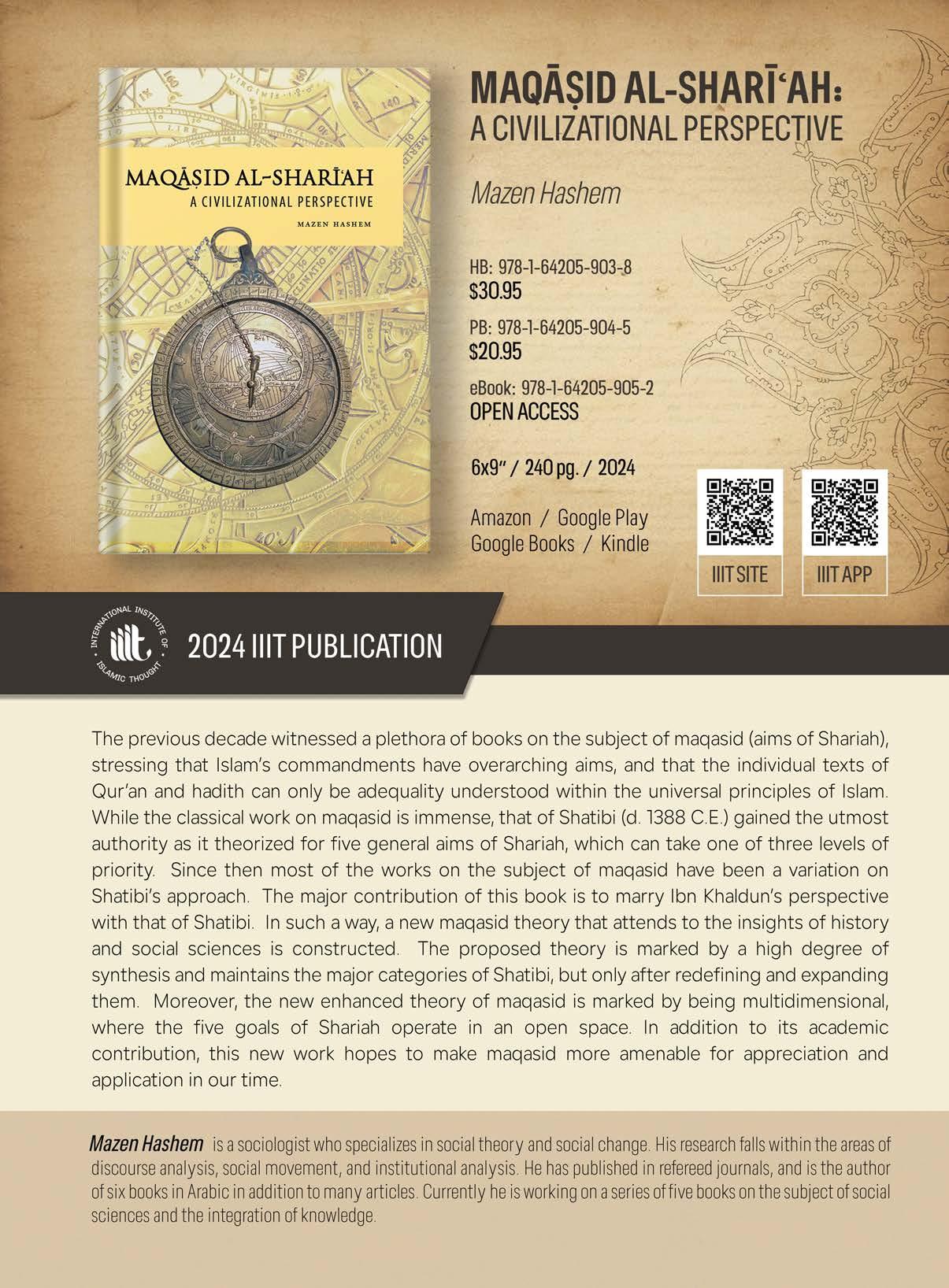
















Many of our readers will be traveling to Dallas to join the thousands of North American conventioneers for ISNA’s 61st Convention: “The Muslim American: Forging Faith and Action.”
Iqbal Unus (board chair, Islamic Horizons), a long-time convention enthusiast, reflects on how he has both experienced and benefitted from this event over the decades. He advises attendees to ponder on their goals and expectations, for “nothing can be achieved unless we make it a habit and set up a way to schedule it in our routines.” He reminds us, that “you’re not doing it alone. That’s where the convention experience comes into your plan again.”
While we are at the Convention, the Genocide continues due to the money siphoned off from our taxes. According to Julia Conley, “a poll found that 67% of Americans of all political affiliations want the United States to join the international call for a permanent cease-fire (www.commondreams.org, Feb. 27).
Democracy at work!
The usual hypocrisy rages as the meaningless words and phrases fill the airwaves, despite American’s disdain at the Biden administration’s seeming indifference to “the only democracy in the Middle East’s” nonstop slaughter of the innocent with American-made artillery. But only one side is “militant,” as usual.
This being an election year, American politicians fueled by lobbying funds (a misnomer for bribes) not only maintain a deathly silence, but actually seem to hope that the “chosen people” will be able to inflict the Last Days on all of Palestine. Come November, Americans will again be asked for to vote for the “lesser evil,” after hearing again and again the thoroughly discredited assertion that “this is the most important election in American history,” as if doing so will humanize genocide, reclassify it as “a normal part of life.”
Let us Americans, irrespective of creed, be human. Let us consider humanity before we cast our votes. Indeed, the Genocide needs a cover up. The British implantation in Occupied Palestine is de facto — a Western military base to advance their interests. In 1986, then Sen. Biden (D-Del.) proclaimed, “Were there not an Israel, the United States of America would have to invent an Israel to protect her interests [emphasis added] in the region.”
More recently, the House of Representatives passed Rep. Jared Moskowitz’s (D-Fla.) amendment to H.R. 8771 H. Amdt.1052, which prohibits the State Department from citing statistics obtained from Gaza’s health officials. Such realities are hardly isolated.
U.S., NATO, corporate, and governments’ media outlets continue their active collaboration. For example, Muhammed Bhar, a Gazan with Down syndrome, was attacked by an IDF dog and left to die; the BBC headline (July 16) for that atrocity stated, “The lonely death of Gaza man with Down syndrome” — a great job of whitewashing! Bhar had relied on family members to help him eat and drink. His family had to evacuate 15 times when the IDF entered Gaza City during late June. As we all know, thanks to on-the-ground social media reports, there have been constant similar deliberate tragedies. We should never forget that, according to various organizations, never have so many journalists been killed for piercing the propaganda wall raised by so many to keep the truth hidden.
Former ISNA-Canada vice presidents Syed Imtiaz Ahmed and Kathy Bullock donated their valuable time to inspire several writers in Canada to offer us a look into how that nation’s Muslims are dealing with their own challenges. Let’s learn and be inspired by each other to serve Islam, Muslims, and our neighbors. ih

PUBLISHER
The Islamic Society of North America (ISNA)
PRESIDENT Safaa Zarzour
EXECUTIVE DIRECTOR
Basharat Saleem
EDITOR
Omer Bin Abdullah
ASSISTANT EDITOR Kiran Ansari
EDITORIAL ADVISORY BOARD
Iqbal Unus, Chair: M. Ahmadullah Siddiqi, Saba Ali
ISLAMIC HORIZONS
is a bimonthly publication of the Islamic Society of North America (ISNA) P.O. Box 38 Plainfield, IN 46168‑0038
Copyright © 2024 All rights reserved
Reproduction, in whole or in part, of this material in mechanical or electronic form without written permission is strictly prohibited. Islamic Horizons magazine is available electronically on ProQuest’s Ethnic NewsWatch, Questia.com LexisNexis, and EBSCO Discovery Service, and is indexed by Readers’ Guide to Periodical Literature.
Please see your librarian for access. The name “Islamic Horizons” is protected through trademark registration ISSN 8756‑2367
POSTMASTER
Send address changes to Islamic Horizons, P.O. Box 38 Plainfield, IN 46168‑0038
SUBSCRIPTIONS
Annual, domestic – $24
Canada – US$30 Overseas airmail – US$60
TO SUBSCRIBE
Contact Islamic Horizons at https://isna.net/SubscribeToIH.html On line: https://islamichorizons.net For inquiries: membership@isna.net
ADVERTISING
For rates contact Islamic Horizons at (703) 742‑8108, E mail horizons@isna.net, www.isna.net
CORRESPONDENCE
Send all correspondence and/or Letters to the Editor at: Islamic Horizons P.O. Box 38 Plainfield, IN 46168‑0038
Email: horizons@isna.net
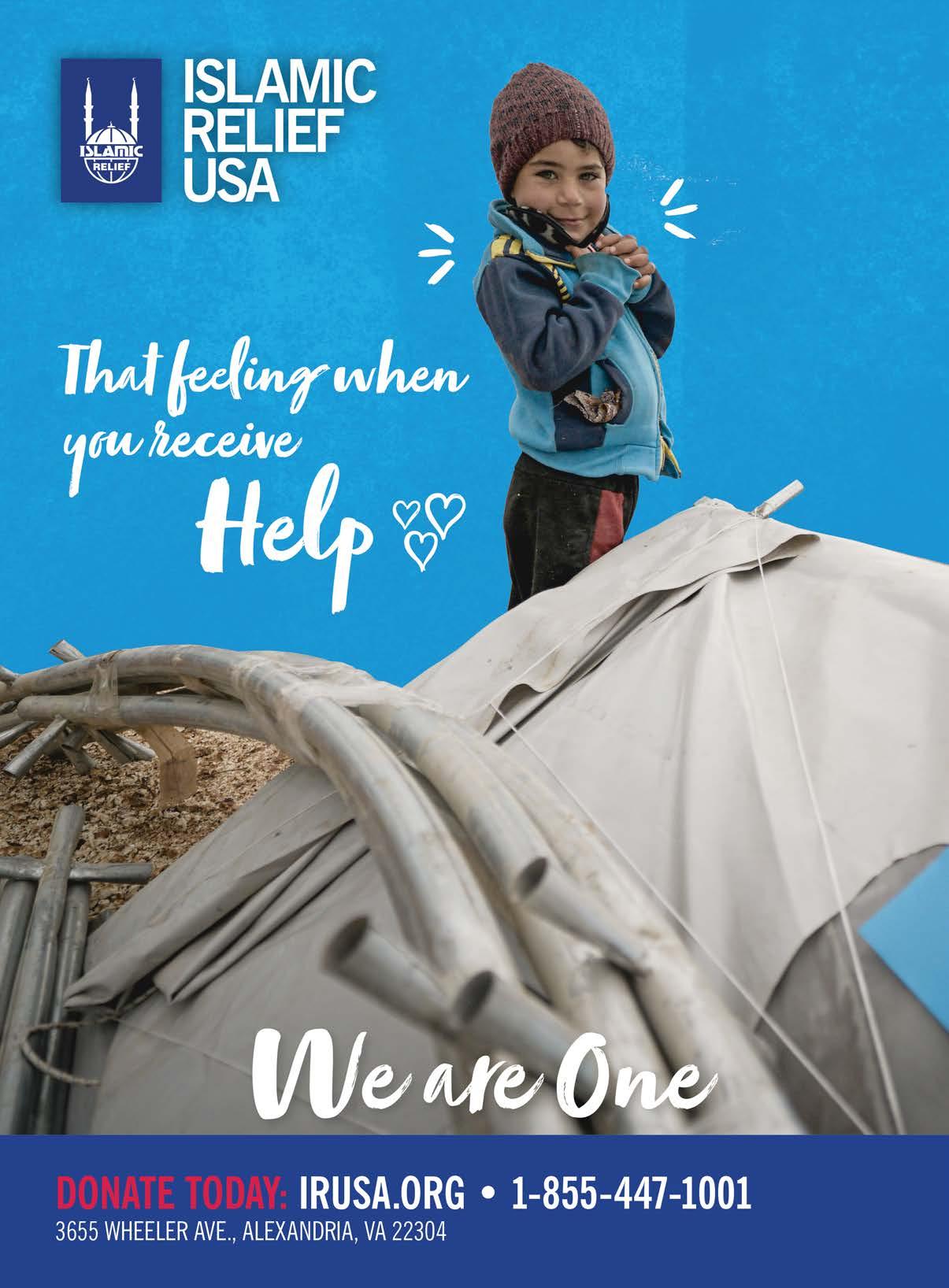
BY IQBAL UNUS

Thank you for attending ISNA’s 61st Annual Convention. It wouldn’t be a convention without you. But all good things must come to an end, and so does a convention.
If you are a frequent or an occasional attendee, you must surely wonder “What now?” You may have listened to several distinguished speakers and experts, asked questions, and analyzed their responses. You may have roamed the hallways connecting with old friends and making new ones or meandered the bazaar’s alleys wondering about all that it offered in stimulation, opportunities to get involved, and, yes, bargains. At the end of it all, when you got into your car to drive back or struggled through an airport security line, you must have wondered what’s next.
Let’s help you with that. Wonder no more.
First, ask yourself how do I go from the motivation, knowledge, and experience I have gained to action that might enhance my personal development and desire to benefit others?
The first step in this regard actually precedes the question itself. Ask yourself what your goals and expectations were for being at the convention. Remember that you may have fine-tuned or even changed your goals as you savored new experiences and new inspiration. That’s alright. You didn’t start with a blank slate, but used your eraser and chalk to keep yourself tuned to what this convention meant as you went along.
Don’t be too hard on yourself. You experienced the convention attentively and
Now that you have time to reflect on goals you’ve identified as worthy of your effort and commitment, fine tune them so they become specific and achievable. Have you heard about how to eat an elephant? One bite at a time, of course. Break your goals down to smaller “chewable” bites that you can accomplish. Setting goals is great; achieving them is what matters.
was to understand, refine, and remember what the session was about. When possible, you connected with speakers.
And yes, you didn’t sidestep social opportunities around a lunch table perhaps or just while walking around. You were surprised at what you learned in a relaxed setting. It was a good opportunity for human connection as opposed to a screen.
Now that you have time to reflect on goals you’ve identified as worthy of your effort and commitment, fine tune them so they become specific and achievable. Have you heard about how to eat an elephant? One bite at a time, of course. Break your goals down to smaller “chewable” bites that you can accomplish. Setting goals is great; achieving them is what matters.
You know that nothing can be achieved unless we make it a habit and set up a way to schedule it in our routines. That wouldn’t be of much use, unless we also track how we are progressing toward achievement. Celebrate each significant success on the way.
But wait a moment. You’re not doing it alone. That’s where the convention experience comes into your plan again. Remember the sessions you attended, people you met who showed a similar interest, and shared your passion for making a change. Connect with them. Exchange information and aspirations. Identify those who could mentor you or whom you could mentor. Above all, pass on what you learned to those who could not attend. Share your inspiration and aspiration with them. Seek to grow your circle of associates in driving toward the goals you set for yourself during and after the convention.
Remember old friends you met at the convention and the new ones you made, whom you promised to stay in touch with. You had a good time socializing with them then; now stay connected to strengthen your friendships.
recorded your experiences when you could, positive or otherwise. You stayed focused. When there were options, you choose a session thoughtfully. You took notes when you could, asked questions when permitted, and discussed with others after the session about what you had heard. Your objective
Let all this be between ISNA and you working together. Let’s hold hands and move forward in service to our community and the community at large around us, with no higher motive than to seek the pleasure of God. In the process, let this convention be a vehicle to enhance our own capacity to serve and our own desire to advance each day in service to others.
Remember Ali Ibn Abi Talib’s (radiya ’llāhu ‘anhu) advice: “One whose two days are equal is at a loss.” ih
Iqbal Unus is an ISNA Convention enthusiast.
BY MONA ISLAM
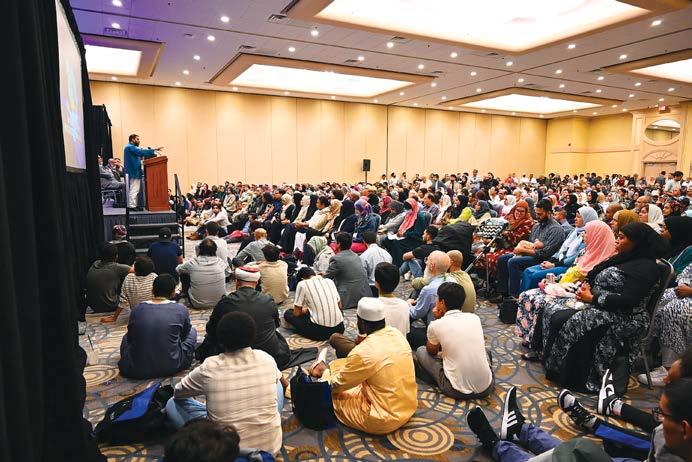
Ican speak for the generation that grew up in the 80s and 90s, whose par-
ents were immigrants from the East.
Most of us went to public schools while our parents settled down, got us educated, and often scrambled to convince us of our Islamic identity, faith, and practice. Some gave up upon arrival; others strove to pass them down via gatherings, books, clubs, and learning relevant languages.
Our parents would struggle to form a sense of community and meet other Muslims they would not normally meet, all to preserve their faith in a clearly very attractive un-Islamic environment. These realities motivated them to build community centers, mosques, organizations, and Islamic schools, as well as to increase their own Islamic knowledge and teach it to their children. Falling in love with their deen, they dropped their cultural baggage and planted the seeds of taqwa (God consciousness) within themselves and their children.
We, their children, were often the only Muslims at our public schools. As minorities, we struggled to deal with the generational cultural gap, our parents’ academic
expectations, and to hold onto our basic Islamic identity, faith, and practice. Among our dilemmas were Islamic attire, gender relations, intercultural marriage, and finding non-interest-bearing loans for major life purchases.
We witnessed ethnocentric gaps in our mosques when Arabs and Pakistanis didn’t see eye to eye, women had no voice on any board, and youth were viewed as sources of anxiety to their parents. We watched our mosques and schools struggle to lay the groundwork, pay the bills and hire qualified and competent personnel. We witnessed everything from mosque politics to racial discrimination.
Finally, after years of dedication and effort, our communities started getting it right. Mosque spaces became more inclusive, fair and welcoming, treating both converts and indigenous Muslims with equal respect. Women gained a voice and position in traditionally male dominated religious spaces, and youth work was seen as valid and worthwhile. During the next phase, we saw more integration with mainstream society due to their increasing awareness of our civic
responsibilities and understanding of how government and politics affect us.
The 9/11 tragedy provided a re-entrance for Muslims into the American landscape. “Mosque Open Houses” sprang up across the country. Da‘wah and outreach were at an all-time high. News of conversions and removal of barriers with non-Muslims filled the air.
As our generation embraced parenthood in the early 2000s, there was a notable rise in the demand for full-time Islamic education. This transition compelled us to reaffirm our commitment to nurturing faith and Islamic values in our own offspring. Concurrently, initiatives to foster creativity saw the emergence of vibrant youth groups, media platforms, and Islamic schools among them.
Recognizing the significance of preserving our predecessors’ institutions made us acutely aware of the pressing need for Islamic schools and community centers. As our population expanded and the era of social media dawned, we encountered unforeseen challenges, such as religious and ethical dilemmas stemming from social media and advancing technology. We had new terrain to navigate.
Despite electing the first African American president and the Black Lives Matter movement, widespread discussions about racial injustice and police brutality continued, beckoning Muslims to take an ethical stand. COVID-19 abruptly displaced us from our once-familiar seats, reshaping the landscape of our lives in unexpected ways.
As we strengthened our faith, our separation from congregational activities to youth group activities and Islamic conventions and camps, forced us to find new ways to fill the void of community support. We rediscovered ways of learning, connecting, and experiencing our deen. Our determination to preserve what we could forced us to design online conventions, seminars, and classes. Online opportunities enabled teachers, students, and peers to meet those whom otherwise we would never have met. When social distancing finally left us, we resumed our activities with newfound appreciation, only to be tested once again with global tragedies that tested what we are made of.
As Muslim Americans move forward, our greatest anchor lies in the timeless guidance of the Quran and Sunnah. The greatest lesson the past few decades have reminded us of
the depth and relevance of Islam’s truth. The more questions fill the air, the answer is always the same: Go back to the deen, the authentic sources, and the examples of the Messengers, and you will never go wrong.
Among the many things to consider in this regard are the following.
Believing in the two authentic sources “We hear and we obey. [We seek] Your forgiveness, our Lord, and to You is the [final] destination” (2:285). As a child, I recall the
However, today these once-vibrant relationships have dwindled into mere shadows of their former selves, replaced by a noticeable distance and sense of estrangement. The younger generation has noticed this, for they bear the brunt of its impact and yearn for the connection and guidance that family should provide. The resulting void in their lives deprives them of invaluable guidance and support and, in addition, impacts their sense of identity and belonging.
The greatest lesson the past few decades have reminded us of the depth and relevance of Islam’s truth. The more questions fill the air, the answer is always the same: Go back to the deen, the authentic sources, and the examples of the Messengers, and you will never go wrong.
deep reverence our parents’ generation held for them. However, this adherence, especially to the Sunnah, seems to have waned over time, particularly among my generation. It’s disheartening to see how worldly pursuits have led to their neglect of the Sunnah’s guidance. This is a major dilemma for our community.
Have they perhaps forgotten the repeated statement that “There has certainly been for you in the Messenger of God an excellent pattern for anyone whose hope is in Allah and the Last Day and [who] remembers God often” (33:21)? We must strive to rekindle our reverence for the Quran and Sunnah so we can navigate the complexities of contemporary life with confidence and guidance. Failing to do so puts our faith and identity at risk, which could cause us to lose our spiritual foundation.
Reviving Islamic etiquette in family dynamics. One of our greatest losses exists in our family values and family roles: The once tight-knit fabric of familial relationships has unraveled. During my upbringing, these bonds of trust ran deep and were nurtured with care. Mentorship flourished, fostering a sense of belonging and security that shaped our identities. Reflecting on the past, I remember when extended family couches were familiar sanctuaries for after-school naps, and their kitchens extended an open invitation.
Engaging ethically with the world. We need to strike a balance between preserving and strengthening our identity while striving to establish justice and make meaningful contributions to mainstream society. Reflecting on the experiences of previous generations, we find that neither extreme isolation nor complete assimilation are recommended solutions.
To cultivate and rejuvenate our roots, we have to educate ourselves and our children. By deeply understanding our faith, its teachings, and its rich history, we can foster a sense of pride and belonging. We must continue to build strong communities to support ourselves and reinforce a shared identity. Engaging with mainstream society through interfaith dialogues, community service, and professional collaborations enables us to share our values and perspectives while enriching our own experiences. Another remedy is balancing modernity and tradition. Harmonizing traditional values with modern realities ensures that our faith remains relevant and dynamic.
We’re inspired by the example of Prophet Muhammad (salla Allahu ‘alayhi wa sallam), whose commitment to ethical conduct and the pursuit of justice uplifted the darkest corners of society. We can emulate him in this regard by advocating for the marginalized and justice, opposing discrimination and
oppression, addressing systemic inequalities, and ensuring that everyone is treated with dignity and respect. We must also strive to emulate the Prophet’s leadership style, which was characterized by humility, selflessness, and a genuine concern for his community’s well-being.
As my generation buries our elders and pioneers, the legacy we will leave for our children dominates our thoughts. Will they be assets on our scales, or will our deficiencies as parents cause us to face agony on Judgment Day?
On a broader scale, the future demands us to reflect: Are we fulfilling our potential as da‘is and standing for justice and fulfilling the rights of the oppressed? Is our devotion and worship increasing or waning compared to our elders?
Despite these pressing questions, our path forward should be clear: living our lives in a way that pleases God. This includes seeking and acquiring authentic knowledge, worshipping Him sincerely, following the Sunnah, reviving and strengthening our family relationships, and engaging with our communities as ethical and just contributors.
Moreover, it’s our duty to leave behind a generation that will carry Islam’s vision forward and make this world a better place. By doing so, we can ensure that our legacy is one of faith, justice, and positive contribution, thereby fulfilling our responsibilities to both our Creator and our fellow human beings. ih
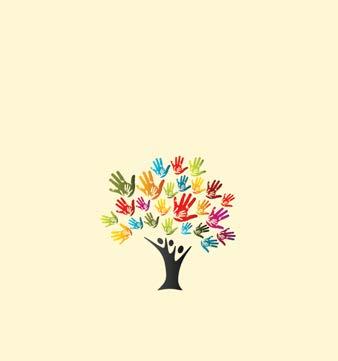
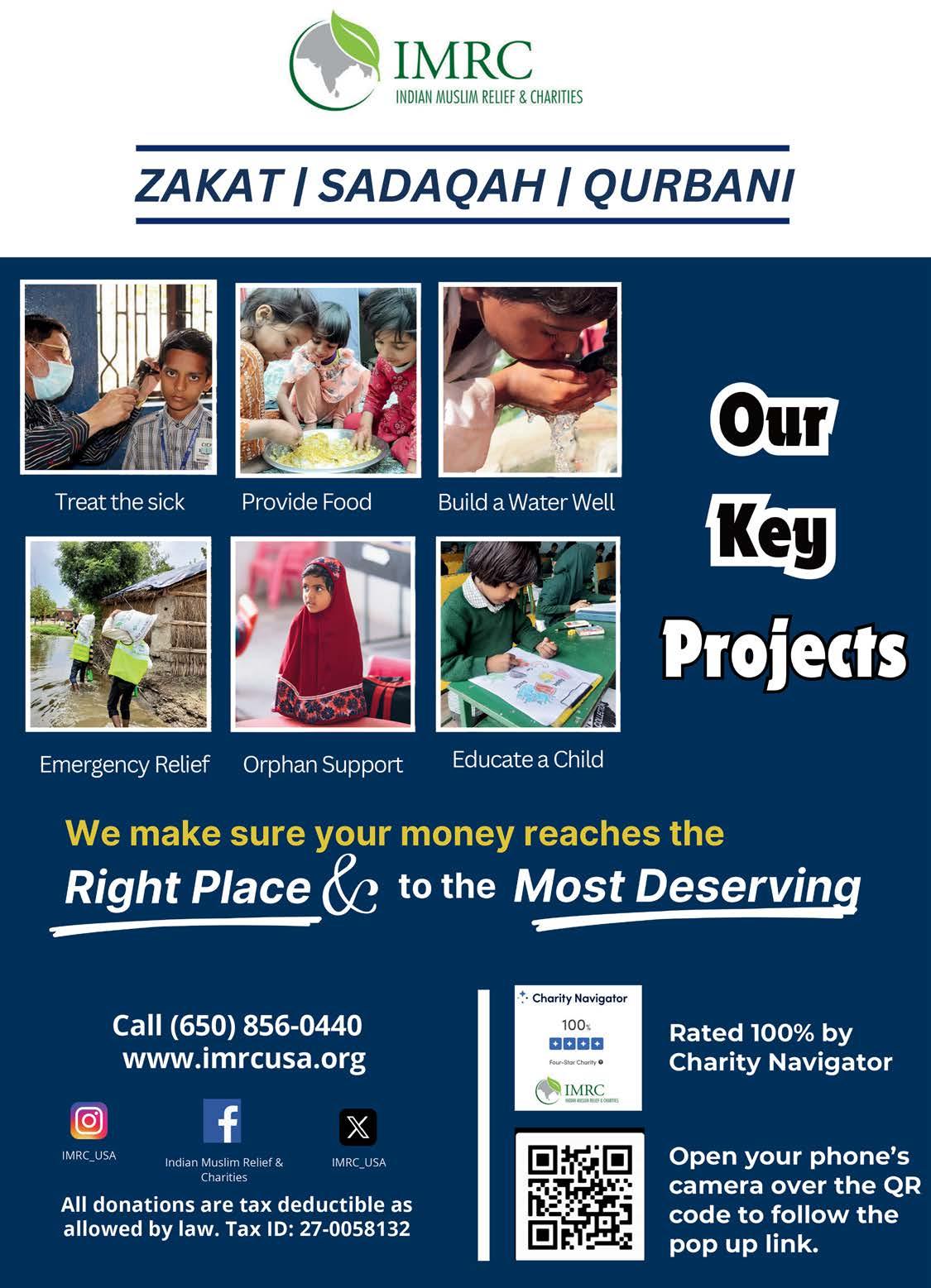
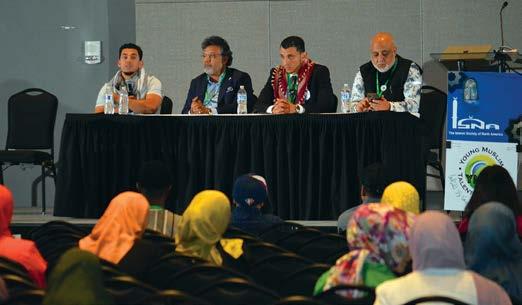
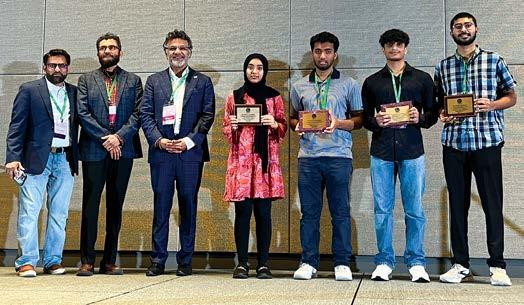
BY CRYSTAL HABIB
On July 13-14, in collaboration with YMTA (Young Muslim Talent of America), ISNA hosted an inspiring regional conference in Duluth, Ga.
Around 400 attendees and dozens of vendors and sponsors made the venue buzz with excitement. The event’s sponsors, Islamic Relief USA and The Zakat Foundation, added a touch of generosity and community spirit.
Session topics included “Transformative Personal Change,” “Cultivating Love and Tranquility in the Family,” “Empowerment through Education,” “Prioritizing Personal Health and Mental Well-being,” “Being a Prophetic Voice: Mercy as a Tool for Uniting Communities,” and “Standing in Solidarity with the Victims of Gaza and Palestine.”
“Marriage is half of our deen, but what does that mean to us?” asked Shaykh Saad Tasleem (instructor, Al Maghrib), in the session on cultivating love and tranquility in the family. “There is so much more that needs to go into this relationship. A marriage that is established for the sake of Allah is a gift from Allah. Our Creator gifts this relationship with love, affection, and mercy. And that needs to be maintained,

that needs to be nurtured, and that needs to grow,” he added.
A parallel session on “Islamic Finance Halal Money Master: Empowering Your Wealth Ethically” was addressed by Islamic finance speakers, among them Hud Williams
(AMANA Mutual Fund) and attorney Bukhari R. Nuriddin. Youth parallel sessions included topics about the foundations of faith, personal transformation, dealing with doubts, and the power of du‘a
In a session about education in the AI age, Nabile Safdar (division director, Imaging Informatics) stated that “It is a necessity for us to be dealing with the media and this degree of information. There is a risk with new tools like AI, but it is about the decisions we make as individuals about how we interact with these tools because they can be good and bad depending on how we use them.”
The Community Service Recognition Award ceremony concluded Saturday evening by recognizing award recipients Raheem Shah and Zareenah Naushad. Shah, an international philanthropist, has been recognized by the Georgia senate. He is the founder of Voices of Muslims, the Georgia Pakistan Council, and other organizations.
In addition to excelling in robotics and AI, high school honors graduate, Zareenah Naushad founded Autistry Studio and has partnered with major universities. She completed Georgia Tech’s computing research program, serves as a WIT ambassador, and interns at Innova Solutions.
Shaykh Saad Tasleem delivered a powerful keynote address. As the event ended, a heartwarming concluding session honored the dedicated volunteers and organizers who made it all possible. The young stars of the Children’s Program received well-deserved awards for their outstanding accomplishments. On display during this session was a beautiful diorama created by the children showcasing their creativity and talent. ih
BY ALAA ABDELDAIEM
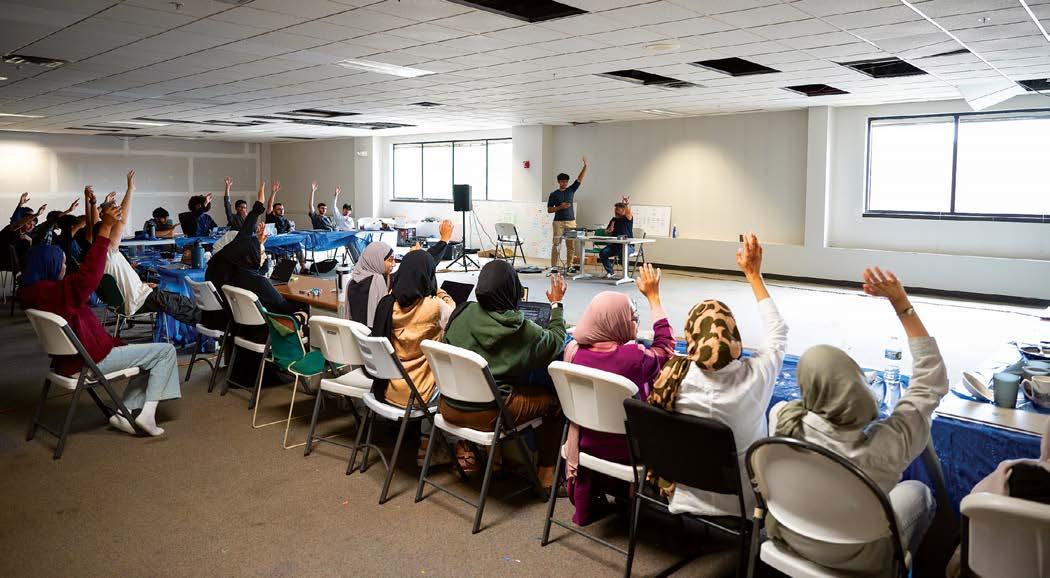
Every summer since 2014, a remarkable event unfolds that shapes the future of Muslim leadership across the U.S: The Muslim Youth of North America’s (MYNA) Annual Summer Leadership Summit (SLS). This July, the highly anticipated event gathered around 60 youth from across the country, each poised to take on significant roles as executive committee and regional executive committee officers. The summit is a transformative experience, combining technical training, spiritual development, professional growth, and interactive workshops to prepare these young leaders for their upcoming responsibilities.
The SLS cornerstone, its comprehensive technical training program, provides in-depth instruction on the practical aspects of leadership roles within MYNA. From learning how to effectively manage meetings, organize events, and follow various policies and procedures to mastering software like Google Suite, Notion, and more, participants
are equipped with the essential tools they need to excel in their positions. Youth are also trained on the inner workings of fundraising, cold calling, marketing, outreach, project management, and similar activities.
Recognizing that effective leadership in our community is deeply rooted in spiritual strength, the summit stresses spiritual development. Participants engage in sessions that deepen their understanding of Islamic principles and practices, Quranic studies, reflections on the Prophet’s (salla Allahu ‘alayhi wa sallam) life, and discussions on how to incorporate Islamic values into their leadership styles — activities designed to foster a stronger connection with their faith. Youth are joined by scholars and teachers such as Mufti Abdulwahab Waheed (co-founder, Miftaah Institute), Sh. Abdullah Waheed (director, Islamic Affairs at Flint [Mich.] Islamic Center), Ustadha Hazel Gomez (board member, Rabata), Ustadh
Ammar Alquoqa, Dr. Jawad Shah, and others. The event prepares youth leaders to lead with integrity and purpose by nurturing their spiritual well-being.
“The environment was incredibly supportive and inclusive, making it easy to connect with everyone and share ideas, aid Farah H. “I left SLS feeling empowered, equipped with new skills, and ready to implement what I learned in my upcoming term as vice president. This summer has truly ignited a passion in me to lead with purpose and compassion. I am grateful for this unforgettable experience and look forward to continuing my journey as a leader.”
The summit also offers a robust professional development program designed to enhance participants’ skills in areas that are crucial for their future careers and personal growth. Workshops on public speaking, time management, teamwork, and strategic planning provide invaluable insights and practical knowledge. Guest speakers from various professions share their experiences and offer
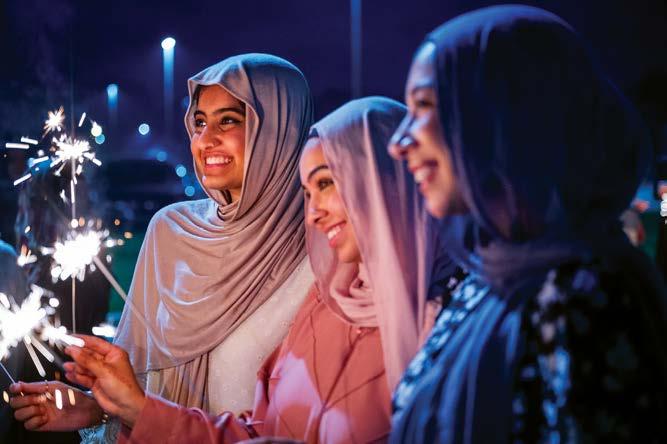
As they step into their roles as MYNA executive committee and regional executive committee officers, these young leaders are well-prepared to lead initiatives, inspire their peers, and drive positive change.
guidance, thereby inspiring the youth to aspire to excellence in all aspects of their lives.
One of the SLS’ most dynamic aspects is its engaging, hands-on, and collaborative workshops. These interactive sessions inspire participants to actively contribute and learn from one another. Workshops cover a wide range of topics, among them how to give and receive feedback, manage different personalities on a team, utilize creativity, and develop a unique vision.
Fun challenges such as an obstacle course and an Islamic scavenger hunt also encourage youth to work as a team in the spirit of fun and learning. Through group activities, role-playing, and brainstorming sessions, participants develop creative solutions to real-world challenges and build strong bonds with their peers.
Beyond these training and development sessions, the summit also provides an invaluable opportunity for youth to connect and form lasting friendships. These relationships create a supportive network of like-minded individuals who share a common vision of our community’s
future. By fostering these connections, the summit helps to build a united and resilient generation of leaders who will continue to support and inspire each other long after the event has concluded.
“SLS was a perfect balance of spiritual rejuvenation, skill building, and team bonding,” said Mahmoud E. “These lessons not only enriched my knowledge, but also instilled a sense of pride and motivation to emulate the strength and dedication of the leaders that came before us in our everyday life and work.”
The impact of MYNA’s SLS extends far beyond the event’s duration. The skills, knowledge, and relationships gained empower participants to make meaningful contributions to their communities and beyond. As they step into their roles as MYNA executive committee and regional executive committee officers, these young leaders are well-prepared to lead initiatives, inspire their peers, and drive positive change. In short, they are ready to have a lasting impact on their communities and the world. ih
Alaa
Abdeldaiem is the MYNA manager in ISNA’s Youth Development Department.

The Islamic Seminary of America (TISA) held its inaugural commencement ceremony in Richardson, Texas, on June 1. Three students each from the classes of 2023 and 2024 were awarded master’s degrees.
Those associated with TISA and guests from all over North America attended the event. Keynote speaker Izzeldin Abuelaish MD, MPH, spoke of hope, courage, and being rooted in one’s identity. Abuelaish is a distinguished Palestinian medical doctor and University of Toronto professor born and raised in Gaza‘s Jabalia Refugee Camp. His unwavering commitment to fostering peace between Palestinians and Israelis through utilizing health as a catalyst exemplifies the transformative power of hope and familial bonds. Renowned for his award-winning memoir, “I Shall Not Hate: A Gaza Doctor’s Journey,” Abuelaish’s life story was recently brought to the screen, captivating audiences worldwide.
Sh. Yasir Qadhi (dean of academic affairs, TISA) remarked, “This commencement signifies a pivotal moment in TISA’s mission to nurture a cohort of distinguished leaders who embody Islamic values while tackling contemporary issues head-on. Ultimately, our goal is to make the world a better place for all people.”
On June 26, President Biden announced his intention to appoint Mohamed Elsanousi as commissioner of the nine-member United States Commission on International Religious Freedom (USCIRF).
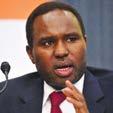
Elsanousi (J.D., University of Indiana-Bloomington) is currently executive director of the Network for Religious and Traditional Peacemakers, a global network that bridges grassroots peacemakers and global players to work toward sustainable peace. He previously served as the director of ISNA’s Community Outreach and Interfaith Relations.
The USCIRF, an independent, bipartisan federal government agency created by the 1998 International Religious Freedom Act (IRFA), monitors the universal right to freedom of religion or belief abroad; makes policy recommendations to the president, secretary of state, and Congress; and tracks their implementation.
USCIRF commissioners are appointed by either the president or Congressional
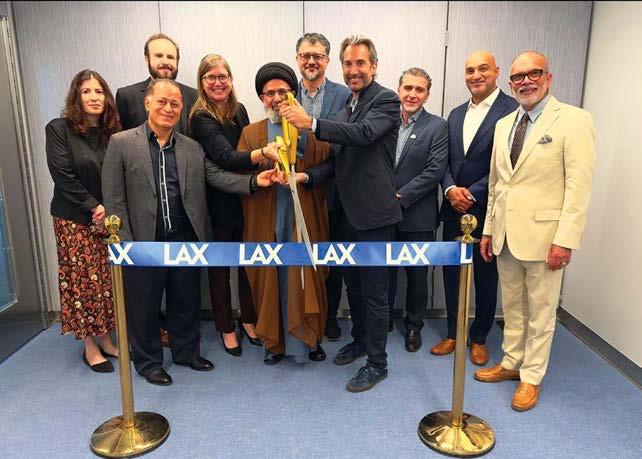
The Los Angeles International AIRPORT’S (LAX) multifaith prayer room at the Tom Bradley Terminal, close to Gate 130, was inaugurated on June 5. This is the outcome of four years of community effort, beginning in August 2020, to get the airport to allocate space for a prayer room in the international terminal. This endeavor’s vision began in early 2018, with lobbying Mayor Eric Michael Garcetti (2013-22), ambassador to India since May 2023. ih
leaders of each political party, supported by a non-partisan professional staff. While USCIRF is independent of the State Department, the ambassador-at-large for International Religious Freedom is a non-voting member.
Georgia State Senator Sheikh M. Rahman (D) was the 2024 commencement speaker at the Washington University of Science & Technology.

Rahman (BA ‘95, University of Georgia), elected in 2018, was the first immigrant, Bangladeshi-American, Asian-American, and Muslim elected to the Georgia Senate. A strong advocate for public education, he received the Rising Environmental Leader Award from the National Council of Environmental Legislators and was named one of Atlanta’s 500 Most Powerful Leaders. He now serves on the Democratic National Executive Committee, the first Muslim American to be elected to that role.
Crofton (Md.) High School student
Hafsa Hamdaoui was sworn in as the 51st student member of the Anne Arundel County Public Schools’ Board of Education on July 1. The first student from her school to hold this position, her platform is centered
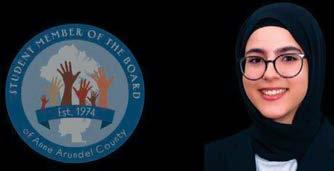
on promoting equity and mental health.
Her leadership includes roles in the Maryland Civic Education Coalition, the Mock Trial Team, and the International Night Club, where she raised over $4,200 for children’s causes. This year, she served as vice president of Crofton’s Model UN club.
“This achievement is a victory for Hafsa and a source of pride for all diverse communities,” said Zainab Chaudry (director, CAIR-Maryland). “CAIR congratulates her on this milestone and wishes her well in her new role. We look forward to supporting her and seeing what she accomplishes in the school year ahead.”
“I am proud of Sister Hafsa Hamdaoui and thank the students who responded to our request to vote for her,” said Col. Rudwan Abu-rumman (president, Anne Arundel County Muslim Council). “Student members of the board have the right to vote on all issues that come up for consideration, and I encourage our high school students to participate in these races every year.” ih
I found the article The Myth of 786 (IH May/June 2024, pp. 54-55) both interesting and educational. Many of us have been using 786 in place of writing Bismillah ir Rahman ir Raheem for a long time. It is fascinating to note that using the ABJAD numerology system, 786 is also significant for Hare Krishna.
For example: H(ey) + R(e) + Y(e) = 5 + 200 + 10 = 215 K + R(e) + I + Sh + N + A = 20 + 200 + 1 + 300 + 50 + 1 = 571
Combining 215 + 571 = 786
Thank you for sharing such insightful information.
Zafar Iqbal, PhD
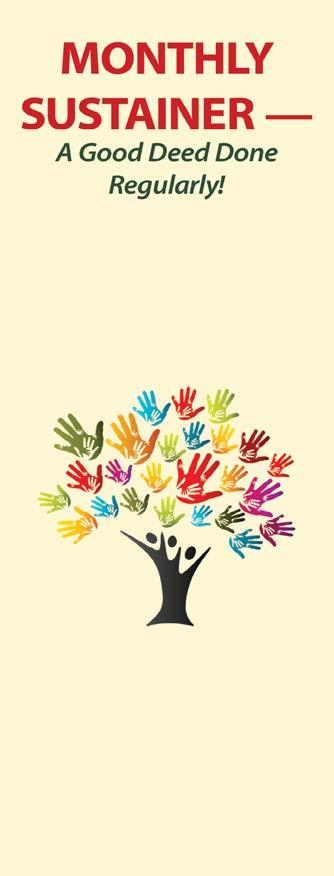
BY UMBERINE ABDULLAH

On-the-ground Palestinian journalists are being martyred, and foreign-based media outlets and social media sources are being cyberattacked, expelled, slandered, and censored.
The Zionist regime routinely asserts that these martyred journalists are related to Hamas or other Muslim organizations. It alleges that “approximately 30% worked for media outlets affiliated with or closely tied to Hamas” (The Guardian, June 25).
According to Niqnaq, “The Guardian published an investigation showing that some in the Israeli army view journalists as legitimate targets in war, though doing so is a violation of international law” … The Guardian added that Israeli officials have repeatedly characterized journalists killed in the war as ‘terrorists.’ … A senior Israeli military source told The Guardian, ‘I’m sure that if you count the number of dead teachers, the number of dead janitors, the number of dead taxi drivers, you will end up with higher numbers as well’” (https://niqnaq. wordpress.com, July 6).
Working with the Jordan-based nonprofit Arab Reporters for Investigative Journalism (ARIJ, https://en.arij.net), the Guardian identified at least 23 individuals killed since Oct. 7 who worked for the largest Hamas-run outlet in Gaza, the al-Aqsa media network. Considered to be the movement’s official channel, it employed hundreds of people
and operated a widely watched TV channel and numerous radio stations until the war curtailed its output.
In 2018, the IDF bombed al-Aqsa’s offices, claiming that its building was used for military purposes. The following year, Prime Minister Netanyahu, who is also defense minister, used broad legal powers to designate Al-Aqsa a “terrorist organization.”
“Asked about the al-Aqsa network casualties, a senior IDF spokesperson told reporters in the Gaza project consortium that there was ‘no difference’ between working for the media outlet and belonging to Hamas’s armed wing, a sweeping statement legal experts described as alarming” (https:// dailystormer.in).
However, a legal expert told The Guardian (June 25) that such designations, which were made in domestic law, is not a license to kill its employees. Under the laws of war, journalists can lose their civilian status if they
Were there not an Israel, the United States of America would have to invent an Israel to protect her interests in the region.” Senator Joe Biden, 1986.
plan, prepare, or carry out combat operations. In other words, simply working for an organization such as al-Aqsa doesn’t make its employees a legitimate target.
“Reporting the news is not direct participation in hostilities,” says Janina Dill (co-director, the Oxford Institute for Ethics, Law, and Armed Conflict). “Even if they reported the news in a biased way, even if they did propaganda for Hamas, even if Israel fundamentally disagrees with how they report the news. That is not enough” (Elvis Dunderhoff, https://dailystormer.in, June 26).
Alain Gresh (director, online journal Orient XXI), wrote in his “Palestine: Un peuple qui ne veut pas mourir” [Palestine: A People Who Refuse to Die] (Les Liens qui Libèrent, 2024)) says “Lastly, unlike in other Western countries, there is strict censorship in Israel — though the general support for the army’s objectives means it’s far from vital. Israeli academic Sebastian Ben Daniel (who also writes under his pseudonym John Brown) has described ‘a parody of journalism’ in which the army is exalted and the IDF spokesperson’s pronouncements [are designed to] convince the public that all is swell [sic].’” (How Israeli journalists carry out PR for the army, Feb.19, www.972mag.com/).
Akiva Novick, a prominent news anchor and correspondent for Israel’s public broadcaster Kan, believes that the role of journalists is to raise the national morale (Haaretz, Jan. 14, 2024). No one wants to hear bad news.
Gresh says that Israel has “an added advantage that other states lack: Western officials and media start from the assumption that Israel tells the truth.”
Daniel Boguslaw (investigative reporter, The Intercept) revealed that the “CNN runs Gaza coverage past the Jerusalem team operating under shadow of IDF censor” (The Intercept, Jan. 4, 2024).
Israel also has the advantage of being a “Western” country, which means that it’s always given the benefit of the doubt. A CNN journalist explained where this bias leads, ‘“War crime’ and ‘genocide’ are taboo words. Israeli bombings in Gaza will be reported as ‘blasts’ attributed to nobody, until the Israeli military weighs in to either accept or deny responsibility. Quotes and information provided by Israeli army and government officials tend to be approved quickly, while those from Palestinians tend to be heavily scrutinized and slowly processed” (Alain
Gresh, “Hasbara: the dark art of spinning a war,” Le Monde Diplomatique, May 2024).
Israel is de facto, a U.S. and Western military base to advance their interests in the region. The then Senator Joe Biden (D-Del.) stated in 1986, “Were there not an Israel, the United States of America would have to invent an Israel to protect her interests in the region.”
Congress also continues to abet Israel’s suppression of the truth. The House of Representatives passed Rep. Jared Moskowitz’s (D-Fla.) amendment to H.R. 8771 H. Amdt.1052, which prohibits the State Department from citing statistics obtained from Gaza’s health officials.
The ARIJ investigation, part of the Gaza Project, involves 50 journalists from 13 organizations and is coordinated by Forbidden Stories (https:// forbiddenstories.org), said, “Attacked in the field, in the office, and at home, 1 in 10 reporters in Gaza have been killed in Israel’s military campaign” (“Israel’s War on Gaza is the Deadliest Conflict on Record for Journalists,” The Intercept, June 25).
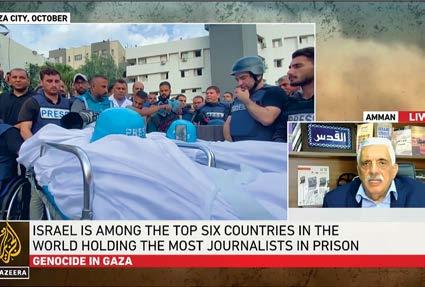
France-Presse photojournalist. “So many journalists have died while sleeping along with their families. When we interviewed the survivors, they told us they were at home. ‘We had dinner and talked to the neighbors. And when we went to sleep they bombed us.’”
After stating that 100+ journalists were killed in the first nine months, the deadliest conflict on record for reporters, they added: “The exact number … is difficult to determine, with several organizations collecting the information differently, but they all agree that the number is record-breaking.” Aljazeera’s report “How deadly is the Israel-Gaza war for journalists?” (Nov. 9, 2023) states, “The Israel-Hamas war has seen more journalists killed in the first month of conflict than any other conflict since the CPJ first started collating statistics for journalists covering conflict in 1992” (“Israel’s War on Gaza is the Deadliest Conflict on Record for Journalists,” June 25, https://theintercept.com).
Hoda Osman (executive director, ARIJ) stated that “Gaza is the deadliest place on Earth for journalists by far. According to the Committee to Protect Journalists, over 100 Palestinian journalists have been killed in Gaza since October. The Palestinian Journalists’ Syndicate puts the figure even higher at 140 journalists and media workers killed since the start of the war. According
Lastly, unlike in other Western countries, there is strict censorship in Israel — though the general support for the army’s objectives means it’s far from vital. Israeli academic Sebastian Ben Daniel (who also writes under his pseudonym John Brown) has described ‘a parody of journalism’ in which the army is exalted and the IDF spokesperson’s pronouncements [are designed to] convince the public that all is swell [sic].’”
to the group, the deaths represent 10% of all journalists in Gaza” (www.democracynow. org, June 27).
An ARIJ survey said that almost all of the 200+ journalists in Gaza said they had been displaced; half said they were living in tents. In addition, 86% said their homes had been either partially or entirely destroyed (“‘The Grey Zone’: How IDF Views Some Journalists In Gaza As Legitimate Targets,” June 25, The Guardian).
In her June 27 podcast, Osman told Amy Goodman, “And by any standard, it’s unprecedented. … Nothing like this had ever happened to journalists before. It’s a crisis not just for Palestinian journalists or Arab journalists, but it should be a crisis for journalists worldwide, the journalists’ community. And to be honest, we weren’t seeing the outcry, the sort of the reaction that this crisis deserves” (www.democracynow.org, June 27).
“It’s psychologically very difficult,” said Mohammed Abed, a Gaza-based Agence
Officially, the Israeli military maintains that journalists aren’t being deliberately targeted. On June 25, The Guardian echoed this assertion. Many in the military attribute the record number to the IDF’s intensive bombardment of a densely populated territory. The Guardian also cited the scale and intensity of the bombardment.
“However, an investigation by the Guardian suggests that amid a loosening of the Israel Defense Force’s interpretation of the laws of war after the deadly Hamas-led attacks on 7 October, some within the IDF appear to have viewed journalists working in Gaza for outlets controlled by or affiliated with Hamas to be legitimate military targets” (https://dailystormer.in).
Carlos Martinez de la Serna (program director, CPJ) said, “Without protection, equipment, international presence, communications, or food and water, they [the journalists] are still doing their crucial jobs to tell the world the truth. Every time a journalist is killed, injured, arrested, or forced to go to exile, we lose fragments of the truth” (June 25, https://cpj.org/).
In 2023, the Committee to Protect Journalists (CPJ) reported that Israel was the sixth-worst jailer of journalists globally.
“The scale is really astounding,” Odeh told VOA from Ramallah, adding that she thinks the goal behind the crackdown is “showing who’s boss.… You don’t really have to do anything to get arrested. There is no protection,” Odeh said. “There’s nothing that will shield you” (Liam Scott, www.voanews.com, Jan. 18).
The official hostility toward those journalists in Gaza and elsewhere who are doing their best to keep us informed, not to mention the many others who have been bought off or become no more than mouthpieces for government propaganda, reveal a depressing truth: We need more journalists who are committed to telling us the truth of what is happening in our increasingly violent and fractured world. ih
BY NABILA HUQ
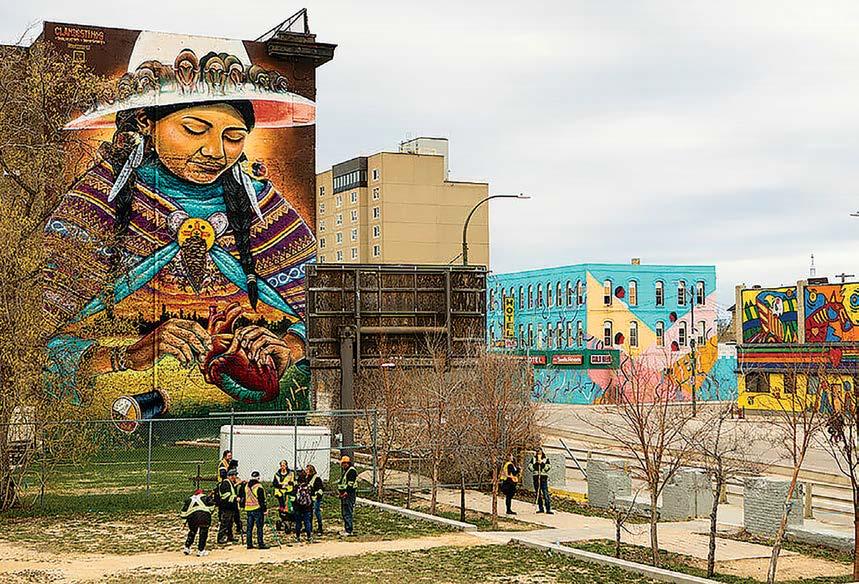
We have long stayed as settlers. It’s time we return to being kin.
Abdullah Hakim Quick, Ph.D., a historian, social activist, and religious leader, writes in “Deeper Roots: Muslims in the Americas and the Caribbean Before Columbus” (Ta-Ha Publishers, 1996) that evidence exists of Indigenous peoples and Muslims interacting long before Columbus arrived. However, historical records of Muslims’ continuous presence in North America are missing.
The record of their continuous presence in Canada begins during the later part of the 19th
century. Many of us may also know that this country’s first recorded Muslims looked like stereotypical settlers (a Scottish revert family). Settler is a loaded word, for it flips between being used as a synonym both for “immigrant” and “colonialist.” Did this family have any intention of being colonialists? We probably don’t have a record of that.
What we do have is the memoir of Canada’s first Muslim politician. Leaving Lebanon to avoid conscription in the Ottoman Army, he changed his birth name — Bedouin Ferran or
their languages, realizing that it was up to him to understand his clients’ language. Despite talking of savage Indians and half-breeds somewhat thoughtlessly, he also recounted the warm hospitality he received and his keen interest in Indigenous governance system.
Unfortunately, Baker ended his memoir without touching upon his life in public office; otherwise, we would learn through his first-hand account what he did for his Indigenousmajority constituents while serving as an elected member of the NWT Council (1964-67; now the Legislative Assembly of the Northwest Territories).
There are more accounts of early 20th-century Muslims who warmly reflected on their relationship with Indigenous peoples.
Ahmad Ali Ferran — to Peter Baker. In his book, “Memoirs of an Arctic Arab: A Free Trader in the Canadian North: The Years 1907-1927” (Yellowknife Pub. Co., 1976) he detailed his building mainly business relationships with Indigenous peoples. But if we pause to think about contemporary Muslims’ positionality about Indigenous peoples in the 21st century, we see that Muslim immigrants learned English and/or French, or are studiously learning one of the official languages, and gave little thought to communicating with Indigenous peoples, whereas Baker mastered a conversational ability in several of
Hilwi Jomha Hamdon, whose husband ran a store in Fort Chipewyan, recounted a hilarious experience to Murray Hogben when her husband decided to invite an Indigenous chief for dinner. The chief had initially declined the offer because he’d assumed her to be “pretty cranky” because of her “narrow eyebrows, and that means among the Indians that you’re not good natured” (“Minarets on the Horizon: Muslim Pioneers in Canada,” Mawenzi House, 2021).
After her husband assured him that this wasn’t the case, he accepted the invitation. This story proves that we can openly discuss negative stereotypes and learn about one another if we keep an open mind. Like Baker, the Hamdon family learned the language of their Indigenous clients and neighbors, and a spontaneous friendship developed among them. The two groups showed no awareness of a latent settler-colonial relationship. This friendship bears no indication of a power relation on either side.
Such a reciprocal loving relation is also evident in Arab-born Canadian artist Jamelie Hassan’s account of her family’s relation with the neighboring Oneida community. Hassan remembers that while growing up in S outhern Ontario during the 1950s, her father would take the family on Sunday drives to Oneida settlements and how its farmers would present them with handmade gifts and produce.
and Indigenous peoples. Once identifying with each other as co-colonized by the same colonial powers, diasporic groups can now affiliate themselves with independent nation-states and begin a post-colonial journey, whereas a post-colonial era still has not arrived for Indigenous peoples.
However, this hypothetical remark doesn’t imply that diasporic and Indigenous groups were on equal terms prior to the
Ojibwe Anishinaabe writer Patty Krawec tells
are going to stop being a settler and start being kin, that’s where we start. With what you do.”
She states in Ashok Mathur (ed.) et al.’s “Cultivating Canada” that “earlier Arab travelers, at the time of their arrival to Canada in the late nineteenth and early twentieth centuries, did not represent the powers of the British Crown. In fact, these travelers were fleeing from military occupations and the threat of war. Their own histories were likewise shaped by losses due to colonialism” (Jameli Hassan and Miriam Jordan, in “Cultivating Canada: Reconciliation through the Lens of Cultural Diversity” [Aboriginal Healing Foundation, 2011], p.140).
Ironically, a discourse of immigrants’ complicity in settler colonialism has emerged during this supposedly post-colonial era. Maybe a colonial paradigm shift on the world stage shifted the paradigm between this country’s diasporic immigrant groups
distributing flags and scarves to organizers of the Six Nations reclamation in 2006, along with bringing in food and reinforcements (Mike Krebs and Dana M. Olwan. “‘From Jerusalem to the Grand River, Our Struggles Are One’: Challenging Canadian and Israeli Settler Colonialism,” settler colonial studies 2.2 [2012]).
onset of this supposed post-colonial phase. Racialized immigrants have almost always been given preferential treatment over Indigenous populations. Exceptions exist, such as the treatment of Japanese Canadians during WWII.
Muslims need to focus on what their relationship is with Indigenous peoples now. They need to reclaim the relationships established by Baker, the Hamdons and the Hassans, especially now when Muslims stand united in solidarity for Palestinians.
Palestinians and Indigenous peoples have built a legacy of solidarity at least since the 1970s (“Solidarity Between Palestinian and Indigenous Activists Has Deep Roots,” The Palestinian Chronicle, Feb. 18, 2020.) Examples are Mohawk flags at Palestinian demonstrations and Palestinian flags on Six Nations land, the Niagara Palestinian Association (NPA)
One of the most recent examples of such solidarity comes from early Nov. 13, 2023, when The Bearhead Sisters from Paul First Nation carried keffiyehs while singing the Canadian national anthem in the Stoney Nakoda Language. This occurred at Roger’s Place at the Edmonton Oilers Night. The scarves were a gift from Issam Saleh, a Palestinian home builder in Edmonton (Richie Assaly, “Why Some Indigenous Advocates and Palestinians Feel They’re ‘Natural Allies,” The Toronto Star, Nov. 17, 2023). They also wrote on their Facebook page, “We stand with our Indigenous people from all across the world. Tonight, we’d like send our thoughts and prayers to Palestinian Community.”
If Muslims hold the cause of Palestine’s liberation sacred, then they also need to share in the legacy of solidarity that Palestinians have built with Indigenous peoples in Turtle Island. Muslims must revisit this history and recognize that this solidarity is an integral part of Canada’s history. All Muslim community organizations, masjids and individuals need to educate new Muslim immigrants and ensure that all of us join this legacy.
I mentioned earlier that settler is a loaded term. Ojibwe Anishinaabe writer Patty Krawec tells us, “Being a settler or a colonizer is not something you are; it is something you do… If you are going to stop being a settler and start being kin, that’s where we start. With what you do.” (“Becoming Kin: An Indigenous Call to Unforgetting the Past and Reimagining Our Future” [Broadleaf Books, 2022], pp.178-79).
We have long stayed as settlers. It’s time we return to being kin. ih
Nabila Huq is a PhD candidate in cultural studies at Queens University, Kingston, ON.

BY SAMAA ELIBYARI
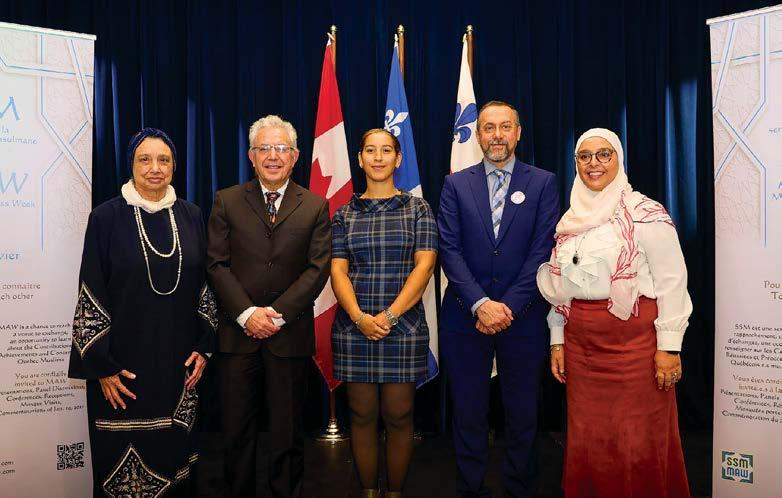
Since 2019, between January 25-31 a series of highly anticipated events take place in Quebec, mostly in Montreal, under the banner Semaine de sensibilization musulmane — Muslim Awareness Week (SSM-MAW).
How did it all begin? On Jan. 29, 2017, 27-year-old Alexandre Bissonnette stormed the Centre Culturel Islamique du Québec (The Islamic Cultural Center of Quebec) and fired on dozens of congregants. He killed Ibrahima Barry, MamadouTanou Barry, Khaled Belkacemi, Abdelkrim Hassane, Azzedine Soufiane, and Aboubaker Thabti and seriously
injured five others, among them Ayman Derbali, who will remain confined to a wheelchair for the rest of his life. Six widows with 18 orphans were left to mourn. [Editor’s note: In a May 7, 2022 unanimous ruling, the Canadian Supreme Court ruled that Bissonnette must have a chance at parole after serving 25 years in prison, striking down a Criminal Code provision allowing judges to impose consecutive periods of parole ineligibility.]
In his guilty plea to the police, Bissonnette admitted being motivated by his fear and abhorrence of Muslims and that when expressed publicly,
societal accomplishments. Their common vision is that of a cohesive society in which trust among different groups is created, the marginalization of minorities avoided, and all members are offered equal opportunities of upward mobility.
Over the few years of its existence, SSM-MAW has spread from Montreal to Sherbrooke, Rimouski and Gatineau. Most of the activities are in French with a strong English component. The implementation requires four main facets to ensure its success: Addressing the Sources of Misunderstanding of Quebec’s Muslims
his murderous thoughts met no objection. After this tragedy, a spontaneous surge of solidarity and sympathy from all stripes of politicians, as well as lay people, quickly faded out. However, two questions remained, “Why?” and, most importantly, “What to do?”
Like-minded volunteers, all anchored in Muslim communities with a strong track record of civic engagement, launched the Muslim Awareness Week to combat the misconceptions of Muslim (Québécois) Quebecers. They also wanted their fellow citizens to discover Muslims’ contributions and
Regardless of the underlying rationale for rejecting Muslims — economic, cultural and/or security-related concerns — negative feelings toward them are widespread. Resentment, fear, and anger are easily mobilized by a media culture that relies on sensationalism and shallow ideals imported equally from Europe, particularly France, and the U.S. In addition, negative examples selectively taken from faraway countries are projected upon Muslims. This contributes to a growing anxiety and misconception about their compatibility with Canada and Quebec’s progressive norms, especially in terms of equality between men and women, loyalty to their adopted country, and integration into society.
The internet, a valuable source of knowledge and connectivity, also gives easy access to offensive and racist platforms. Regrettably, the growing popularity of extremist groups, locally and internationally, exacerbates an already worrisome situation. At election times, at all levels of government, Canadians witness a wave of simplistic and ill-founded speeches targeting Muslims, whether on veiledface voting, state secularism, or
religious symbols. This leads to superficial debates that invariably generate intolerance amplified by hateful comments spread by social media. These drivers of negative sentiment have led to repercussions with serious consequences in how Quebec’s Muslims are treated, whether as long-time immigrants, natives, or asylum seekers.
Creating a Prerequisite Environment for Addressing the Root Causes of Conflict
This calls for multiple voices to be heard and ensures opportunities for constructive and respectful dialogue in which power relations and historical grievances are discussed and negotiated. This kind of exchange runs parallel to tolerance, a fundamental building block of a harmonious pluralistic society. SSM-MAW selects the venues and undertakes careful planning to ensure helpful dialogue.
Offering Opportunities for Rapprochement
Building mutual understanding across groups is as old as humanity itself. Learning how to live together in a world of increasing diversity has emerged as one of today’s most pressing challenges. In increasingly mixed and heterogeneous societies, we can live in bubbles and find our positions reinforced rather than questioned. One of SSM-MAW’s real potential strengths lies in calling attention to the lesser-told stories of groups that typically do not interact coming together.
Developing Effective Tools for Education and Advocacy for Quebec Muslims
An enabling environment ensures that as different forms of intercultural interactions occur, the underlying communications go beyond tolerance and toward transformative experiences. Canadian Muslims envision SSM-MAW becoming part of the indispensable toolbox that
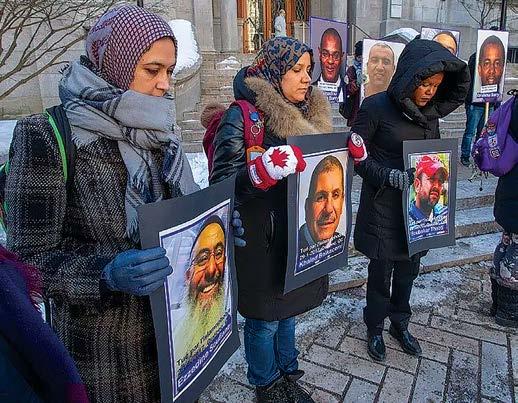
Mosques open houses that ceased post-Covid need to be revived.
Civic engagement (e.g., blood donation clinics) should be looked into.
Standing with Palestine. “GAZA Monologues” produced by Teesri Duniya Theater was presented. Nassamat, a Palestinian music ensemble, also played old favorites and modern hip hop at the fair.
Resentment, fear, and anger are easily mobilized by a media culture that relies on sensationalism and shallow ideals imported equally from Europe, particularly France, and the U.S. In addition, negative examples selectively taken from faraway countries are projected upon Muslims.
can strengthen social cohesion and respond directly to challenging situations.
Launch of Muslim Awareness Week on January 25 at Montréal Town Hall. Representatives from all levels of governments, municipal, Quebec and Federal, in addition to community leaders and partners, attend and participate in cultural entertainment and networking over refreshments.
Remembrance Day Jan 29. An outdoor vigil was convened at Place du Parc, where the first vigil was held in Montreal in 2017. The event featured speeches, prayers and candles, and enjoyed wide media coverage.
Th e Fair on Saturday. This popular family-friendly event offered specialty food and showcased fashion, Arabic calligraphy, Turkish Ebru art, and more.
Cultural events. Literary discussions with Muslim authors and documentaries about Muslim living in Quebec and Canada were followed by discussions with the producer and the “stars.” These are well attended by intellectual groups.
Interfaith dialogue with Christian and Jewish groups. These recurrent meetings had been carefully nurtured over the years. After our relationship with a progressive synagogue floundered, a new opportunity with a Sikh temple opened.
A crucial part of SSM-MAW’s success is to secure wide coverage, both in traditional and social media. This aspect cannot be emphasized enough. We contribute op-eds, interviews, photos, and more. The Federal Government has supported this initiative. Also, there are sincere partners without whom the project could not have succeeded in presenting events of such variety and richness.
In Jan 2021, the federal government has announced that Jan. 29 will become a National Day of Remembrance for the 2017 Quebec City Mosque attack in a move to honor the victims and express solidarity with the survivors. “This tragedy reminds us of the urgency to stand up against these hateful acts and online radicalization,” said Minister of Canadian Heritage Steven Guilbeault in a statement.
SSM-MAW is a value-driven process that requires participants’ commitment to principles such as mutual respect, empathy and a willingness to change perspectives. Pursuing societal change requires the stakeholders’ perseverance. It takes effort and money, but it is the constructive thing to do if we aspire to live in peace and enjoy full citizens’ rights in Quebec. ih
BY AMIRA ELGHAWABY
Canada is facing a test that requires standing up for the rights of all people, including Muslims, to live with dignity and free of discrimination.
Canadians can succeed by upholding our stated values of diversity and inclusion, where people from all backgrounds feel seen, are treated fairly, and valued for their contributions. Or we will fail if we permit divisions to take root, amidst rising Islamophobia, antisemitism, anti-Palestinian and anti-Arab racism, and the curtailing of civil liberties.
The crucial context is that Muslim communities in Canada, along with other faith communities and allies, are experiencing ongoing anguish and frustration at the lack of meaningful action to uphold international humanitarian law in relation to Palestinian human rights and, urgently, to end the devastating war in Gaza, which continues to rage at the time of writing.
Over the past several months, many within Canada’s diverse Muslim communities feel they have been thrown back 20 years to the post 9/11 era — an era some of us remember all too well: when we had to prove our loyalty to Canada, prove we were “good” Muslims, and accept that racial profiling and discrimination were the new normal; when we could expect our civil liberties to be suspended at any time.
Young Muslims born after 9/11 have been brought face to face with the insidious ways that Islamophobia, anti-Palestinian, and anti-Arab racism can delegitimize their participation in civil society, even

Islamophobia is a global phenomenon and pre-dates 9/11. It includes bias, stereotypes, discrimination, and hate, as well as the view that Muslims pose a disproportionate security threat. Even though Canada has a world-renowned reputation for multiculturalism and pluralism, Islamophobia is a daily reality for Canadian Muslims.
leading to school or university suspensions/expulsions, termination, doxxing, and other egregious forms of silencing and intimidation.
Islamophobia is a global phenomenon and pre-dates 9/11. It includes bias, stereotypes, discrimination, and hate, as well as the view that Muslims pose a disproportionate security threat. Even though Canada has a world-renowned reputation for multiculturalism and pluralism, Islamophobia is a daily reality for Canadian Muslims. Anti-Palestinian and anti-Arab racism are forms of racism
It was following the attack on the Afzaal family, who are fondly remembered as “Our London Family,” Canada’s federal government convened the 2021 National Summit on Islamophobia. Among community recommendations was creating an Office of the Special Representative Combatting Islamophobia. I was appointed in January 2023, following a lengthy 20-year career working in journalism and advocacy.
My office has a mandate to provide expert community-informed advice to the Federal government, promote awareness and education on Islamophobia, and develop training tools. In my first year I have had the privilege of travelling across Canada, visiting with Muslim communities. I have heard first-hand their achievements, struggles, and frustrations.
that intersect with, or fuel, Islamophobia (and vice versa).
In Canada, Islamophobia has been deadly. Our country has the heartbreaking distinction of having the highest number of deadly targeted attacks on Muslims of any G7 country.
There was the 2017 shooting at the Islamic Cultural Centre of Quebec City that took the lives of six men; the 2020 stabbing of a Toronto mosque caretaker; and the 2021 terrorist van attack in London, Ontario, that took the lives of four members of the same family — three generations — leaving a young boy orphaned.
After the Hamas attacks on Israel and Israel’s subsequent bombardment of Gaza, Muslims are feeling pain, grief, and fear. I have met with Palestinians who have lost up to 300 family members from Israeli strikes. The enormity of what we are seeing in Gaza is a lot to bear. Islamophobia in Canada has skyrocketed; the National Council of Canadian Muslims has reported a rise of 1300% in cases of discrimination and hate (René Bruemmer, https:// montrealgazette.com, Nov. 13, 2023). Some media and public discourses have positioned pro-Palestinian supporters as terrorist sympathizers.
Muslims in Canada feel unheard, that their perspectives are being ignored or minimized. I have conveyed these messages in my meetings with various government departments, deputy ministers, ministers, and the prime minister.
My efforts this year have included raising awareness
within the federal public service, with the wider public and engaging institutional leaders.
Prior to the start of the devastating war, our office hosted the Canadian launch of the “Understanding Anti-Muslim Hate Crimes-Addressing the Security Needs of Muslim Communities: A Practical Guide.” The international guide provides an analysis of security risks and is aimed at improving the ability of police forces and other institutions to protect Muslim communities and individuals.
At the start of Islamic History Month last October, we launched a downloadable poster series celebrating the contributions of Muslim women and girls. The series was based on focus groups held with women and girls from Edmonton, Alberta, following a series of hate-motivated attacks on visibly Muslim women, many who were also Black. The images were displayed in a local transit station and on buses with the tagline: “Individual safety is all of our responsibility.”
Canada’s Minister of Diversity, Inclusion and Persons with Disabilities, Kamal Khera, often reminds Canadians that, “Diversity is a fact in Canada and inclusion is a choice.”
The time to put those words into action is now. Together, Canadians have an opportunity to shape a country that is free of Islamophobia, anti-Indigenous racism, antisemitism, anti-Black racism, anti-Asian racism — any and all forms of bias and hatred. We can work towards helping fulfill Canada’s vision of itself as a country where everyone can participate fully and contribute to their fullest potential.
We can and must pass this test. Subscribe to the official newsletter: The Combatting Islamophobia in Canada mailing list - Canada.ca. ih
Amira Elghawaby is Canada’s Special Representative on Combatting Islamophobia
BY MALIKA HARRIS
The Black Canadian Muslim organization (BCM) was formed during the Covid pandemic by a handful of community members who realized that the larger Muslim community was struggling to process the impact of systemic racism on our modern-day society, the same system that made all of us eyewitnesses to the police brutality in the U.S. that killed George Floyd.
It was extremely painful to hear some Muslim community leaders suggest that this racially based issue had nothing to do with our community. This rhetoric was another daunting reminder of why it is important to have Black Muslim representation within the leadership of our larger community. This reality motivated us to create an organization that would strive to fulfill the spiritual, social, and educational needs of the Black Canadian Muslim community, in the hope of helping us reconnect and reclaim our community’s rightful place within the folds of Islam.
From the very dawn of Islam, we see its foundation built on an inclusive framework, one that united humanity and called all people to unite under one faith. When Prophet Muhammad ( salla Allahu ‘alayhi wa sallam) was ostracized by the Meccan tribes, he was forced to send most of the small community of Muslims that existed at the time away to escape. He turned to an

African civilization for support. The Prophet showed no hesitation or any of the prejudice towards Black people that is still so visible among Muslims today. Instead, he viewed the people of Abyssinia (modern-day Ethiopia) as allies, fellow monotheists who worshiped One God and strove to follow the teachings of Prophet ‘Isa (‘alayhi as salam).
The Prophet’s demonstration of racial inclusivity is what facilitated this long standing and thriving relationship between Africa and Islam that continues to exist until today.
Islam’s position on racial equality is crystal clear. “O humanity, We have created you male and female, and appointed you races and tribes, that you may know one another. Surely the noblest among you in the sight of God is the most God-fearing of you.
is All-knowing, All-aware” (Quran 49:13).
This is why Black Canadian Muslims are often caught off guard when they interact with Muslims who outwardly acknowledge the Prophet’s example, while simultaneously submitting to cultural norms that dilute Islamic ideals and leave minimal room for the tangible practice of Islam’s teachings regarding this issue.
For the most part, this experience extends to both Black Muslim reverts who returned to Islam in the last half century and their offspring, as well as those families who can trace their lineage back to early Islam. However, the descendants of the enslaved Africans whose ancestors were brought to the West via the trans-Atlantic
slave trade, who face a unique set of challenges because their ancestral identity was stripped away, who embraced Islam and the hope to join a community that practices and promotes anti-racism where they can truly belong. One can imagine the internal conflict they endure as their newfound community continues to marginalize them.
three decades. As Muslims, we know that even though specific organizations may give themselves a culturally or racially neutral name, specific cultural groups often run certain mosques and organizations and most often cater to their cultural community’s needs. This practice, unfortunately, marginalizes some minority groups. This was
As Muslims, we know that even though specific organizations may give themselves a culturally or racially neutral name, specific cultural groups often run certain mosques and organizations and often cater to their cultural community’s needs.
Especially when they realize that the longstanding contributions of Muslims who looked like them are often neither valued nor celebrated.
These realities motivated the formation of an organization that is rooted in Islamic ideology while striving to serve this group’s complex needs because of historical slavery and ongoing systemic racism. Most BCM members are individuals who reverted to Islam in the 1960s and 70s, as well as their children and grandchildren who they have strived to pass their love of Islam to. BCM’s main goal was to create a safe space in which Black Muslim families, especially our youth, could develop a connection as Muslims while countering the rejection they often face in the larger community.
People often ask, “Why create a Muslim organization that focuses on one race?”
The reality is that the Western Muslim community has been dividing itself into culturally based organizations for the last
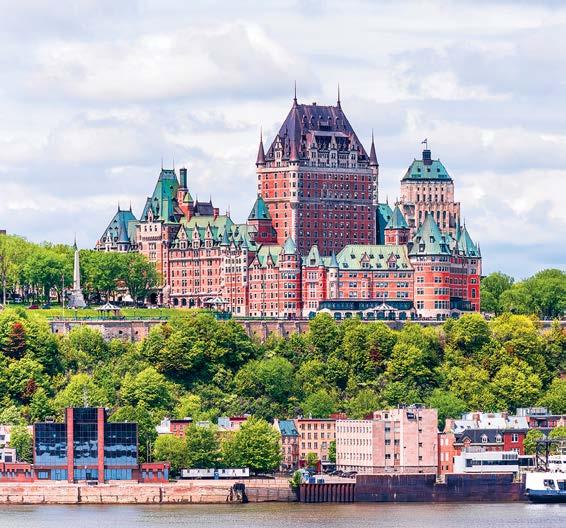
a common experience expressed by many Black Muslims. This is why we felt it was necessary to form a community group that strives to unite individuals and families who share similar lived experiences.
Over the last three years, we’ve managed to provide family, youth and children’s programs that serve our specific needs. For example, our annual BBQ and Eid celebrations, which have been attended by 100 or more Black Muslim participants, many of whom reverted 50+ years ago and their families, as well as more recent reverts to Islam.
The intention was never to divide, but to serve a marginalized group until the larger community understands the value of including Black Muslims. The ideal has always been to see our larger Muslim community return to our Prophet’s example, where Muslims of all races, creeds and cultures feel respected, included and valued. ih
Malika Harris is the co-founder of the Black Canadian Muslim organization in Toronto, Ontario.
BY STEVEN ZHOU
It might not feel like it, but Quebec’s Muslim community is facing a political crisis that’s striking at the heart of Canadian democracy.
It hasn’t generated many headlines. Not many cameras or reporters arrived when the National Council of Canadian Muslims (NCCM) and the Canadian Civil Liberties Association (CCLA) took their fight against Quebec’s Bill 21 to the nation’s Supreme Court in April this year.
Stephen Brown’s (CEO, NCCM) impassioned speech at the courthouse’s steps implored Canadians to pay attention that, according to him, “we are facing the greatest challenge to Canadian democracy of our generation.”
Bill 21 was passed in 2019 by Quebec’s governing Coalition Avenir Quebec (CAQ), a nationalist, autonomist and conservative provincial political party. This law bans any public servant from wearing religious symbols at work — hijab, kippah, turban, crucifix and other religious attire. That also goes for anyone working in the Quebec public sector: police, teachers, prosecutors and so on.
Don’t want to take off your hijab in public at work? Too bad. Work somewhere else. This forces people of faith to pick between career and religious devotion. Some have lost their jobs; others have moved away. Now, those who have had anything resembling a decent civic education will tell you
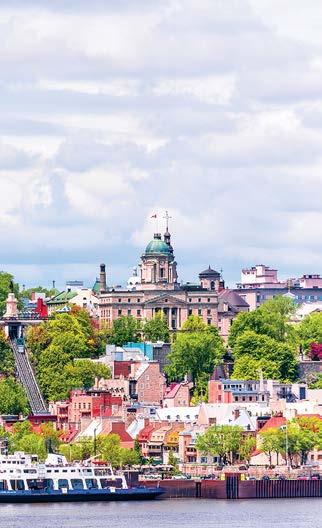
This clause exists as an emergency clause, as a kind of backstop to appease some provinces that were worried about judges (who are unelected) having too much say over the laws they pass. In short, it was never meant to shield bad laws that run roughshod over Canadians’ rights, thus
the Association for Canadian Studies, have also shown a drop in popular support for the bill (Morgan Lowrie, “Poll suggests support for Bill 21 provision may have dropped in Quebec,” Jan. 16, 2022, CBC News).
The political field is still open for any post-CAQ government in Quebec to take on this fight.
No matter how you look at it,
their ability to bear bad news is narrowing. Moreover, they haven’t all been paying attention as civil liberties and human rights groups have been toiling silently, day and night, against the Quebec government.
But it’s time to wake up. Muslims are at a crossroads. Either Muslim Canadians inside and outside of Quebec assemble
that Canadians can challenge laws they consider unfair and that violate the rights, liberties and principles enshrined in the Constitution. Bill 21 is a prime candidate for getting sued, because it violates Quebecers’ right to religious freedom and expression, something that the 46-year-old Charter guarantees. Thus, Bill 21 shouldn’t be able to withstand a court challenge.
But that’s where the larger problem starts. CAQ, predicting that Muslims and other civil liberty organizations would work together to dislodge the bill through just such a legal or constitutional challenge, set a deadly precedent for democracy by invoking the Charter’s Notwithstanding Clause [NWC], or Section 33, to shield Bill 21 from being challenged.
severely undermining democracy’s core. When CAQ invoked Section 33 to protect this clearly unconstitutional law, Canadian society and democracy changed overnight. Canadians are in unfamiliar waters.
The NCCM and CCLA have found creative ways to bring this issue to the courts, hoping to break CAQ’s precedent-setting move and striking down the bill. So far, these efforts have failed. Judges say that Bill 21 is indeed unconstitutional, but that it’s also protected by the NWC, which allows the national Parliament or a provincial legislature to pass an act that expressly declares that such legislation or any of its provisions “shall operate notwithstanding a provision included in section 2 or sections 7 to 15 [the fundamental freedoms, legal and equality rights provisions] of this Charter.”
The only other way to repeal the law would be for the Quebec legislature to vote it out in the future. A provincial government will have to gather enough political will to challenge it. Recent polls, such as the January 2022 poll carried out by Leger for
Quebec Muslims have yet again been put under the spotlight, this time in a battle that threatens to permanently undercut democracy. Just two years before Bill 21 became law, a gunman massacred six Muslim worshippers in the Quebec Islamic Cultural Centre. Instead of addressing the factors that have endangered and villainized the province’s Muslims, the community was made into political cannon fodder.
But it must not be forgotten that the problem is now much bigger. It’s a national and possibly constitutional crisis.
If provinces and politicians can damage our rights to religious freedom by using the NWC to pass unconstitutional laws, then none of our basic rights are safe. We now have a precedent that has knocked down the door for other political actors interested in undercutting our guaranteed rights like free speech, free assembly and free association.
This is an ugly possibility that many Canadians have yet to seriously examine or reckon with, as they are distracted and
to organize a final, cogent challenge against the deathblow to democracy in this country, or they all watch the system guaranteeing their religious freedoms fall in silence. ih Steven Zhou is a content writer with The National Council of Canadian Muslims.
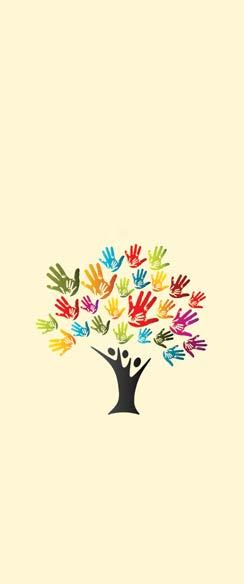
BY MUHAMMAD MUIZ AZEEM
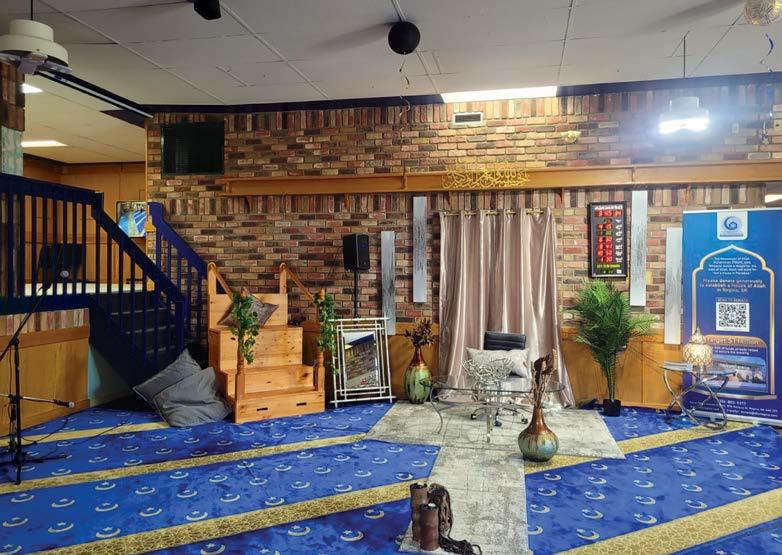
For a long time the Muslims of Regina, Saskatchewan’s capital, have faced a serious issue. Despite comprising 8% of its population — roughly 20,000 Muslims out of the city’s 2.5 million population — there was a noticeable gap in the community’s existing institutions: plenty of mosques, but a severe lack of services to address the significant hurdles confronting them. Clearly, many needs weren’t being met or noticed.
The founders of Darul Falah Islamic Centre (DFIC) faced such challenges too. So in 2017, they opened doors to a space that quickly became a hub of Islamic activities, particularly in the downtown area. From its humble origins, DFIC is now a beacon of Islam within the city and the province as a whole.
Although mental health remains a generally undiscussed or even taboo subject within many Muslim families, DFIC has made great efforts to make such support accessible to anyone by employing licensed Muslim therapists who recognize and understand their patients’ unique issues.
Recently, after a massive nationwide fundraiser, DFIC was able to purchase a property in central Regina to create a masjid and community center that serves as a focal point for its activities. Along with many of its peers, DFIC provides nikah (marriage)
support, hifz (memorization) programs, youth clubs, janazah (funeral rites), counseling, and mental health support. These activities are incredibly beneficial to Regina’s Muslims. For instance, although mental health remains a generally undiscussed
or even taboo subject within many Muslim families, DFIC has made great efforts to make such support accessible to anyone by employing licensed Muslim therapists who recognize and understand their patients’ unique issues. Care is provided to nearly everyone, and free therapy sessions are available and accessible to those who are zakat-eligible and financially vulnerable.
Another notable initiative is the nikah support. Many young Muslims can attest to the difficulty of finding a potential spouse. DFIC simplifies and streamlines this process by serving as both matchmaker and wedding planner so that Muslims with similar values and interests can connect and form a lifelong bond.
The licensed fine option agency, part of the Ministry of Justice’s Fine Option Program, is not an alternative to sentencing. Rather, it gives people the chance to settle fines by doing unpaid supervised community service work at a rate of Can$11.60 per hour. The ministry administers the program with organizations like local nonprofits or an individual, who then assign suitable community service work to people who register to settle fines and advise the court of the assignment’s outcome. Promoting responsibility and repairing relationships with the community are values that align with DFIC’s restorative doctrine. These initiatives distinguish the center from other masjids.
Another unique factor is their settlement services for international students. Due to an increasing number of students, DFIC has started to support them. Many of these students feel as though they receive little support, for they have access only to simple services like the food bank. This isn’t enough for those who are under immense pressure, be it financial, social or academic.
To address this, DFIC provides numerous services such as airport pick up on arrival; the “2-day essential help” in obtaining crucial documentation (e.g., a social insurance number, a bank account, a Saskatchewan health card, a bus pass and some groceries); and an orientation to the city, including the hospital, the university, the grocers, mosques and other places. DFIC volunteers put in immense effort in this regard, which is a testament to their faith.
DFIC has not forgotten our seniors either. To combat loneliness, the center organizes “compassionate calls” that check in on them so they can talk with someone. It also convenes “Mubobbi Adda,” a gathering where seniors can pass on wisdom to the youth. Among food and refreshments, different generations learn from one another in a welcoming environment. As many elderly have mobility issues and cannot come to the mosque, DFIC has started a pick-and-drop service for jummah prayer. This initiative is a great step in ensuring that our elders are taken care of.
DFIC’s new green initiative seeks to foster cooperation and camaraderie within the community. The first effort is the recycling program, which collects and sells recyclable material. Another initiative is the community garden, where members plant, care for, and share produce with others.
Clearly, DFIC has made its mark on the community and on all of Regina for that matter. Its leaders, although traditional in their beliefs yet forward-looking in their outlook, have done what the community needs. The provided services and initiatives have provided immense benefit to Regina’s Muslims and serves as a source of inspiration to other mosques in Canada. ih Muhammad Muiz Azeem is a student at the University of Regina.
BY SANOBAR ANJUM SIDDIQUI
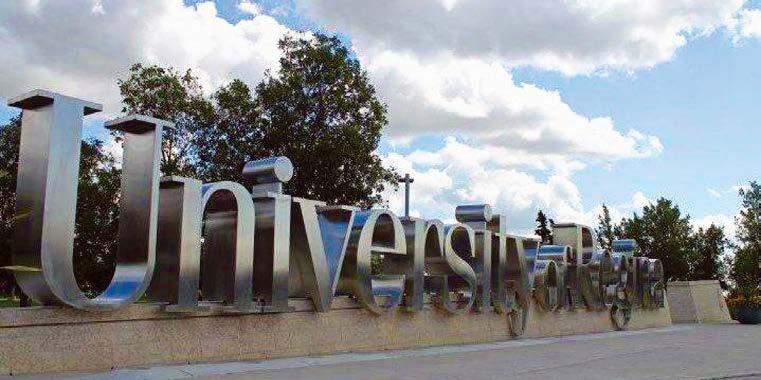
The genocide that Israel has launched against Occupied Palestine brought many like-minded faculty to help promote academic freedom, free expression, and awareness on this long-standing conflict up front and central within the academic discourse at the University of Regina.
The F4P Regina (Faculty for Palestine Canada) chapter was born after Oct. 7, 2023.
F4P is a Canada-wide network of academics dedicated to strengthening the struggle for Palestinian liberation, justice, and equality through the academia.
The Regina chapter works collegially with similar groups in Saskatchewan and broader Canadian university settings, including student bodies, to spread awareness and bring about positive change. The past months have witnessed multiple activities and engagement
sessions to help spread awareness of the ongoing blatant suppression and killing of Palestinians.
In January, a panel session was held at the University of Regina to help explain academic freedom to faculty. David Robinson (executive director, the Canadian Association of University Teachers) spoke about their freedom to speak on matters of public interest and the university’s duty to protect the institution from outside influence. Andrew Stevens (associate professor, Faculty of Business Administration, University of Regina) talked about how faculty used their internal discussions and organized a public campaign a decade ago that resulted in the business school dropping its proposed partnership in public safety with the Hebrew University of Jerusalem.
Batoul Abouelela (co-president, University of Regina
Students for Justice in Palestine) and social studies major Adhika Ezra reflected on student experiences on campus and the importance of faculty working to support their walkouts. Holly Funk (editor of the campus newspaper, The Carillon) discussed the pressures and duties of journalists in the West covering the genocide.
On Feb. 8, there was a film screening of “Israelism” on campus. The 2023 movie is about two young American Jews brought up to love Israel unconditionally who undergo drastic life changes when they see how brutally Israel treats Palestinians. As a result, they join a group of young American Jews who are challenging the establishment to reinterpret Judaism’s connection to Israel, thereby exposing a growing generational gap over what it means to be a modern Jew. We had a short group discussion. One Jewish campus community
member who attended suggested the film was very accurate and that they wanted to screen it at their synagogue.
On March 21, a panel session on four things you need to know to understand the war on Gaza was held. Panelists Ahlam Muhtaseb (professor, media
College of Medicine, University of Saskatchewan). The well-attended session and ensuing live discussion helped answer the difficult questions posed by the audience. Ahmad Al-Dissi reflected on having only met Jewish people (other than soldiers) when he moved to Canada.
school Palestinian workshops, reading testaments and martyrs’ last words, participating in silent protests, and holding bus rallies.
In tandem, the Student Union passed a motion to call on “college and university administrators to immediately cut any investments and ties
Biweekly marches for Palestine continue to be launched to help focus attention on the ongoing genocide by live streaming of the bombs being dropped and the AI-generated killing machine that treat Palestinian infants, babies, children, men, and women the same. All of this weighs heavily on humanity’s soul. This small attempt seeks to help tilt the balance and stop the genocide.
studies; graduate coordinator, Department of Communication Studies, California State University, San Bernardino), Mylan Tootoosis (Nehiyawpwat doctoral student, University of Saskatchewan), Ahmad Al-Dissi (Palestinian-Canadian professor of veterinary medicine, University of Saskatchewan) and Omar Hafez (Palestinian student,
Students for Justice in Palestine (SJP) conducted multiple activities throughout the fall and winter semesters to help advocate for Palestinian lives. Activities included walkouts in support of Gaza, Sudan and Congo along with sit-ins at the New Democratic Party’s (NDP) office, meeting with government representatives, holding high
with weapons manufacturers and other corporations that fund genocide in Gaza.” The F4P Regina chapter and the SJP spoke to University president Jeff Keshen and other administrators, and they agreed to see what they could do to disclose their investments’ fund names. Once this list is disclosed, SJP and F4P will begin advocating
that the university disinvest from Israeli companies that promote the genocide and ethnic cleansing of Palestinians.
In another initiative, a statement by the F4P Canada Regina Chapter was drafted and submitted to Dianne Ford (vice president of administration, University of Regina) requesting that the decision to host and provide Starbucks space on campus from fall 2024 be reversed. A newspaper article was published, and much online support was garnered from students, faculty and the public who disapprove of this decision.
Biweekly marches for Palestine continue to be launched to help focus attention on the ongoing genocide by live streaming of the bombs being dropped and the AI-generated killing machine that treat Palestinian infants, babies, children, men, and women the same. All of this weighs heavily on humanity’s soul. This small attempt seeks to help tilt the balance and stop the genocide. ih

BY NAZIM AWAN
This collective effort strengthened community bonds, which fostered a spirit of cooperation. The encouragement provided by their neighbors further emphasized the project’s inclusive nature.
In the heart of Canada’s northern territories, the city of Yellowknife is witnessing the emergence of a significant symbol of faith and community: the Islamic Centre of Yellowknife.
This 2-storey, 7,500-squarefoot center, which will include large worship spaces, a youth hall, a library and more, stands as a testament to this 600-member community’s resilience, dedication and unity in this remote part of the country. Yellowknife’s Indigenous population of 3,400 is the largest single community in the Northwest Territories (NWT). Yellowknife is part of the North Slave region: if its population is not included, Indigenous people make up 91% of the population.
Over time, Yellowknife has become home to many new Muslim immigrants and refugees who have cultivated a community flourishing with rich culture. For several winters, the Islamic Center partnered with Islamic Relief Canada to donate care bags of essentials and care packages to communities across the NWT. Other culture-sharing initiatives and events included Qurbani (Eid ul Adha meat sacrifice) donations to local organizations (e.g., the Yellowknives Dene First Nation, and Native Women Society), as well as
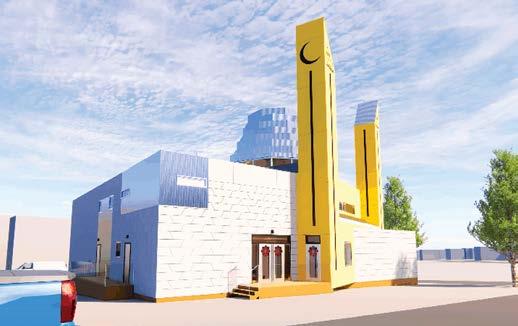
The construction, a community-driven effort from the start, is the result of local Muslims’ financial donations, leading the project design, working with ISNA Canada and volunteering their time and skills.
supporting protests, marches and public events in solidarity with Indigenous peoples, Black Lives Matter and Palestinians.
The new Islamic centre will continue to be a place of worship, culture-sharing and community-building. The mosque, a haven where local Muslims can practice their faith freely and confidently, stands as a beacon of Islamic values such as charity, hospitality and compassion and offering services to anyone in need. It is also a learning center where the public can gain a better understanding of Islam and engage in promoting interfaith harmony and cultural exchange.
The Islamic centre is more
than just a mosque; it is a symbol of the community’s identity and a place where faith, culture and social bonds intertwine. It provides a dedicated space for daily prayers, jummah and celebrations like Ramadan and Eid. Beyond its religious functions, the new center will host educational programs, interfaith dialog and social events to foster a sense of belonging and mutual understanding within the broader community.
As the community eagerly anticipates the opening of this spiritual and cultural hub, it’s essential to reflect on its brief history, the values it represents, and the challenges overcome during its construction.
The Islamic Centre of Yellowknife’s journey began over 25 years ago when ISNA Canada purchased and converted an old building into the city’s first mosque. This original center served the community faithfully for decades, thereby becoming a vital part of the local Muslim experience. However, as it grew and the building aged, a purpose-built mosque was clearly needed.
Driven by this vision, the ISNA Canada Islamic Centre of Yellowknife initiated plans for such a mosque. Fundraising efforts intensified, and the project gained momentum, especially with ISNA Canada’s steadfast support. This collaboration ensured that the dream of a new mosque would soon become a reality, promising a facility that could better serve both spiritual and communal needs.
The construction, a community-driven effort from the start, is the result of local Muslims’ financial donations, leading the project design, working with ISNA Canada and volunteering their time and skills. This collective effort strengthened community bonds, which fostered a spirit of cooperation. The encouragement provided by their neighbors further emphasized the project’s inclusive nature.
However, building this new center had several challenges, such as the harsh northern climate and logistical difficulties in transporting construction materials to this remote location.
Then there was the financial aspect, as the community had to raise substantial funds. They also had to face unexpected hurdles such as the COVID-19 pandemic and when regional wildfires necessitated evacuations.
But thanks to the support of the community and a dedicated team of volunteers, the project persevered. ISNA Canada’s involvement was a critical factor in overcoming the construction challenges. Several ISNA leaders played significant roles, including former chairs Syed Imtiaz Ahmad, Katherine Bullock, and Michael Singh, former executive director Taha Ghayyur, and the current executive director Fouzan Khan.
Their guidance throughout the construction process ensured that the project adhered to local regulations and the Muslim community’s specific needs. Thanks to their hard work and the local community’ resilience, the construction is on track to complete in spring of 2025. However, the community still needs help to ensure that the new mosque has adequate ablution facilities, prayer spaces and resources for its overall maintenance and staffing.
As the center’s opening approaches, the excitement and anticipation within the community is palpable. The mosque stands as a monument to the perseverance and unity of Yellowknife’s Muslims and as a testament to the power of community involvement and support. It will undoubtedly also become a cornerstone of spiritual life and community development in Yellowknife, enriching the lives of all who enter its doors.
Please consider donating to the Yellowknife Mosque at isnacanada.com. ih
BY AYSE SULE AKINTURK
Cand Investment at the Government of the Northwest Territories and currently a Senior Economic Development Advisor with the Federal Government of Canada.
anadian Muslims are often perceived as racialized newcomers who escape oppression and/or poverty elsewhere. However, this perception is highly problematic because it fails to acknowledge the responsibility of non-Muslim forces in many cases of forced migration and overlooks Canadian Muslims’ long histories, diverse experiences and great contributions. This perception continues to persist even though the contributions of Muslims to Canada and world civilization began to be highlighted across the country in 2007, when October was proclaimed as Canadian Islamic History Month. The first officially recorded Muslims in Canada were James and Agnes Love, a young Scottish couple who migrated to Ontario in 1851. During his archival research, Daood Hassan Hamdani (d. 2019), a well-known economist and statistician, found that the family’s members were recorded as “Mohammadens” in Canada’s first census (1871). For the next few decades, more Muslims came mostly from Ottomanruled Syria, Lebanon, Albania and Yugoslavia. Since then, their number has been growing slowly but steadily.
According to 2021 census data, Islam continues to be the most reported non-Christian religion in Canada: nearly 1.8
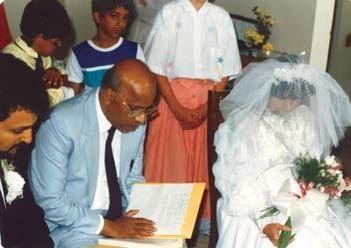
million (1 in 20).
The same data shows that Muslims increased from 3.2% (2011) to 4.9% (2021) — the highest growth rate among all religious minorities (Statistics Canada: “Focus on Geography Series, 2021 Census of Population,” 2021).
Interestingly, “Statistics Canada” observed a similar trend in the province of Newfoundland and Labrador, where religious diversity is the lowest — 82.4% of the population self-identifies as Christian. It also reported that the share of Muslims in the provincial population increased from 0.2% (2011) to 0.8% (2021).
The Muslim Association of Newfoundland and Labrador (MANAL) estimates it to be over 7,000 as of 2024. This most eastern province has a well-deserved reputation for being welcoming and friendly, especially toward those much-needed international professionals who come to teach and work in health, water resources, oil, naval engineering and other key sectors. Historically, this acceptance has encouraged the influx of many Muslim professionals and graduate students with their families. While these early Muslims didn’t experience or report any major incident of hatred, the recent rise of Islamophobia elsewhere in
Interestingly, “Statistics Canada” observed a similar trend in the province of Newfoundland and Labrador, where religious diversity is the lowest — 82.4% of the population self-identifies as Christian. It also reported that the share of Muslims in the provincial population increased from 0.2% (2011) to 0.8% (2021). The Muslim Association of Newfoundland and Labrador (MANAL) estimates it to be over 7,000 as of 2024.
Canada has led to a sense of increased vulnerability.
The 2017 killing of six worshippers in the Quebec Islamic Cultural Centre, the subsequent rise of hate crimes nationwide and, finally, some local incidents of hate speech against immigrants and Muslims have encouraged various university and community collaborations to identify and address the rise of Islamophobia in this province. Such collaborations identified an important gap: Despite their long history and great contributions, Muslims were not systematically represented in the province’s heritage and archives.
Taking the first steps to fill this gap, MANAL advocated for and successfully secured the proclamation of October as Islamic History Month by the City of St. John’s and the Government of Newfoundland and Labrador in 2019 and 2022, respectively. During this period, they partnered with the Memorial University of Newfoundland and Labrador for an archival research project to document the history of the Muslims in the province. Co-led by Dr. Jennifer Selby (professor, religious studies) and Ayse Sule Akinturk (post-doctoral fellow, Department of Religious Studies), the Muslim Narratives and Lives in Newfoundland and Labrador (MNL in NL) community partnership project was launched in 2020 with the support of the Social Sciences and Humanities Research Council’s (SSHRC) Partnership Engage Program.
The MNL in NL project initially focused on scanning existing archival materials to uncover any Muslim presence since 1925 — the year when Memorial University was established. It also produced new records by collecting the narratives of self-identifying Muslims and
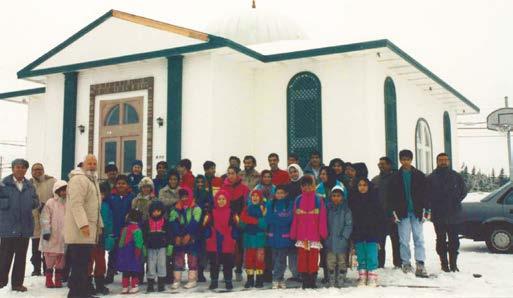
their personal archival donations, as well as conducting oral history interviews with 22 individuals who had long-lived experiences in the province.
Some of the findings will be shared through a book that, we hope, will be launched in 2025.
In the meantime, a physical and digital archival space is being created at Memorial University’s QEII Library to secure a permanently growing archive to document the past, present and future histories and contributions of this province’s Muslims.
Before the project’s launch, the late Muhammad Irfan (d.2008) and his wife Razia were assumed to be the province’s first Muslims. According to Memorial University records, Irfan joined the Department of Physics as a faculty member in 1964 and for many years was chairman of its radiation control committee. In addition, he also conducted several Muslim wedding ceremonies. In 1999, seven years after his retirement, he and his family relocated to Ontario.
The MNL in NL Project revealed a longer than previously assumed history of Muslim faculty at Memorial University. One of the earlier faculty members thus identified was the late Shafiq Alvi (d.2016), who joined its Department of Economics in 1961 to teach public finance. In 1963 he accepted the position of head of Loyola College’s (the future Concordia University)
Department of Economics and moved to Montreal. He also volunteered with the nonprofit organization Muslim Community of Quebec as its secretary and treasurer.
Another interesting finding relates to late Hamdani — he was one of Memorial University’s earliest Muslim graduate students. While living in St. John’s (196466) to earn a master’s degree in economics, this active and vocal student held leadership roles on campus and wrote articles for the university magazines and local newspapers. After graduating, he worked in Ontario as an economist for the Federal Department of Finance and for Statistics Canada. A few years before his death, he was interviewed for Murray Hogben’s “Minarets on the Horizon: Muslim Pioneers in Canada” (Mawenzi House Books, 2021). In a brief reference to his time in St. John’s, Hamdani recalled that “there were only two other Muslims,” probably referring to Muhammad and Razia Irfan.
Due to the initial low retention rates, it took many years for the province’s Muslims to form a permanently settled and well-organized community. During the late 1960s and ‘70s, they gathered mostly at their homes or rented places on campus and in churches to hold their religious services. In 1981, they established MANAL and
launched an extensive fundraising campaign. The construction of Masjid Al Noor began in the mid-1980s, after the Muslim Association of Newfoundland and Labrador purchased Logy Bay Road land in the east end of St. John’s and the required city permits were issued.
The MNL in NL Project highlights the stories of several members who led the mosque construction efforts. One of them was Abdel Salam Mesbah, who moved to St. John’s in 1974 after working for four years in London, ON, as a medical physicist. He played a tremendous role in the care of cancer patients in Newfoundland and Labrador. In 2003, he retired as director of Dr. H. Bliss Murphy Cancer Center’s Medical Physics and Electronics.
Wasi Ullah, another prominent community member who moved to St. John’s in 1975 as a hydrologist, led MANAL in the mid-1980s and made great contributions to water resources management. Working at the Department of Environment and Lands, he retired in 1997 as the director of water resources.
Young members also shared in the excitement about Masjid Al Noor. In 1988, Yassir El Tahan was four years old when his parents and others were working hard to finish the mosque’s construction. His father Hussein helped design and fabricate a crescent for the dome and briefly stored this important piece at their family home.
Masjid Al Noor, which hosted its first congregational prayer during Ramadan 1990, soon became a hub attracting more Muslims to settle in and around St. John’s. Today, it continues serving Muslims from various ethno-cultural and linguistic backgrounds, including the original immigrants’ descendants. Their stories are waiting to be told and archived to inspire future generations. ih Ayse Sule Akinturk is a professor of creative writing at Memorial University.
BY MARWA MAHMOD
Canada is often referred to as a “cultural mosaic” for its ethnocultural and religious diversity. While Muslims are a relatively small minority, they are one of the country’s largest minority groups and have more than doubled their numbers within 20 years. According to Statistics Canada, from 2001 to 2021 this population increased from 2.0% to 4.9%. In fact, after Christianity, Islam is Canada’s second most reported religion — nearly 1.8 million (1 in 20) people self-identify as Muslim.
Canada’s Muslims, 63.1% of whom are immigrants, represent a variety of racialized groups. While Ontario and Quebec have reported the highest number of Muslims, this minority is expected to continue to grow nationwide. Like all minorities, especially religious ones, Muslims have unique needs and challenges that influence their collective mental health and well-being.
To better understand Canada’s Muslim mental health landscape, we should ponder the WHO’s definition: “[A] state of mental well-being that enables people to cope with the stresses of life, realize their abilities, learn well and work well, and contribute to their community.” While it can include anxiety, depression, mental and psychosocial disorders, mental health is so much more than just the absence of mental disorders. We should
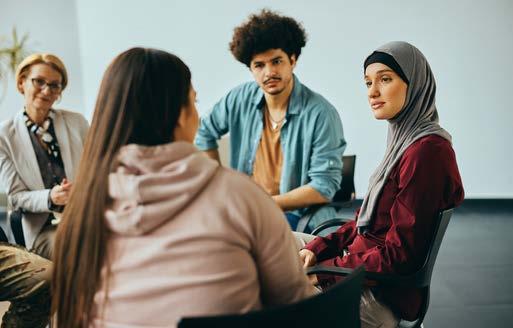
think of it as being on a spectrum or continuum — one that affects how we think, feel and act toward ourselves and others.
A variety of individual, social and structural determinants of health interact to protect or challenge our mental health.
Individual psychological and biological factors, such as emotional skills and genetics, can make people more vulnerable. Exposure to unfavorable social, economic, geopolitical and environmental circumstances, such as inequality and violence, can also increase one’s risk. Risk factors that occur during developmentally sensitive periods, such as in early childhood, are especially detrimental.
In contrast, protective factors are elements in our lives that help strengthen our resilience and ability to cope, thereby minimizing the risk of mental health challenges. These can include individual, social and emotional skills and traits; quality education, gainful employment, positive social interactions; along with faith, families
with a newly added branch in the U.S. In addition to a 24/7 confidential, anonymous and free helpline across North America, its team develops and facilitates various psychoeducational programs in addition to a web therapy program that offers sliding scale fees and free therapy for qualifying low-income clients.
Naseeha also provides crisis support to families and communities struck by tragedies, such as the June 2023 terrorist attack in London, ON, that claimed the lives of four Muslim family members and left a nine-yearold boy seriously injured and orphaned. This tragedy was the worst crime against Muslims in Canada since the terrorist attack during January 2017, in which a gunman murdered six worshippers at the Islamic Cultural Centre of Quebec City and injured 19 others.
and communities that support resilience, safety and cohesion.
Muslims have progressed as a community, whereas discussing mental health remains a taboo topic. Misconceptions, such as the belief that poor mental health indicates a lack of faith or is a divine punishment, can contribute to internalized stigma and wondering if there is something inherently wrong or inadequate with oneself. The emotional impact of self-stigma can often be greater than the symptoms initially experienced, as it destroys self-esteem, self-efficacy and one’s outlook on life. This shame-based vicious cycle further isolates us from seeking support.
Over the past 20 years, several Canadian organizations and institutions have sought to increase awareness and destigmatize seeking treatment for mental health conditions. The Mississauga-based Naseeha Mental Health (www.naseeha. org) is a registered nonprofit, Islam-inspired organization
Experiences of Islamophobia, xenophobia, racism and discrimination can significantly impact mental health, for they can create a pervasive sense of fear and lead to chronic stress, anxiety, depression, social isolation and PTSD. During November 2023, Naseeha Mental Health reported an alarming 600% surge in helpline calls from predominately Muslim Canadians experiencing marginalization in their schools and workplaces, as well as symptoms of anxiety and depression due to the ongoing genocide in Palestine.
One of this community’s biggest challenges remains the need for more culturally sensitive mental health services nationwide. This became particularly heightened during the Covid-19 pandemic, especially for those Muslims living in more remote areas who had to struggle to access these already limited supports.
Cedarway Therapy (https:// cedarwaytherapy.com/), a
private practice in Ontario, provides a range of in-person and virtual individual, couples and family therapy; diagnostic and psychoeducational assessments services; and group sessions and workshops. Their team of clinicians treat clients across the lifespan, including young children and the elderly, by using different evidence-based modalities in diverse languages while integrating Islam and faith-based counselling — which has been a growing demand.
Research has consistently demonstrated that religion and spiritualty are protective factors of mental and physical health, both of which are intrinsically tied together. Higher levels of spirituality have been found to increase hope, purpose, coping strategies, resilience and gratitude, with clients seeing a reduction in symptoms of anxiety and depression. Muslim clinicians who understand their community are better equipped to provide appropriate, individualized, culturally sensitive and therapeutically effective care, because they offer a deeper awareness of Islamic teachings and cultural nuances.
In my own clinical practice, I’ve observed a few common topics among Muslim clients: coping with symptoms of stress, anxiety and depression; navigating family and romantic relationships; managing faith-based dilemmas; and addressing childhood and intergenerational trauma. Other themes include loneliness, caregiver stress, acculturation, academic and workplace stressors, divorce and single parenthood, domestic violence, parent-youth conflict and marital issues.
Currently, the most prevalent theme among my adult clients is navigating relationships with emotionally immature family members who lack self-awareness, especially in a manner that
aligns with their cultural and religious values. On the other end of the spectrum, addiction is one of the fewest presenting issues I have come across. At face value, rates of substance abuse and addiction may seem low compared to other groups. However, research suggests that Muslims living in Western societies are more likely to have
to seek support and treatment due to cultural and religious shame, fear of judgment and perceived cultural notions of hayaa (modesty).
As a clinician, I work collaboratively with clients to identify their therapeutic goals in order to address presenting issues. Treatment planning can include providing psychoedu-
cohesive strategy that involves collaboration among healthcare providers, researchers, community and spiritual leaders, and policymakers.
Several organizations and institutions are doing incredible work to support and address these concerns. However, most of them are based in Ontario, a reality that needs to be changed
Research has consistently demonstrated that religion and spiritualty are protective factors of mental and physical health, both of which are intrinsically tied together. Higher levels of spirituality have been found to increase hope, purpose, coping strategies, resilience and gratitude, with clients seeing a reduction in symptoms of anxiety and depression.
addiction issues than those living in Muslim-majority spaces. In addition, Muslims in Canada are less likely to access mental health services than the general population.
Addiction stigma is particularly prevalent. According to Ahmed Hassan (addiction psychiatrist, Toronto’s Centre for Addiction and Mental Health [CAMH], www.camh.ca), among the reasons for this are misconceptions about available services; fears that treatment will be disclosed to employers; and beliefs that addiction is shameful, sinful and shouldn’t be discussed outside the family. Naturally, all of these deter individuals from seeking support and treatment, thereby increasing isolation.
Likewise, Muslim clients are generally reluctant to seek therapy for other addictions, such as pornography, sex, sexual shame, infidelity and other such issues. Professionally speaking, I don’t believe that our community necessarily faces fewer challenges with these issues when compared to the general population. Instead, we tend to conceal them and hesitate
cation, learning various coping strategies, developing effective communication skills, identifying values, discussing boundary setting, processing emotions, expressing needs, challenging negative thoughts, safety-planning, developing self-awareness, fostering gratitude, nurturing kindness and compassion for self and others, highlighting strengths, exploring collective healing and reclaiming intergenerational wisdom and gifts.
Despite the growing Muslim population, there is a lack of academic research focused on their mental health needs. Over the past few decades, Muslims working in the social and health sectors have raised concerns over the need for a collaborative national strategy that addresses the realities impacting their mental health and well-being, among them various forms of stigma, limited culturally competent care and services, systemic barriers, and socioeconomic and political factors. Addressing these issues requires a multifaceted approach and
in order to expand access to evidence-based culturally and spiritually appropriate mental health resources and services nationwide. Immigration experiences, including acculturation challenges and encounters with racism and discrimination, significantly impact mental health outcomes.
Developing and integrating an anti-oppressive lens and decolonized approach to therapy is crucial for creating a more equitable mental health care system that addresses systemic inequities, enhances cultural competence, fosters social justice and advocacy, improves overall therapeutic outcomes and empowers Muslims. By developing a more comprehensive understanding and addressing our unique needs and barriers, we can make mental health services more accessible and effective while cultivating thriving and resilient families and communities. ih
Marwa Mahmod is a registered psychotherapist in Ontario. She has acquired significant experience in supporting the community due to her roles at Nisa Homes, Naseeha Mental Health and Cedarway Therapy.
BY SHAKIL MIRZA
In 2020, the Winnipegbased Islamic Social Services Association (ISSA) conducted a year of consultations, focus groups and interviews with mental health professionals, community leaders, imams and social workers nationwide. The following consensus was reached: It is critical to respond collectively and professionally to Canadian Muslims’ multifaceted mental health issues due to increasing Islamophobia and the intersectionality of race, religion, gender and the traumatized refugees fleeing war and persecution.
Given these realities, we have encountered profound challenges. The pervasive experiences of betrayal, discrimination and dehumanization have left deep scars, plunging many into a cycle of vicarious trauma, grief and fear. This burden weighs particularly heavily on vulnerable groups such as youth, newcomers and women, all of whom often feel unsafe in public spaces and workplaces.
Although this ongoing demonization has intensified feelings of frustration, stress and insecurity, these are often overlooked as social determinants of health. A March 2023 public opinion poll from the Vancouver-based Angus Reid Institute found that 39% of Canadians held “unfavorable” views about Islam and that 52% of Quebecers held
those same negative views. Recent research has linked discrimination and hate with poor mental and physical health (“Islamophobia, Health, and Public Health,” https://pubmed. ncbi.nlm.nih.gov/29672152/).
Consequently, Muslims experiencing discrimination are less likely to seek health and social services. This is worsened by the prevalence of Islamophobia in these settings, both for patients and care providers (“Scoping Review: Research on Islamophobia in Healthcare Settings).
There is an urgent need for mental health professionals to work together. Collaboration, advocacy and research can help address these issues.
However, amid these adversities, a resolve emerges to confront and overcome them. In November 2022, ISSA launched the Institute for Muslim Mental
Health Canada (IMMH) at its inaugural conference in Winnipeg. This event brought together North American professionals, imams, researchers and organizations to share, discuss and highlight Muslim Canadians’ core mental and social and/or family health needs. A wave of proactive measures is driving attempts to address the mental health fallout stemming from prolonged exposure to discrimination and marginalization.
Efforts are underway to gauge the impact of these experiences through rigorous research and to develop tailored services that offer psychological and spiritual support. These services aim to cultivate emotional resilience, provide avenues for grief relief, as well as foster a sense of empowerment.
Moreover, initiatives are being launched to enhance

cultural literacy, facilitate healing circles and equip individuals with the tools to engage effectively with media and policymakers. Public education campaigns and sector-specific workshops are being rolled out to dispel misconceptions about Islam and Muslims and foster understanding across communities.
Collaboration with Indigenous and other marginalized groups facing similar challenges is being actively pursued, recognizing the strength in solidarity and shared experiences.
A March 2023 public opinion poll from the Vancouver-based Angus Reid Institute found that 39% of Canadians held “unfavorable” views about Islam and that 52% of Quebecers held those same negative views. Recent research has linked discrimination and hate with poorer mental and physical health.

The call to action reverberates loudly: Professionals, community leaders, imams and service providers must unite to pursue this noble endeavor. By collectively confronting oppression and fostering a culture of inclusivity and support, we are paving the way for a healthier, safer future for our youth and generations to come.
This conference marked a significant milestone in establishing and sustaining the IMMH, which offers a crucial platform for Muslim healthcare experts to come together, foster collaboration and exchange knowledge. The goal is to collectively address community members’ mental health challenges. Through this national-based undertaking, concerted efforts are being coordinated and communities are being mobilized toward healing and resiliency. IMMH is envisioned as a means to unify social service organizations, community organizers, advocates and Muslim mental health professionals and practitioners.
To collaborate, contribute
violence, domestic and gendered violence, discrimination and racism • Enhance capacity building of community resiliency drawing from spiritual and cultural strengths • Train volunteers in mental health first aid and grief support from across Canada • Develop peer support groups.
emotional resilience and grief relief • Forge alliances with Indigenous and other marginalized communities and recognize the importance of collective action and solidarity in combating hate.
and coordinate to IMMH, three departments were identified at the inaugural conference as priorities.
Center of Excellence: Develop and enhance culturally and spiritually compatible programs and services that address and promote Muslim mental health supports and treatments • Develop and promote social and family services and resources for wrap-around trauma-informed care that will enhance resiliency and recovery • Promote and enhance counseling services that are professional and compatible with the client’s cultural and spiritual needs.
Knowledge Hub: Act as a clearing house for research and knowledge that will inform practice and program development • Initiate learnings from Indigenous Elders, such as adapting the model of restorative justice and healing circles with Winnipeg’s Ma Mawi Wi Chi Itata Centre • Offer support services and therapeutic counseling to victims of hate-based
Anti-Islamophobia/AntiRacism Education: Conduct and support research on Islamophobia’s impact on Muslims’ psychological, economic, social and mental health • Organize sector-specific training on building resistance to Islamophobia • Develop spiritual and psychological counseling models for specific populations to address internalized Islamophobia, self-isolation, self-othering and vicarious trauma • Bring together diverse perspectives from practitioners, imams, service providers, community leaders, researchers, trainees and people with lived or living experience. Doing so is pivotal to breaking silos and developing strategies to foster psychological and spiritual resistance,
Given that educators spend a lot of time with youth, schools can have a tremendous impact on Muslim youth and be instrumental in providing support. Schools can, and often do, create welcoming and inclusive environments for Muslim and other minority students through specially designated occasions like Black History Month, Islamic History Month Canada, Asian Heritage Month and the National Day for Action against Islamophobia. These commemorations legitimize the presence of religious and ethnic minority pupils and help educate, celebrate and encourage relationships among a diverse student body, which, in turn, helps foster a strong sense of unity among Muslim youth and their peers. ih

BY RABIA KHEDR
Islam places a profound emphasis on the care and support of the vulnerable, including people with disabilities. The Quran and Hadith provide numerous examples that highlight the importance of supporting them and ensuring that they’re treated with dignity and respect.
Prophet Muhammad (salla Allahu ‘alayhi wa sallam) emphasized this duty so that these Muslims would be included and considered valued members of society.
DEEN Support Services began as a conversation around a kitchen table to address their lack of support and representation in mainstream organizations. This organization has grown from a drop-in program at a local masjid to purchasing a property and running programs seven days a week. This has led to laying the foundation and serves as the backbone of a visionary initiative to establish Canada’s first residential care home for Muslims with disabilities. Its underlying principle is “Nothing about us, without us.”
People with disabilities, particularly intellectual ones, are often the most vulnerable, abandoned, impoverished, abused, neglected, stigmatized and isolated people worldwide, regardless of faith. Cultural misperceptions contribute to devaluing them and keeping alive the prevailing negative attitudes.
Although federal and provincial legislation stresses a rightsbased approach and supports it via the Convention on the Rights

of People with Disabilities and the Optional Protocol, Canada has yet to make inclusive and equitable services and support for racialized people with disabilities a reality. The 2017 official Canadian Survey on Disabilities shows that the prevalence of disabilities is greater than many realize — 22% of Canadians identify as disabled.
Such Muslims face a unique set of challenges in Western societies. Along with the usual barriers such as lack of accessibility and social exclusion, they often encounter additional hurdles.
For example, mainstream establishments may not adequately cater to their religious practices, dietary restrictions or the cultural nuances essential for their well-being. In many cases, Muslims and their families struggle because no existing facilities respect their daily religious observances, such as prayer times and halal food.
Such realities can lead to feelings of isolation and neglect. Personal stories abound of families having to choose between quality care and maintaining their religious identity — a choice that no one should have to make.
Conventional services in a Western context cater to the needs of middle-class white families who have been integral, along with their faith communities, to establishing and shaping social policy and programs that support people with disabilities. As in the community living movement, families drove the nation’s deinstitutionalization process. Canada used to place people from childhood into regional centers or hospital-like institutions.
As human rights advancements were being made for racialized people, women and other minorities, parents and individuals with disabilities began demanding to live in the community with support. Supportive housing models, home care services and group homes emerged as options, leading to the shutdown of institutions and sheltered workshops.
Christian and Jewish denominations set up service agencies to apply for government funds to operate group homes and other programs. Although open to supporting their diverse needs, these places often fall short of meeting lifestyle needs.
Through the 2007 “Towards An Inclusive Ummah: Muslims With Disabilities Speak-Out’’ report, these communities documented their members’ needs and ultimately established DEEN Support Services and the Muneeba Centre (purchased
Such Muslims face a unique set of challenges in Western societies. Along with the usual barriers such as lack of accessibility and social exclusion, they often encounter additional hurdles. For example, mainstream establishments may not adequately cater to their religious practices, dietary restrictions or the cultural nuances essential for their well-being.
interest-free through the Ansar Cooperative Housing Cooperation).
The center’s vision is to offer cross-disability services and implement a respite and a care residential model that responds to the cultural and spiritual needs of Muslims with disabilities and their families.
There is a pressing need for homes designed to cater specifically to the faith and cultural needs of these Muslims. Such homes would provide a supportive environment in which individuals can practice their faith freely and live among those who understand and respect their cultural background.
The current landscape of disability housing in the West often overlooks these critical aspects, thereby creating a gap that this new initiative aims to fill. Testimonials from affected families highlight the profound impact that faith-based homes could have. One mother shared, “My son’s disability means he requires constant care, but finding a facility that also respects his need to pray and eat halal food has been impossible. This project gives us hope.”
The vision behind this project is to create an inclusive, supportive and faith-based living environment. The mission is clear: to ensure that every resident can live with dignity, respect and full access to his/her religious practices. The home will incorporate key Islamic values, such as compassion, community and service to others. The project’s goals are ambitious but attainable: to establish a model that accommodates a number of residents and to provide them with individual units, communal spaces and supports that cater to their physical, emotional and spiritual needs. The home’s design and facilities will ensure that accessibility and religious observance are seamlessly integrated.
This initiative’s success relies heavily on our community’s involvement and support. Fundraising efforts, events and volunteer opportunities have been crucial to mobilizing resources and raising awareness. The response has been overwhelmingly positive, with
numerous testimonials from leaders and members alike expressing their support. One leader remarked, “This project is a testament to our collective commitment to ensuring that no one is left behind. It’s about building a future where everyone, regardless of their abilities, can thrive.”
This project’s impact cannot be overstated. It will provide a safe, nurturing and religiously compliant environment in which residents can live fulfilling lives. The benefits extend outward, setting a precedent for similar initiatives nationwide and, potentially, worldwide. Long-term, this project promises to foster a more inclusive society where all individuals’ needs are met with compassion and respect. It will serve as a model for integrating cultural and religious considerations into disability care, benefiting all faith communities.
Undertaking such a project comes with its fair share of challenges. Securing adequate funding, navigating regulatory requirements and ensuring that the design meets all accessibility standards are significant hurdles. However, through strategic planning, community support and unwavering determination, these challenges are being addressed.
The initiative to build such a home represents a significant step forward in creating a more inclusive and compassionate society. It also underscores the importance of addressing individuals’ unique needs while respecting their faith and cultural identity. In fact, it’s not just about building a home, but about building a future in which everyone is valued and supported. As this initiative progresses, there will be a continued call for support and involvement. Together, our community can ensure that this vision becomes a reality, providing a beacon of hope and a model for future projects.
For those interested in learning more or getting involved, can visit https://deensupportservices.ca. Together, we can make a difference and build a future in which everyone has a place to call home. ih
Rabia Khedr is national director of Disability Without Poverty and CEO of DEEN Support Services.
BY AMEENA FATIMA
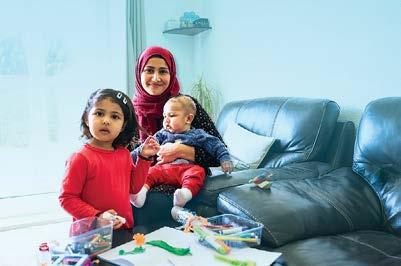
When she needed to help a family friend escape an abusive situation, Zena Chaudhry learned quickly about the realities of navigating the shelter system for Muslim women. Seeing the microaggressions, lack of sensitivity and absence of accommodations for religious and cultural practices, she knew something had to change. And that’s when Sakeenah Homes (now Sakeenah Canada) was founded.
Sakeenah Canada strives to provide the essential support and services that empower women to become healthy, independent and thriving members of society. This charitable organization has come a long way since its inception in 2018. Starting with just remote casework services, it now operates nine transitional homes nationwide and shelters in Toronto, Brampton, London, Montreal, Ottawa, Winnipeg, Regina and St. John’s, as well as the first long-term housing project for Muslim women and children located in Windsor, Ontario.
Sakeenah Canada’s transitional shelter program consists of a plethora of services designed to help women with every facet of their journey toward independence. The process starts when a client calls in and is assigned a caseworker. If needed, she and her children receive immediate shelter in a transitional home. Along with receiving food, shelter, essentials and therapy in the home, women work with their caseworkers to build up their life skills and education, get access to the legal resources they need and are even offered reconciliation services, when appropriate.
Caseworkers also connect women with employment, long-term housing opportunities and to the diverse network of mental health therapists and counselors. The existing child and youth programs offer holistic support with age-appropriate programs in the areas of socio-emotional learning, social and
life skills, mentorship and more. Chaudhry and her growing team are seeking to change the nature of social work services and fill the gaps to uplift people in all circumstances. Sakeenah Canada also offers remote casework and mental health services, as well as an innovative food program to tackle food insecurity: The People’s Market — full of cultural foods, halal meat, dairy products, fresh produce and non-perishable
to the needs of all children, lasts for three to six months. While the agency welcomes children of all faiths and cultures, it prioritizes equipping foster families with the necessary tools and support to provide the best possible care on all levels. Sakeenah regularly hosts community outreach programs to recruit more foster families, partnering with masjids and local organizations. To date, over 300 Muslim families have shown interest and
In essence, Chaudhry’s pioneering efforts are not just about changing the foster care system, but about creating a more inclusive and supportive environment for all children. With Sakeenah Foster Care leading the way, the future looks brighter for Muslim children in Canada and beyond.
items available in a traditional food bank setting — is set up like a grocery store so they can shop in a dignified manner. Since its inception, the market has served over 2,800 families and distributed over 160,000 food items. It hopes to expand its service to a second location later this year.
The next critical gap the organization is working to fill is foster care. As North America’s first licensed foster care agency for Muslim children, a status it achieved in 2022, its goal is to ensure that Muslim children in the foster care system receive culturally and religiously sensitive care in a safe and loving environment. From receiving halal food and accommodating observances like Ramadan, to respecting beliefs and attire, every child deserves to feel safe and secure in his/her foster home.
The journey hasn’t been easy, for it also involves trying to dismantle the Muslim community’s apparent distrust of children’s aid agencies. The Children’s Aid Society’s recent accreditation of Sakeenah Foster Care has gone a long way to mitigate some of this distrust.
The process of becoming a Sakeenah Foster Care foster family, which involves comprehensive training and sensitivity
many have begun taking the steps toward becoming foster families.
Beyond the basic requirements, Sakeenah Foster Care, recognizing the trauma of placement changes, provides mental health services and financial assistance for extracurricular activities, thereby ensuring that these children feel included and supported within their communities.
Looking ahead, Chaudhry envisions slow and steady growth and establishing a strong presence in Ontario before expanding to other provinces. However, her goal extends beyond borders; she hopes to bridge the gap in the U.S. as well, ensuring that every child who needs a foster home can find one that respects and understands his/her cultural and religious identity.
In essence, Chaudhry’s pioneering efforts are not just about changing the foster care system, but about creating a more inclusive and supportive environment for all children. With Sakeenah Foster Care leading the way, the future looks brighter for Muslim children in Canada and beyond.
Find out more at: www.sakeenahcanada.com ih
Ameena Fatima is a freelance writer.
BY ABDULLATIF BAKBAK AND MOHAMMED

Many of our ummah’s historical traditions, among them the waqf (religious endowment), have been forgotten, diminished or transformed over the centuries. This cornerstone of Islamic civilization represents a generations-long noble charitable act via the donation of property or any fund-generating asset for public utilities and other acceptable purposes. The first waqf was established during the Prophet’s (salla Allahu ‘alayhi wa sallam) lifetime — a grove of 600 date palms whose proceeds fed the poor in Medina.
This institution gradually expanded to include healthcare and then education, encompassing the construction of educational buildings, libraries, teachers’ salaries and student scholarships. At the pinnacle of Islamic civilization, the ummah was a global leader in the sciences, arts and astronomy largely because of this independently funded system.
Funded by the wealth of Caliph Harun al-Rashid, the waqf established Baghdad’s Bayt al-Hikma (the House of Wisdom), a renowned library and intellectual center in 830. Morocco’s Al-Qarawiyyin, founded in 859 through Fatimah al-Fihriyah’s waqf, is the Muslim world’s oldest university and attracted scholars from across the globe. Sultan Nizam al-Mulk established a waqf for free education through the Nizamiyyah Institutes, which became the medieval world’s largest university network. Waqf institutions flourished during the Abbasid, Ayyubid and Ottoman periods, leading to the establishment of thousands of schools, libraries and universities.
This system’s financial independence allowed scholars to pursue their intellectual endeavors without the constraints of political or economic pressures. The resulting academic freedom fostered an environment of innovation and discovery, leading to significant advancements in various fields and contributing immensely to the spread of Islamic knowledge and culture.
According to the Yaqeen Institute, colonization and subsequent post-colonial nationalization projects severely undermined waqfs. The decline began after the Ottoman Empire’s postWWI collapse, which marked the end of a significant era for Islamic governance and societal structures.
The post-World War II era saw a wave of decolonization and newly independent Muslimmajority nations trying to rebuild and redefine themselves. In many cases, their nationalization policies placed waqf properties under state control, a move that resulted in a significant loss of financial autonomy for many Islamic educational institutions.
While establishing waqfs is rare among North Americans Muslims today, there are inspiring examples of organizations or individuals who have done so. But these are typically set up to build mosques. Toronto’s Olive Tree Foundation, founded by Muneeb Nasib to manage endowments to support community initiatives, is a notable exception — it focuses on
impactful research and creative projects.
Another exceptional example is the Dr. Lamia Ben Jemaa Endowment, which supports education. Her story is a powerful testament to the waqf sys-
from Tunisia in 1986 aged 18 and armed with a prestigious scholarship from the Canadian International Development Agency’s Technology Transfer program, she earned her master’s and doctorate in electrical engineering — with distinction — from the University of Toronto. As a professor at Seneca College, she inspired countless students with her passion for engineering and innovation.
She also dedicated 35 years of her life to nurturing and developing Canada’s Muslim community by playing a pivotal role in its
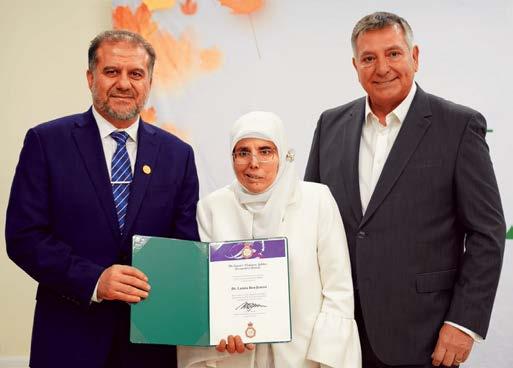
Ben Jemaa’s life and legacy highlight the profound impact that one individual can have. Her dedication to education serves as an inspiring example for Muslims in North America and beyond. By reviving the traditions of Islamic history and supporting Islamic education, her endowment will continue to uplift and benefit the ummah long into the future.
Association of Canada’s (MAC) Al-Huda Schools, she was at the forefront of developing Islamic education in this country.
After a courageous battle with cancer, Ben Jemaa passed away on Sept. 27, 2023. Her will surprised her family and friends: She had generously donated a substantial part of her estate to establishing a waqf to support Muslims seeking education.
Understanding that education is among the most important long-term investments for us and at the heart of community development, for years she sought to ensure that no young Muslim was ever deprived of an Islamic education due to a lack of accessibility and affordability.
The reality is that Islamic education today is not easily accessible. It’s often costly for the average family, and Islamic schools don’t even come close to meeting the demand. In fact, most established Islamic schools have no openings left. For instance, Mississauga’s Olive Grove School, a MAC-operated elementary school, has a waiting list of 3,000+ students.
The capital cost of building a school is enormous and typically relies on community donations, which are often directed toward constructing mosques or responding to humanitarian disasters.
tem’s revival and its potential to bridge Islamic tradition with modern educational needs.
Ben Jemaa’s life story has inspired many. After arriving
development, women’s empowerment and advancing education. As chairperson of the Olive Grove School’s managing board and manager of the Muslim
As social norms evolve, young Muslims face challenges to their religious identity and values. This has led to a growing number of families seeking an Islamic education for their children. They recognize the importance of an environment that not only provides academic excellence, but also nurtures Islamic values and teachings. However, the current infrastructure and funding models are insufficient to meet this rising demand.
This waqf was Ben Jemaa’s effort to ensure that the community’s educational needs are met, thereby promoting
ongoing societal growth and progress. Managed by her family through an Islamic Sharia-compliant investment portfolio, its returns are entrusted to MAC to support Islamic education. These include funding tuition for full-time and weekend Islamic students, post-secondary education and research that advances the nation’s Muslim community. Her waqf has inspired friends and community members to match her donation, thereby amplifying the fund and its impact.
MAC, a leader in Islamic education, operates full-time Islamic elementary and high schools across Canada, Quran academies, Islamic weekend schools and other educational programs through its mosques. This vision is exemplified by its recent establishment of the nation’s first registered Islamic college authorized to grant bachelor’s degrees in Islamic studies.
While MAC operates its own education fund to support families, it is far from achieving the level of accessibility needed to make Islamic education available to all students, akin to the tradition at the pinnacle of our ummah’s success. MAC believes that Ben Jemaa’s effort is a model that many could replicate to ensure that the community’s educational needs are met sustainably and inclusively.
Ben Jemaa’s life and legacy highlight the profound impact that one individual can have. Her dedication to education serves as an inspiring example for Muslims in North America and beyond. By reviving the traditions of Islamic history and supporting Islamic education, her endowment will continue to uplift and benefit the ummah long into the future. Through her extraordinary efforts, Ben Jemaa has laid a foundation for others to follow, bridging the rich heritage of waqf with the modern needs of Islamic education. Her story reminds us of the enduring power of charity and the limitless potential a waqf provides for future generations. God willing, this sadaqa jariya will continue to benefit the ummah long after her time. ih
Abdullatif Bakbak is the president-executive of the Muslim Association of Canada and former principal of its Olive Grove School.
BY MUHAMMAD AZAM
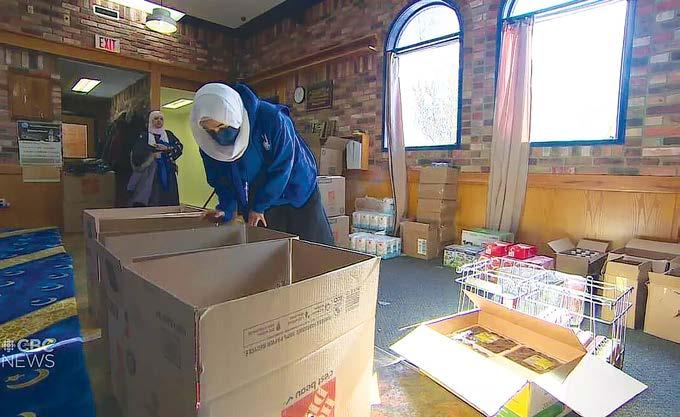
The Muslim Aid of Saskatchewan (MAS), located in the capital city of Regina, is a community-based organization committed to offering support with food and a capacity-building program to those in need.
“Serving the Community With Excellence” was one of the many guiding principles that brought MAS to light in November 2021. With the support of locals, physicians and academics, it was officially registered as a nonprofit in Saskatchewan in January 2022. Volunteers are its essence and soul, for they run all its programs and activities.
Community members engage their peers in its initiatives in part through the continuous recruitment of new volunteers through their X and Instagram pages by extending invitations to forthcoming food drives. The diverse hard-working team — 100+ Muslim volunteers at all school levels — is helping reduce food insecurity in the city’s downtown region. It also collaborates with Carmichael Outreach, Islamic Relief Canada, the Muslim Student Association of the University of Regina and other wellknown programs.
Among its programs, MAS offers the Weekly Food distribution, the Monthly Food Hamper drive, the Shifaa program and Winter Kits. The Weekly Food distribution, which takes place every Saturday from 11:00 am to 1:00 pm in downtown Regina at the Darul Falah Islamic Centre, offers prepared lunch kits containing sandwiches, juice and fruit. Thanks to the volunteers and community donors, MAS has delivered 8,000+ meals so far.
The Monthly Food Hamper drive, held on consecutive Saturdays, provides hampers of eggs, oil, pasta, flour, tomatoes, meat and other food items to low-income students, individuals and families. Started in November 2022, this critical program now supports about 100 recipients, offers essential sustenance and supports families living below the poverty line.
The Shifaa program, inspired by the Arabic term shifaa (healing, cure and recovery), consists of mental health practitioners and professional counseling associates in psychology and social work. Working alongside the Canada-wide Muslim Food Bank,
it offers mental health services related to addiction, migration and racial trauma, as well as surviving domestic abuse and violence. The involved professionals seek to fill a gap in existing counseling programs.
When the city is experiencing harsh winter weather, volunteers distribute Winter Kits that include pillows and sleeping bags, deodorant, toothbrushes and toothpaste, socks and underwear, gloves and hand warmers. These items not only provide warmth, but also promote health and well-being, offering dignity and support to those facing challenging conditions.
for serving as a steadfast distribution hub. Their unwavering support fuels their mission to spread kindness and alleviate hunger. In the sacred month of Ramadan, they felt the warmth of community spirit growing stronger as it’s a time when generosity flourishes, and the bonds of solidarity deepen.
“When the weather gets tough, our volunteers get tougher. If you’ve ever found yourself daydreaming about the prospect of encountering superheroes in reality, I invite you to look at our volunteers,” said one of the
As the temperature dropped almost to -50C [-58F], the dedication of our MAS heroes increased to 100 percent.
MAS’ weekly and monthly programs have had a significant impact. Their monthly food hampers are carefully curated to include most necessary groceries. They take into account the feedback they receive and feel that the encouraging words are what keeps them going. In the heart of our community, Saturdays radiate with compassion as dedicated volunteers convene for the MAS’ weekly food distribution.
In the bustling streets of Downtown Regina, volunteers didn’t just distribute meals; they shared moments of solace and nourishment, igniting hope in every heart they touched. They extend their heartfelt appreciation to Knox-Metropolitan United Church for graciously opening their kitchen doors and to Darul Falah Islamic Centre
BY IMAM ABDALLAH YOUSRI

Torganizers. “As the temperature dropped almost to -50°C [-58° F], the dedication of our MAS heroes increased to 100 percent. Alhamdulillah, MAS’ dedicated volunteers showed up in downtown Regina despite the extreme cold warning to warm hearts and fill bellies.”
In essence, MAS is a beacon of community support and solidarity in Regina. With each act of kindness and assistance, volunteers not only address immediate challenges, but also foster a sense of dignity and resilience among those individuals it helps. Through joint efforts and unwavering dedication, this team embodies the spirit of compassion and is enriching the lives of countless individuals across Saskatchewan. ih Muhammad Azam is assistant director at the Kumon Math and Reading Learning Centre.
he idea of establishing an Islamic radio station has been an aspiration for more than 10 years within the Halifax Muslim community. Earlier attempts to bring this vision to life didn’t materialize for various reasons. But despite these setbacks, the community’s determination and persistence never waned.
The Covid-19 pandemic, which led to the mosque being shut down for weeks, was a turning point. The lockdown ignited individual members’ renewed determination to make the radio station a reality, highlighting the need for a continuous connection with the community even in times of physical separation. After two years of dedicated planning and effort, the dream has finally been realized. Broadcasting from a small room of the Ummah Mosque, its impact reaches far beyond its modest origins.
The team at Ummah Society
in Halifax achieved a significant milestone by launching One Ummah 107.5 FM, Canada’s first Islamic FM radio station. The broadcasts, which started at the beginning of Ramadan 2022, marked a pivotal moment for local Muslims, not just as a means for religious programs, but also as a bridge-building tool fostering deeper connections and unity with everyone in the community and beyond. The inspiration behind the initiative was the following hadith: Prophet Muhammad (salla Allahu ‘alayhi wa sallam) said, “Whoever introduces a good practice in Islam, there is for him [and her] its reward and the reward of those who act upon it after him without anything being diminished from their rewards until the Day of Judgment” (Reported by al-Nisa’i in “al-Mujtaba: Kitab al-Zakat, Bab al-Tahred ‘ala al-Sadaqah”).
The response has been overwhelmingly supportive. Many
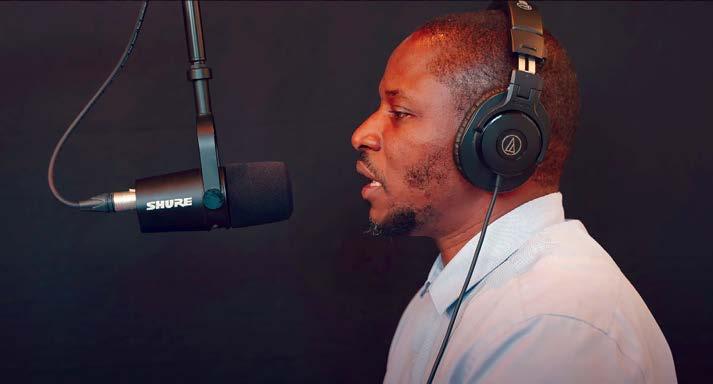
We hope that the One Ummah FM radio channel inspires many other Canadian communities to follow our example.
have expressed their gratitude for the station and their interest to get involved, stressing how it helps them feel more connected to their faith and the broader Muslim community. The ability to tune in from home has been especially beneficial for those who cannot attend the mosque regularly due to health, work or other commitments.
Two particularly memorable moments stand out in the station’s journey. First, the unforgettable feeling of hearing the Quran broadcast for the first time while driving through the small city of Halifax. This powerful moment filled my heart and the hearts of many other Muslims, and naturally those who worked on the project, with immense pride and joy. Many took videos of themselves capturing this historic experience, sharing their excitement and gratitude.
Second, installing the antenna on top of the Ummah Mosque’s minaret — Nova Scotia’s first minaret. Youth and community members gathered to witness and capture this significant event, celebrating not just an achievement, but also a profound cultural and religious milestone.
Initially operating solely during Ramadan, the radio station served as a vital tool for local Muslims — they could hear the adhan live in their cars and homes, connecting them with the mosque during iftar and allowing them
to listen to traditional Ramadan nasheeds. Plans are underway to expand its operation to a 24/7 schedule by 2025, with a dedicated team to oversee this initiative.
The station’s programs are being planned to meet our diverse audience’s needs, such as offering content in multiple languages. In addition to religious content, One Ummah Radio also serves as a platform for cultural exchange and education. The goal is to educate both Muslims and non-Muslims about Islam and Muslims’ contributions to Nova Scotia and beyond. By doing so, the station plays a crucial role in promoting understanding and harmony.
The station also has plans to expand its reach by developing a dedicated mobile app, which will make it even easier for listeners to tune in from anywhere. These technological advancements ensure that One Ummah Radio remains accessible and relevant in an increasingly digital world.
The station’s journey has just begun, but its potential to enrich the spiritual and communal life of Halifax’s Muslims is immense. As it grows, it promises to become a central fixture in the community’s daily lives, fostering a stronger, more connected and informed community.
We hope that the One Ummah FM radio channel inspires many other Canadian communities to follow our example. ih Abdallah Yousri is the imam and executive director of Ummah Society, Halifax, Nova Scotia.
BY SANA SAMDANI
From April 20 to May 17, Maryam Sinclair lit up Toronto with her presence. The international master storyteller of s acred events and award-winning author of “The Bowing of the Stars: A Telling of Moments from the Life of Prophet Yusuf” (Kube Publication, 2024) and “When Wings Expand” (The Islamic Foundation, 2013) held audiences spellbound.
For over five weeks, Sinclair sparked hundreds of listeners’ admiration for the Quran. Her works center on the oral retelling of the qasas al-anbiya’ (stories of the prophets) and have been reviewed and approved of by Shaykh Ali Hani (head instructor, the SeekersArabic Program at SeekersHub Global) and Grand Mufti Salman al-Qudah (Jordan), Mufti Taqi Usmani (Pakistani jurist and leading scholar), Shaykh Hamza Karamali (founder and creator, “Why Islam is True”) and Shaykh Abdullah Anik Misra (instructor and researcher, sacred law and theology, the SeekersGuidance: The Global Islamic Seminary).
“The Fall of the Tyrant” was Sinclair’s second tour in Toronto, where she captivated a variety of audiences through her star performance of “Tyrants Do Fall — Prophet Musa (‘alayhi as-salaam) and the Fall of Fir‘aun [Pharaoh].” Local listeners joined the global group of participants in admitting that this was their very first vivid encounter with Prophet Musa’s story. Indeed, as Sinclair mentions, “When you hear, you will see.”
Through her immersive storytelling experience, listeners are transported to the living, continual realities

Through her immersive storytelling experience, listeners are transported to the living, continual realities from Moses’ story. Consider the themes of oppression, genocide and rejection of Allah that we still encounter in the foreground of the Nakba.
accuracy and contagious passion, as well as motivate youth to read the signs in the decadent archaeological preservation of Fir‘aun…: “Ya Bani Mustafa, we must hear this story being told to us. We must heed the warnings being given to us…”
The response to Sinclair’s performances has been overwhelming, precisely because she illuminates timeless lessons on faith, resilience, justice and courage. Her dynamic delivery left a lasting impression on many. An elder led a group of attendees in takbirat at the end of “Tyrants Do Fall” and added, “The way you express yourself… It is impressive. Allah has blessed you and I think you should continue this task of narrating these stories.”
Children aged nine and ten ran up to her as she was leaving a school to say thank you for doing a great job. At a masjid event, a young girl shared that she was inspired by Sinclair to tell stories in her upcoming role as summer camp counselor. A mother wept at Sinclair’s portrayal of the sweet struggle of Musa’s mother as shared the struggles of her own nursing and postpartum journey. “Parents were in love,” mentioned a sister as she reflected on how mesmerized families were with Sinclair’s presence. An educator shared how her performance deeply resonated with him and that her work was crucial for everyone.
interactive children’s session on her published picture book, “A Trust of Treasures.”
Her last event, presented in collaboration with local sacred storyteller Bano Murtaja (mentor, educator and volunteer teaching assistant, Dar al Zahra), featured research for her story “Take Heed,” the post-Exodus story of Musa and Bani Israeel — a pertinent reminder given the ongoing genocide against our Palestinian brothers and sisters.
Sinclair invited the audience to “allow for the stories of the Quran to pour into [our] hearts.” This tour was the beginning of what she hopes will be an ongoing conversation on how to deeply connect with the Quran, its stories and lessons.
Through her art, Sinclair also asks us to revisit the possibilities presented by oral storytelling. What’s it like to have a community gather to deeply listen together for the sake of God? What might it mean to have a culture of deep shared listening? With the presence of over-digitalization, she offers the enduring power of oral storytelling as a tool to relate deeply with each other, the Quran’s stories and warnings … and, ultimately, with Allah.
“Ya Bani Mustafa, we must hear this story being told to us. We must heed the warnings being given to us…
from Moses’ story. Consider the themes of oppression, genocide and rejection of Allah that we still encounter in the foreground of the Nakba. From the dream of Fir‘aun up until the splitting of the sea, Sinclair teaches us that this story is not a static series of past events, but part of our present reality: “Ya Bani Mustafa, we must hear this story being told to us.”
Her listeners do more than simply hear. With over 40 years of narrating these stories to live listeners worldwide, Sinclair is adept at eliciting audiences’ interest and participation. It’s worth noting that her performance resonated with people of all ages. She can easily persuade children to adopt the persona of a pyramid-building mason, entrance adults by her level of
This is the rare talent of Maryam Sinclair — a versatile speaker. As such, she successfully conducted unique programs during this year’s Toronto Tour, including a keynote address on the recovery process of the body of Fir‘aun, a book talk on her award-winning text “The Bowing of the Stars,” a storytelling training workshop for teachers at the Islamic Schools Association Conference and an
From the One who made us all And sent the Holy Quran…” The Fall of the Tyrant — Toronto Tour 2024 was co-sponsored by Basira Education, Seedlings of Jannah and Friends of Maryam Sinclair. Gratitude goes to the volunteers and hosting families who helped make this event a success. ih
Sana Samdani is the founder and lead teacher of Seedings of Jannah. She is an experienced Ontario certified teacher of French Immersion and Biology (K-12).
Note: The italicized text is from Sinclair’s lyrics for the nasheed “Ya Bani Mustafa,” sung by children in her audiobook version of the “The Fall of the Tyrant.” Sinclair is relating “The Fall of Fir‘aun.”
BY AHMAD KHODR
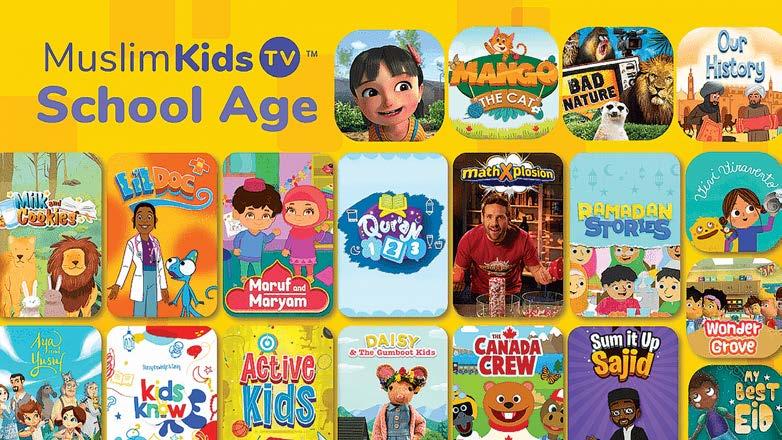
Muslim children and teens naturally face immense pressure to assimilate into the culture around them. According to a 2016 study “From Islamophobia to Identity Crisis: Internalized Oppression Among American Muslim Children,” by Aaser, S. H. of Noor Kids, 1 in 3 children does not want to tell others they are Muslim. So, what price are you willing to pay to keep yours on the straight path with a strong Muslim identity?
The team at MuslimKids.tv, one of the first Muslim video streaming services, says that its members are willing to go the extra mile to keep their children on the right path.
Within the media realm, $1 million is almost an intangible amount. For example, “Paw Patrol: The Mighty Movie” had a budget of over $40 million, Typical movie budgets often exceed $100 million.
For MuslimKids.tv, $1 million is a significant start and a blessing to launch “Time Hoppers: The Silk Road,” the company’s first 3D animated cartoon. The series will launch
on the MuslimKids.tv streaming service in Fall 2024, followed by a feature film adaptation (available in 2025).
What is uniquely Canadian is that much of the funding has come through Canadian production industry incentives. “The biggest challenge for media professionals developing Muslim content is the funding,” said Michael Milo, a revert to Islam and the CEO of MuslimKids.tv. “Being a media company in Canada means that a significant part of our budget can come from government and private production incentives, [thereby] lessening the burden for the community to financially
actor Omar Regan, YouTube star Ali Ardekani (Baba Ali) and world-renowned teacher Sheikh Kamal El Mekki.
Time Hoppers is the story of four gifted children from Vancouver’s Aqli Academy in the year 2050. When Abdullah, Aysha, Khalid and Layla stumble upon the ability to time travel, they are thrust into an adventure along the Silk Road during the Golden Age of Islam — traditionally dated from the 8th to the 13th century. They must save the great scientists of that era from an evil time traveling alchemist named Fasid.
“It was incredibly important to ensure that the project is directed to children,” said writer and director Flordeliza Dayrit, also a revert. “Muslim children’s media often misses this mark, and [thus] kids aren’t engaged.”
support the full budget of a project.”
These incentives are often unavailable to media producers in the U.S. and elsewhere. Canada recognizes that showcasing voices from every background is something uniquely Canadian.
Anyone who has been around Muslim media over the past decade knows that quality is always a concern and that many parents cringe when we hear “Muslim cartoon,” given that their quality never seems to match mainstream cartoons. “Time Hoppers” hopes to break this stereotype.
The preliminary materials look amazing, and the project brings together a cast of some of the most well-known Muslim scholars and influencers: world-renowned scholar Dalia Mogahed, Hollywood
“Time Hoppers” is shaping up to be a hit with both parents and kids. Parents will love the educational and cultural value as our heroes not only explore the Islamic Golden Age, which laid the foundation for many modern scientific and cultural achievements, but also embody Islam’s values and ethics.
Each episode is rooted in historical accuracy, which is led by two researchers — Munir Shaikh (vice president, Bayan Islamic Graduate School) and Hassam Munir (research fellow, Yaqeen Institute).
Kids will also love the immersive historical worlds and cast of eccentric Muslim scholars and scientists. As Director Dayrit explains, “The project is historical fiction where we tried to bring to life these amazing role models for kids. So, we took some artistic liberties to make the characters as lovable and memorable for children as possible.”
From al-Khwarizmi, the father of algebra, to Fatima al-Fihri, who founded the Muslim world’s first university,
these personalities are all woven into the narrative. They beautifully celebrate our own role models on the big screen!
The protagonists were also crafted to provide characters they can relate to as heroes. Aysha, the group’s martial artist, is the embodiment of “girl power” who breaks the docile Muslim girl stereotype. Layla, the introspective one, is on a hero’s journey to overcome her shyness and face the challenges of defeating the evil Fasid. Khalid, the “khalulator,” is the group’s brainiac and Abdullah, the street-smart one, keeps the humor alive.
The series’ importance extends beyond its
planning a unique way for kids to watch the series with screening events in movie theaters across North America and the U.K., starting in the fall of 2024.
“We know families love the movie theater experience but dread the surprises that show up in children’s movies today,” stated Dayrit. “We want to give parents peace of mind when they take their kids to the movies.”
The “Time Hoppers” team is actively looking for a lead sponsor for the screening tour and hopes to connect with masjids and schools at the grassroots level to hold screening events nationwide.
As parents, we all worry about the negative influences and questionable role models surrounding our children. From social media influencers almost worshipping materialism to fictional superheroes claiming to be “gods” and “goddesses,” the current media landscape is a minefield.
educational content. Its ultimate purpose is to instill a sense of pride in Muslim heritage, challenging the mainstream media’s countless stereotypes and providing a platform on which young Muslims can see themselves reflected in positive, influential roles.
“Getting ‘Time Hoppers’ produced is just half the battle,” states Milo. “Distribution and getting the project in front of audiences is the next major challenge. We believe the show will be loved by all children, not just Muslims. We will see if we can overcome the bias in mainstream media that wants to silence Muslim voices, making distribution that much more difficult.”
Fortunately, “Time Hoppers” on MuslimKids.tv, works just like Netflix. You pay a monthly access fee, available on smart TVs, mobile apps and the web. MuslimKids. tv is likely one of the community’s most wellkept secrets. The streaming service, which has been around since 2016, boasts over 8,000 videos and is a “must-see” for every Muslim parent.
The team behind “Time Hoppers” is also
As the past months have so vividly demonstrated, Muslims must take control of their own voices in the media. Organizations like MuslimKids.tv are the first step toward media independence.
Here are some suggestions to help promote this great media initiative.
Subscribe to Muslim Kids TV. The collective power of a modest $10 monthly subscription results in a major Muslim media initiative. We hardly think twice about dropping $10 for fancy coffee.
Launch screening events. Be an advocate, take the initiative and bring this experience to your community. Your kids will love it and thank you!
Download for FREE. Time Hoppers is also accompanied by an interactive game (RPG), now available to download via web (STEAM), iOS and Android. Download it today.
Share this project. Amplify “Time Hopper” by visiting time-hoppers.com and engaging with @muslimkids.tv on social media platforms. ih Ahmad Khodr (BA ’18, McMaster University) is the marketing lead at MuslimKids.tv..
The United States National Institute of Mental Health (NIMH) provides the following overview:
“Mental health includes emotional, psychological, and social well-being. It is more than the absence of a mental illness—it’s essential to your overall health and quality of life. Self-care can play a role in maintaining your mental health and help support your treatment and recovery if you have a mental illness.” (https://www.nimh.nih.gov/health/ topics/caring-for-your-mental-health)
ISNA Mental Health (IMH) aim is to provide tools, advice, training and mentoring with a focus on preventive approaches to mental illness. The contents to be presented at IMH website will include articles, books, and documents written by psychologists, psychotherapists, and scholars on Islam. The target audience are Muslims who are involved in mental health issues for themselves, and those raising tender age children and teenagers.
“With the right approach, mental health problems of all kinds can be prevented,”states a report by the UK Mental Health Foundation authored by its Director Dr Antonis Kousoulis. (https://www.mentalhealth.org.uk/sites/ default/files/2022-09/MHF-Prevention-andmental-health-report.pdf)
ISNA Mental Health Advisory Group
• · Salman Shaheen Ahmad, University of Miami, Ph.D. candidate in clinical psychology
• · Dr. Merranda Marie McLaughlin, Massachusetts General Hospital (MGH)/ Harvard Medical School, clinical fellow
• · Dr. Saadia Ahmad, Western University and private practitioner, Clinical Neuropsychology.
• · Dr. Siham Elkassem, University of Windsor, School of Social Work and Clinical Therapist at Affia Wellness
• · Dr. Ibrahim Mohammad, resident physician in psychiatry, University of Toronto and research intern at the Stanford Muslim Mental Health and Islamic Psychology Lab
• · Dr. Kathy Bullock, University of Toronto Mississauga, Political Science.
• · Marwa Mahmod, Naseeha Mental Health, Registered Psychotherapist and Director of Programs
Those interested to availing IMH services, please contact the IMH Convenor Dr. Syed Imtiaz Ahmad, Eastern Michigan University, Emeritus Professor, Information System, Imtiaz.Ahmad@emich.edu.
BY WENDY DÍAZ
The groundbreaking documentary film “New Muslim Cool,” produced by PBS, debuted in 2009 and offered a glimpse into the lives of Hamza and Suleiman Perez, two Puerto Rican American brothers who embraced Islam during the late 1990s. Fifteen years after the film’s release, the brothers, particularly Hamza, have evolved from youth to influential community leaders.
Nevertheless, a non-Muslim audience who comes across it through streaming services such as Amazon Prime would never know about Hamza Perez’s growth beyond the film. Even if a curious spectator scans the internet for more information, news articles, video clips and academic papers focus mostly on his life in 2009. “New Muslim Cool” continues to be used as an educational tool in classrooms worldwide. However, his post-documentary growth and impact on his local community deserves more recognition.
Cradling his newborn grandson in a Facebook post, the grinning Hamza looks vastly different from his depiction as one of the infamous Mujahideen or M-Team duo performing revolutionary hip-hop vocals while wielding machetes portrayed in the documentary. He sports a gray pinstriped thobe, a burgundy velvet fez hat and noticeable traces of henna color the tips of his salt and pepper beard. Although visibly more mature, his demeanor remains vibrant and youthful.
“‘New Muslim Cool’ was released in about 2009, but we really started filming in 2004, so that is a 20-year stretch. A lot has changed,” Perez said. Indeed, plenty has changed for Latin American Muslims in the U.S., whose visibility has steadily increased since 9/11. A Pew Research Center demographic portrait of Muslim Americans from 2011 reported that 6% of U.S. Muslims identified as either Latino or Hispanic. In 2022, the Institute for Social Policy and Understanding’s (ISPU) American Muslim Poll found that 9% of the approximately 3.5 million Muslims in the U.S. are Latino — approximately 315,000. As
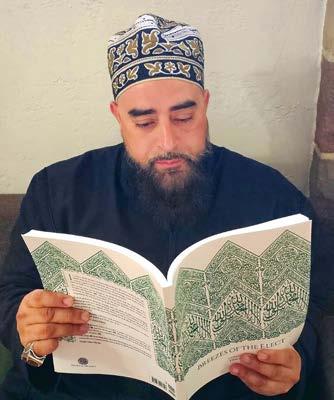
more Latinos convert or are born into Islam, Muslims who converted in the late 1990s and early 2000s are aging into new roles.
“New Muslim Cool” followed the Perez family as they settled in Pittsburgh and navigated the intersections of Puerto Rican urban culture and new Muslim identities. During filming, Perez got married, had his third child with then-wife Rafiah and the FBI raided the Light of Age/North Side Mosque, which he helped co-found.
Perez has since divorced and remarried in 2011, and is now the father to a total of eleven children. He recently became a grandfather after his eldest son Ismail, who appears in the documentary, started a family of his own.
Shortly after the film’s international success, he stopped performing and left the music industry to focus more on religious studies. His mother, who seemed to show concern and even disapproval for Perez’s decision to abandon his Christian upbringing, converted, along with his father, grandparents and other extended family members. Perez traveled to West Africa to study Islam, received certifications in religious sciences and became an imam. He attributes his personal growth to the study of Prophet
Muhammad (salla Allahu ‘alayhi wa sallam). Although the audience sees a dedicated Perez beginning to study and even teach Islam to the inmates at his local prison in “New Muslim Cool,” he was still in the initial stages of his conversion. He moves from Massachusetts to Pittsburgh to start a new life with his family. The post-9/11 atmosphere of suspicion presents a series of hurdles to his professional and spiritual growth. His career as an outspoken rapper and songwriter calling for revolution and rebellion haunts him as he begins working in the prison system as a chaplain.
Perez begins studying Islam in depth at the local mosque and attempts to distance himself from some of his songs’ contentious lyrics. These initial stages of his evolution are portrayed in the documentary film, but the audience is left with a half-hearted portrayal of the Latino convert experience.
He believes that the Muslim experience for Americans in general, and for Latino Muslims in particular, differs from that of foreign-born Muslims. He now feels like he’s more connected to his Islamic identity than his culture after having been Muslim for over a quarter of a century.
Media coverage and academia often focus on the “phenomenon” of new conversions and ignore the presence of decades-old converts as well as second- and third-generation Latino Muslim families. Harold Morales, author of “Latino and Muslim in America: Race, Religion, and the Making of a New Minority” (Oxford University Press, 2018) said, “There is so much more to Latino Muslims than conversion, yet this is the most dominant emphasis in news stories on Latino Muslims. The myopic focus on conversion is evident through a quick reading of headlines.”
Converts like Perez and his family, who accepted Islam a few years prior to or after 9/11, have now been Muslim for over two decades. And yet they rarely receive any attention from the news or academia on how their roles have changed.
“I’m very respectful of my family’s culture, and I teach certain aspects of it that are good, but I don’t compromise on the aspects of it that are haram and toxic,” Perez said. “Islam is everything to me, and it is way more important to me than being Puerto Rican.” He cautions against prioritizing cultural heritage over Islamic principles. Emphasizing Islam’s core importance in his life, Perez urges
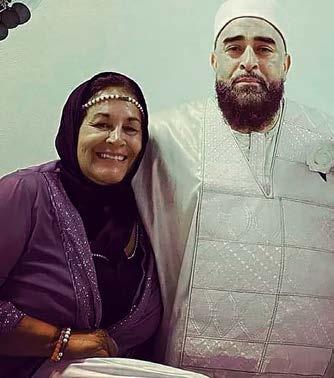
His mother, who seemed to show concern and even disapproval for Perez’s decision to abandon his Christian upbringing, converted, along with his father, grandparents and other extended family members.
fellow Latino Muslims to uphold its teachings above all else and not to compromise religious beliefs for cultural acceptance. Perhaps motivated by Latino Muslim resonance with Islamic Spain, he encourages them to study works like “Ash Shifa” (Diwan Press; 7th ed., 2010; trans. Aisha Bewley), written by Andalusian scholar Qadi Iyad ibn Musa al-Yahsubi (d.1149-50) to deepen their understanding of Islamic principles and prophetic manners. Perez envisions a transformative potential if Latino Muslim leaders prioritize spiritual purification and sincere intention above all.
Shortly after the release of “New Muslim Cool,” Perez was permanently barred from the jail in which he interacted with inmates as a Muslim chaplain. However, his outreach work did not end there. For over two decades, he has been instrumental in pioneering initiatives to uplift children, particularly those from Pittsburgh’s low-income neighborhoods. His work as the coordinator of BOOTUP (Building Our Own Technology, Uplifting
People) and establishing the Ya-Ne Youth Alliance for Networking and Empowerment at the Islamic Center of Pittsburgh highlight his dedication to empowering youth through education and mentorship.
When a young Perez detached himself from music completely after “New Muslim Cool,” he cited concerns for his spirituality. Surprisingly, M-Team’s controversial Clash of Civilizations album is still available on platforms like Spotify. However, this former M-Team member is far removed from the militant lyrics from 2005. Twenty years later, his primary focus is community building, social welfare and peaceful dialogue.
In an April 14 Facebook post, Perez wrote, “Our community consists of 98 percent converts who have dedicated their lives to helping spread and teach Islam.” Attached to his post was a crowdfunding drive for Masjid Anisa, the “First ever ‘Built from The Ground Up’” mosque in Pittsburgh, home to many reverts or converts.
A closer, unbiased exploration of Latino Muslims’ lives reveals that they are indeed more than their conversion stories. A decade and a half after the documentary graced the screens, Perez has transitioned from a seemingly overzealous and admittedly “ignorant” youth to an indispensable leader and mentor to hundreds of fellow Muslims and non-Muslims, both Latino and non-Latino.
The story of Hamza Perez reflects a broader trend within both the Gen X and Millennial Latino Muslim communities. Across these generations, numerous converts have emerged as influential figures, assuming roles as imams, educators, advocates and social servants.
Echoing the words of Morales, “The new generation will read about the historical and cultural links between Latino ethnicity and Islamic religion from websites and social media and from journalists and scholars. They will be a new kind of Latino Muslim, one whose central narrative will lie beyond the scope of conversion.”
By leveraging their unique backgrounds and experiences, Gen X and Millennial Latin American leaders are shaping the present landscape and laying the groundwork for a vibrant and more inclusive Muslim American community. ih
Wendy Díaz is a Puerto Rican Muslim writer, poet, translator, and children›s book author. She is the Spanish content coordinator for ICNA-WhyIslam. She is also the co-founder of Hablamos Islam, a nonprofit organization that produces educational resources about Islam in Spanish.

BY KHAWAJA AZIMUDDIN
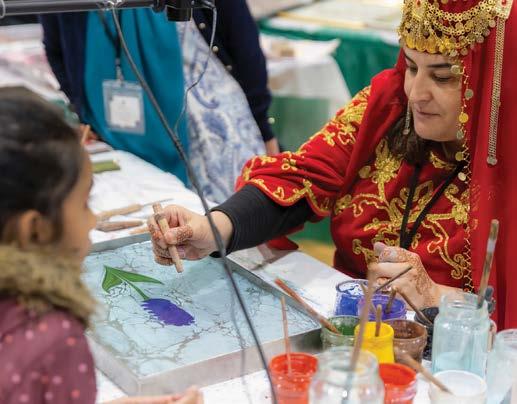
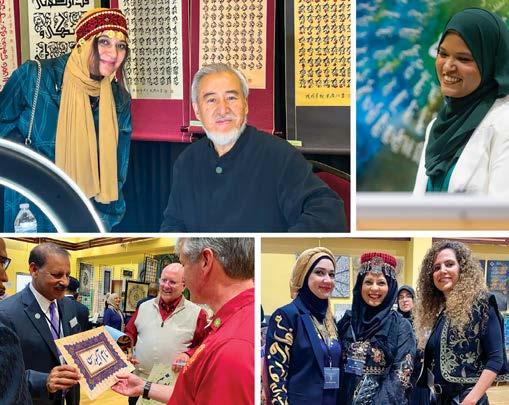
The Islamic Arts Festival, a unique and unparalleled celebration, stands as the largest and oldest of its kind in the U.S. Drawing in visitors and artists from all corners of the country, it has cemented its position as the Americans’ go-to destination for Islamic art enthusiasts.
Houston’s nonprofit Islamic Arts Society (IAS) has organized this festival since 2014 to share this rich heritage. During the
Muslims. Art is a common language and binds diverse communities. By promoting Islamic arts, the society hopes to promote mutual understanding and bring the broader American community together.
Since its humble beginning 11 years ago, the festival has evolved into a national phenomenon. Last year, it welcomed over 6,000 visitors, many of them non-Muslims who learned about Islamic traditions in a friendly and artsy environment. The festival brings people of all ages, ethnicities, and faiths together for two days of fun, festivity, and learning.
This year’s event, to be held on Nov. 9-10 at the University of Houston, will be even grander than previous years due to its enhanced programs and expected attendance.
“This is a significant milestone for IAS, as we transition f rom our suburban location to the heart of the city at the University of Houston, a move that will amplify our reach and enable us to introduce Islamic art to a wider American audience,” said Shaheen Rahman (president, IAS).
interactive art sessions and live demonstrations of calligraphy, henna tattoos, ebru, and paintings will further enrich the immersive experience.
Featuring 50+ artists and 5,000+ pieces of Islamic art, the festival will have something of interest for everyone, regardless of age. Almost every form of Islamic art — paintings, illumination, calligraphy, ebru, henna, ceramics, woodwork, glasswork, and metal art — will be displayed and available for purchase.
Last year, the festival brought together some of the biggest names in Islamic art — Haji Noor Deen, Behnaz Karjoo, Paul Barchilon, Jennifer Usman, and Moina Sajjad — allowing them opportunities to network, collaborate, share ideas, and inspire one another. Other prominent artists who have participated in our events include Elinor Holland, Josh Berer, Nihad Dukhan, and Muhammad Zaman.
Covid-19 pandemic, it was held online.
The IAS arranges art events, lectures, and workshops to celebrate Islamic culture and promote a positive image of
The 2024 festival will feature a captivating live nasheed (religious song) performance by the Al-Firdaus Ensemble from Spain. And as always, Preacher Moss and his team will make the audience laugh with their stand-up comedy show. The event will also host a film festival spotlighting Islam in the U.S., a spoken art program, and an academic seminar organized in collaboration with the University of Houston’s Kathrine G. McGovern College of the Arts. In addition to the the extensive visual art display,
“The Islamic Arts Society’s Festival is a unique experience in the American landscape — nowhere else is there a coming together of this scale and breadth of artists exploring the many mediums of Islamic arts,” said Josh Berer, a famous calligrapher in his own right and a student of the celebrated calligrapher Muhammad Zakariya. “As an Arabic calligrapher, being invited to the festival was one of the great honors of my career. The connections and friendships I made among the other artists at the festival I will hold for the rest of my life,” he added.
The participation of schoolchildren is evidence of IAS’ commitment to nurturing the next generation of artists. Each
Since its humble beginning 11 years ago, the festival has evolved into a national phenomenon. Last year, it welcomed over 6,000 visitors, many of them non-Muslims who learned about Islamic traditions in a friendly and artsy environment. The festival brings people of all ages, ethnicities, and faiths together for two days of fun, festivity, and learning.
year six Islamic schools are invited. Supervised by the IAS, they organize an internal competition that is evaluated by a three-judge panel. Their winning art pieces are displayed at the festival. Through such initiatives, the IAS aims to instill the love of Islamic art in these children.
Several concurrent workshops are held. In 2023, illumination artist Behnaz Karjoo from New York and geometric artist Paul Barchilon from Colorado held classes. IAS believes that teaching Islamic art is key to preserving our rich heritage of arts and culture. Young and adult students not only learn about the artistic forms of expression during these workshops, but also benefit from a broader understanding of the philosophical and spiritual interconnectivity between art and Islam.
During the festival, a dedicated children’s art program, overseen and supervised by esteemed institutions like the Museum of Fine Arts Houston, the Children’s Museum of Houston, and the Asia Society engage young attendees in coloring Islamic arabesque and geometric patterns, bead making, creating geometric patterns, writing calligraphy, and similar activities.
Ultimately, the festival celebrates Islam’s rich artistic and cultural heritage, creates a sense of belonging and identity among attendees, and brings people together by fostering social cohesion and strengthening community bonds. In addition this event serves as a melting pot, for many non-Muslims attend our event and experience the beauty of our traditions through art. The event’s organizers believe that showcasing Islamic art to the American public is the best way to oppose Islamophobia and correct the negative stereotyping of Islam and Muslims. Visitors are amazed to see Islam’s beauty through art and take away a very positive impression of Muslim traditions and culture. ih
Dr. Khawaja Azimuddin, a gastrointestinal surgeon in Houston, is an avid ceramic tile artist. Many of his large-scale murals are installed in public places. He uses his passion for the arts to help build bridges between communities. To achieve this goal, he founded the Islamic Arts Society, a 501 (c)3 nonprofit that aims to share the rich heritage of Islamic art.
BY SANAA ASIF
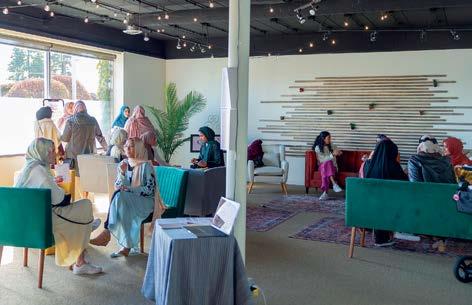
In this rat-race-like existence, Muslim women sometimes find it hard to balance work, family, and religion. More women are pursuing full-time careers after marriage and children. Yet the bulk of household duties still fall on them, a reality that leaves little time for uninterrupted worship. In addition, not all mosques have welcoming spaces for women and/or children.
Thus the emergence of women-led Muslim community centers has been a w elcome development. Two prime examples are the Rabata Cultural Center (www.rabata.org), which has a heavy online presence and an in-person center in Arden Hills, Minn. — about eight miles from the downtowns of Minneapolis and Saint Paul — and the Aisha Fatima Community Center (AFC; aishafatimacommunity. org), which offers in-person classes and social gatherings in Chicago’s suburb of Lombard. Both organizations aim to build and reinforce spiritual knowledge and community through
positive cultural change through creative educational experiences,” Sekusky said.
AFC started off with brainstorming sessions, involving input from women of various ages, backgrounds, and stages in life. They used the feedback to curate their programs. “We always knew that the core of AFC would focus on spirituality and religion, but we really wanted to incorporate and integrate discussions of taboo topics within the mental health field, the community health field, women’s wellness and health,” Kholwadia explains.
deen-centered, female-focused learning and activities.
“The inspiration for AFC basically came from the lack of Muslim women’s physical spaces, where we can interact and learn from female scholars, and also build community,” said co-founder Juwairiyah Kholwadia (founder, The Hijab Vault; https://thehijabvault.com/).
Their main goal is to create a warm, welcoming and non-judgmental environment to integrate both the old and new communities of Chicago’s suburbs and provide a safe space for them to learn and grow together.
Rabata, from the Arabic words “to connect,” “form bonds of friendship,” and “composure,” had a similar starting point. Manager Michelle Sekusky describes how Anse Tamara Gray, EdD (founder, Rabata), an Islamic scholar, author, educator, and popular speaker, became inspired after noticing a void in women’s needs. “Education is really a key to positive cultural change, which is our vision and mission statement. It’s creating
For instance, in June they convened a session about the Islamic views on cosmetic procedures. In addition to faith and learning, they also host social events such as watercolor night, geometric design workshops, and tatreez classes to give women a chance to connect.
Rabata had a similar journey, evolving from a simple bookstore to a center for in-person and hybrid programs. Their academic wing, Ribaat, has dozens of courses, classes, certifications, and ijazahs to choose from. “We went from just having random events to now having multiple regular monthly events. We also offer childcare for women taking classes,” Sekusky added. Rabata’s very ethnically diverse all-women board of directors feels more representative of our ummah’s diversity than many other centers — even mosques.
Each day brings new experiences. “Truthfully, no day looks the same, even if it’s the same event,” Kholwadia states. However, some days need to be split between events and administrative work. Their planning days
are more of a mental workout during which they focus on program ideation, creation, marketing, and registration. They reach out to their team to find the right instructor or connect with others to collaborate. They like to plan events ahead of time. For instance, Ramadan planning begins roughly six months in advance.
“We’re continuously looking for ways to improve and expand our offerings,” Kholwadia notes. “We welcome anyone who would like to join the AFC admin or volunteer team. We are actively looking for women with interest and knowledge of marketing, event planning, outreach, and fundraising.”
On the other hand, event days look very different. “On the day of an event, we’ll typically arrive 1 to 3 hours early. Volunteers help move tables, chairs, and even sofas to accommodate the crowds. AFC often provides refreshments and snacks during its events, which also need to be picked up. They also need to set up any technical equipment and other resources the presenter may need.
“Most importantly, we’ll have people ready to greet every attendee as they walk in, so they have someone to connect with even if they came alone,” Kholwadia remarks. Throughout the event, the team continuously makes sure attendees are comfortable and have everything they need.
As female-focused community centers develop a wider audience and attract larger crowds, they also experience both successes and obstacles. A major obstacle both centers faced was increasing their staff base. Sekusky started managing Rabata in 2021. At the height of the Covid-19 pandemic, much of its programs were online. But

Rabata and AFC strive to make women feel welcome and seen, whether through their programs or their environment.
“Our teachers have dedicated their lives to being ‘forever students’ and knowledgeable teachers. They have studied traditionally and from so many paths that you’re learning from a well-rounded female scholar who is knowledgeable in whatever field of Islam she’s teaching,” Sekusy says.
as the center continued to grow, many programs started becoming in-person. “In 2022 we grew so much at the Center that we were able to expand into the space next door. But as fast as we grew, we needed more people, right? Getting great staff always takes time,” Sekusky says. Rabata now also offers Rabateen classes for teenage girls and Dragonflies for 6–12-year-olds.
AFC has similar struggles. While they love their volunteers, they also know it’s hard to expect them to commit to something long term. Another issue was that people were asking for virtual programs, even though at its core AFC was all about their physical space. “We really wanted women to come out and get to know each other and learn
busy parents, college students, or working individuals.
However, Sekusky also observes the appeal of in-person programs for others. “You find different crowds in different spaces — some people really need that social aspect; especially reverts need that family and bonding.” Overall, she sees value in both the online and in-person communities.
The AFC staff believes that the speaker plays a valuable role in attracting audiences. They have their regular speakers, to whom a lot of women have listened. Many attendees have a favorite speaker they connect with, and if they see her name they are quicker to register. “We really like to focus on the content of our events and want our attendees to feel a sense of personal development, but also [for them to] enjoy the space,” Kholwadia remarks. “Everybody loves food. Whenever we invite outside vendors with fancy bubble teas and coffee, it’s a hit. It’s great because we also get to support other small Muslim businesses within the community.”
in person,” Kholwadia explains. While they stayed true to their mission and continued encouraging in-person attendance for events, AFC also started hosting some virtual events to expand their presence nationwide.
As both community centers have continued to grow, they have learned to adapt to their audience’s preferences. Sekusky says that the online Rabata Academic Institute (www.facebook.com/rabataribaat/) attracts a wide variety of people. “It’s a serious program to dive into Islamic studies, and the reason I think it’s attractive for most of the students is that online classes are recorded,” she states. Having the flexibility to watch a lesson at a more convenient time can be attractive to
Rabata and AFC strive to make women feel welcome and seen, whether through their programs or their environment. “Our teachers have dedicated their lives to being ‘forever students’ and knowledgeable teachers. They have studied traditionally and from so many paths that you’re learning from a well-rounded female scholar who is knowledgeable in whatever field of Islam she’s teaching,” Sekusy says. The wide variety of programs covered through Rabata and the welcoming, humble teachers play an important role in helping Muslim women located all around the nation gain knowledge and community. ih
Sanaa Asif, a senior at Hinsdale Central High School, is an avid reader and loves to learn and write about others and their experiences.
BY ANIME ABDULLAH
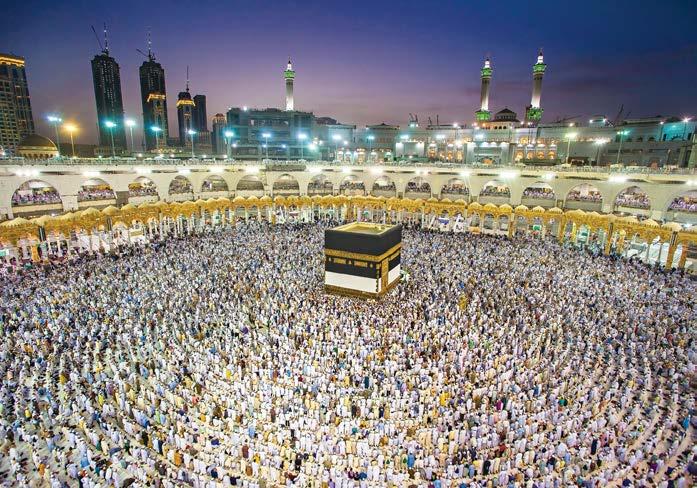
Did you hear about the seismic tremor of faith that shook the sands of Makkah as the tide of pilgrims across the world converged upon the Ka‘ba in June 2024?
The scorching sun, exceeding 122°F (50°C) from June 14-19, was overshadowed by millions of Muslims thrumming in unison and demonstrating submission to God, humility, and unity — Islam’s true essence. The death of over 1,300 from heatstroke and dehydration, and the heat-related illnesses of thousands more (Aya Batrawy, www.npr.org, June 23) couldn’t deter them. The Saudi host’s inadequate accommodations, transportation, or even drinking water (Zahra Fatima and BBC World Service, www.bbc.com, June 22) couldn’t prevent them from responding to Islam’s call. Only a minuscule 8% received the needed care (Magdy Samaan, www.cnn. com, June 25), which confirms these pilgrims’ unwavering faith.
However, beneath their radiant display of peace were those who exploited them. Given that the pilgrims aren’t too vocal about such things, every year the unscrupulous prioritize profit over piety. This has gradually eroded the hajj’s sanctity, with creeping commercialization peaking this year, albeit ambivalently portrayed.
Shirking responsibility, Saudi authorities sweepingly attributed 80% of the hajj fatalities to “unregistered” pilgrims (Vivian Nereim and Emad Mekay, New York Times, June 24), who didn’t register via the problematical Nusuk — a centralized web platform (https://hajj.nusuk.sa/) launched in 2021 by the Saudi Ministry of Hajj and Umrah.
However, Western pilgrims still had to handle visas, hotels, air tickets, and evident troubleshooting through Nusuk, all without human assistance. This tedious and overwhelming digital odyssey also increased prices (ranging from $13,000 to $20,000 per head), required deposits months in advance (even before packages were available), and provided no guarantee of completion. If this registration process fails at any step, even due to Nusuk’s fault, a 1.5% refund fee and a 45-day waiting period apply. Moreover, Nusuk’s proffered autonomy unintentionally hinders the hajj spirit — the connection forged through shared experiences.
These are merely the procedural problems of the current 11-step registration process; technical issues aside. Logins work only when the system wills. Picking a package is
more like pulling teeth. Verification delays or e-wallet dilemmas are not user-friendly, and the payment option is an act of faith itself. The demands on time, tolerance, and tech-savviness, along with the paramount uncertainty, are enough to make a saint swear or, in this case, seek alternative routes.
Promising “alternative” streamlined processes, dozens of hajj agencies rushed to rescue this year’s pilgrims. They undercut the Nusuk prices, but dangled the carrot of tourist or business visas (legality? Shhh, don’t mention it!).
Many of these agencies have provided affordable and reliable services for decades, and their promised convenience was very tempting. They guaranteed no pesky registration, verification woes, package or flight selection hassles, and, most importantly, no “pre-paying months in advance without any certainty” nonsense. Who wouldn’t jump at that oasis?
Over 325,000 unregistered pilgrims were expelled (Adil Faouzi, www.moroccoworldnews.com, June 10), and other thousands, if not a million, pilgrims continued without registering with Nusuk. Many, including myself, succumbed to the illusion, not knowing those promises were a desert mirage shimmering with cool water.
The unresolved Nusuk issues and the substantial number of unregistered pilgrims underscore the prevalent frustration and escalating demand for reliable alternatives. The proliferation of alternative agencies, further misled by the insiders within the Hajj ministry, is a direct consequence that I witnessed firsthand.
The anticipation of a trouble-free hajj quickly turned into a chilling fear of human trafficking as I was put on a backroad to Makkah and forced to cross the desert corridor on foot. Promises of a streamlined experience were replaced by constant anxiety and uncertainty. Many pilgrims couldn’t even make it to Makkah and returned home (Christian Peña, www.yahoo.com, July 1).
Upon reaching Makkah, I clutched my Nusuk permit, the golden registration ticket. Unaware of its illegitimacy, I eagerly prepared for Mina. Lacking legitimate permission, my U.S.-based agency merged with a South Asian hajj group, whose tent was already overcrowded. So, we huddled outside
under the blistering sun, desperately seeking the shade that wasn’t there. To my surprise, a security guard spotted me, informed me that my Nusuk permit was useless. Expelled from the tent, I wandered around Mina like a lost soul in a spiritual Disneyland.
Unfamiliar with Mina’s premises, I contacted my group leader. Bless his frantic heart, he offered dubious advice: avoid security, catch a bus in the middle of the night to Arafat, and pray for the best. Like a drowning man grasping at a straw, I did so, only to bounce among Arafah’s tents like a game of leapfrog with security. Exhausted, sunbaked, and barely coherent, I spent the
No official permit to return to Mina obliged me to find refuge in my hotel for the remaining stoning rituals. While Islam offers leniency in dire situations, my predicaments stemmed from the agency’s illegal acts, which fostered a false sense of security until the final minutes.
These are just tidbits, and such realities don’t belittle the hajj’s sanctity. However, the humiliation, deception, and constant betrayal forced a touch of dark humor into my experience. It serves as a cautionary tale for future pilgrims as well as a plea to hajj officials to acknowledge the pilgrims’ rising desperation.
Luxury and convenience, and the growing focus on opulent accommodations, carefully curated packages, and modern amenities, have overtaken spirituality. Even tawaf, traditionally a moment of communing with God, is now often overshadowed by the urge to capture and share the experience. This disturbing trend reduces hajj to a mere commodity and Makkah to a meticulously crafted commercial product.
Day of Arafat muttering supplications under the relentless, blazing sun.
As we prepared to leave for Muzdalifah at sunset, there was no transportation. After waiting six hours — until 2:00 a.m. — we landed on a purgatory bus ride, praying for divine intervention to reach Muzdalifah in time for the maghrib and isha prayers. Nothing happened. We barely made it to fajr and offered make-up prayers for maghrib and isha.
Already sleepless and drained for the past two days, we began the arduous trek to the Jamarat, a relentless 4-6 miles. Like a churning mass of humanity teetering on the edge of a stampede, the first round of stoning left me dehydrated, disheveled, and missing a sandal.
Yet the ordeal wasn’t over. No transportation awaited, forcing another 3-4 mile trek back to Makkah on foot. Although several Nusuk service centers were visible from Muzdalifa or Mina to Jamarat, none were found from Jamarat to Makkah; not even drinking water.
Beneath this year’s surface grief due to deaths and tragedies lingers a somber shadow in the Muslim collective memory, a gradual shift that’s transforming Islam’s spiritual cornerstone into a commercialized spectacle.
Historically, Makkah thrived as a commercial hub and pilgrims engaged in modest trade to offset their journey’s costs. But today, a starkly different narrative unfolds. The Saudi government and corporations have poured billions into erecting five-star hotels, opulent malls, and designer boutiques. In contrast, no significant visible efforts have been made to alleviate the pilgrims’ suffering in Arafah, Mina, Muzdalifa, or the Jamarat rituals — the pilgrimage’s most strenuous tenets — even for the Nusuk-registered ones. This tragic reality has slowly shifted the hajj’s focus from spiritual renewal to tourism, severing pilgrims’ deep-rooted connection to Islam and ceasing its spiritual essence.
Luxury and convenience, and the growing
focus on opulent accommodations, carefully curated packages, and modern amenities, have overtaken spirituality. Even tawaf, traditionally a moment of communing with God, is now often overshadowed by the urge to capture and share the experience. This disturbing trend reduces hajj to a mere commodity and Makkah to a meticulously crafted commercial product.
The responsibility rests on the pilgrims, due to their growing consumer demands, and the Saudi government, whose recent prioritization of hajj as a revenue stream next to oil (Abbas Al Lawati, www.cnn.com, July 6) overshadows its spiritual dynamics.
Nusuk, an enabler of pilgrims’ convenience, has indeed benefited many of them. However, it shouldn’t be constricting pilgrims. Its always-late release (2-3 months before hajj) causes unnecessary uncertainty. For example, pilgrims must spend sleepless nights to secure their desired packages and flights. Precious pre-hajj soul-searching moments are sacrificed to addressing logistics and amenities. Moreover, it ultimately defies the pilgrimage’s essence: detaching oneself from earthly entanglements to invest in godly endeavors.
The hajj is not isolated from daily religion or rituals that may require such grand tourist exposure, like luxury hotels. Rather, it’s the culmination of one’s achieved spiritual maturity. Leaving worldly affairs behind, hajj is a chance to reflect on one’s shortcomings with a promise to purge them and restore the highest connection with God so that one can return home with a pure and resolute heart like a newly born person. Current socio-cultural settings challenge such an essence of pilgrimage.
However, hope is still there. This trend of commercialization is just a few decades old. Traditionally, pilgrims were welcomed as “Guests of Allah,” with no mandatory packages or labeled groups. Their hearts still beat with reverence and longing for the Divine, waiting to flourish, as was evident during this year’s hajj. We must not allow the passage of time to erase that spiritual pulse of pilgrimage. Let the administration, religious authorities, and travel agencies work with each other to preserve the sanctity of hajj in the sands of Saudi Arabia to avoid tension or tremor, and foster unity, piety, and a transformative experience for all pilgrims, as it has been for centuries. ih
Anime Abdullah is a freelance writer.
BY TARIQ AHMED
Just about everyone who has not cloaked his/her head in the proverbial sand acknowledges that Kashmir’s political history is a litany of betrayal, manipulation, massive state-sponsored structural and militaristic crimes, as well as human rights violations. All this has been enacted by the rulers, politicians, political and military establishments and India’s nationalist media warriors against a hapless people demanding an end to the settler-colonial occupation of their land.
Repression, erasure, disempowerment, invisibilization, a devious combination of assimilationist and eliminationist strategies, along with dehumanization of the subaltern Kashmiri and appropriation of Kashmir’s history, have been foundational to and constitutive of India’s settler-colonization project.
These violations, described by international legal luminaries as “crimes against humanity,” have surpassed the threshold of crimes under international law. The Office of the High Commissioner for Human Rights has observed, “Impunity for human rights violations and lack of access to justice are key human rights challenges in the state of Jammu and Kashmir.”
Nonetheless, the international community has largely watched in silence, much as they have done in the case of the ongoing genocide in Gaza. In unwitting ways, these amount to sanctioning India’s occupation of Kashmir and the genocide in Gaza.
Kashmir’s landscape simmers with unease and indignant resignation. Military bunkers, concertina wires, unmarked mass graves, a panopticon of digital surveillance and militarized medical spaces and schools dot the landscape. The people’s memory is soaked with the countless rapes, killings, blinding, murders, tortures, disappearances and imprisonments.
Fear permeates every corner of the people’s lives. Indian authorities have targeted human rights advocates, journalists, academics and civil society members in the occupied colony. Its obsession with entrenching the occupation means that India shows no interest in any form of transitional justice that addresses the root causes of the long-standing discontent
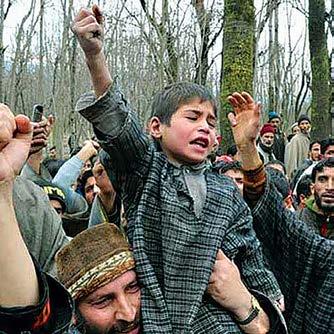
and ends egregious human rights violations and impunity for killing, maiming and silencing dissenters. A settlement-colonization enterprise cannot afford such concessions.
Several journalists — some of whom have won Pulitzer awards — have been detained, tortured or denied their right to travel abroad by confiscating and canceling their passports, as detailed in a recent report by the Kashmir Law and Justice project titled “They Should Be Beaten and Skinned Alive: The Final Phase of India’s War on Kashmir Civil Society” (March 21, https://www.kljp.org/).
The family of prominent human rights advocate Khurram Parvez has endured harassment and incessant house raids during his incarceration in India’s high-security prison. Listed among Time magazine’s 100 Most Influential People of 2022, Parvez has been described as the “modern-day David” who has been “silenced, for his voice resounded around the globe for his fierce fight against human rights violations and injustices in the Kashmir region” (Rana Ayyub May 23, 2022, https://time.com).
Several academics have been expelled from their university positions and incarcerated. Measures against academics and scholars include close surveillance, intimidation and harassment. For raising Kashmir at a conference 14 years ago, Dr. Sheikh Showkat (principal, Kashmir College of Law) was charged with sedition.
In what Haley Duschinski and Sankar Gosh have described as “occupational constitutionalism,” the ruling Hindu nationalist party of Prime Minister Modi has unashamedly politicized the law and legalized repression in Kashmir. The colonizing authorities have used several laws to suppress Kashmiris and justify repression, including the Jammu and Kashmir Public Safety Act, 1978 (PSA) and the Armed Forces (Jammu and Kashmir) Special Powers Act, 1990 (AFSPA).
PSA is the primary tool used against dissenting voices to justify capricious and prolonged incarceration. Amnesty International describes it as “lawless law.” Military administrations use the AFSPA, the other equally brutal tool, as a sword and a shield to suppress dissent while shielding themselves from accountability. The law provides them with the cover of impunity.
In contravention of international humanitarian and human rights laws, the state privileges the AFSPA and PSA over India’s Protection of Human Rights Act (1993) and the Universal Declaration of Human Rights (1948). Detention without trial for two years under the PSA violates fundamental principles of justice such as equality before the law, formal charge sheets, due process and access to counsel. Those police and military personnel who misuse this instrument of suppression to win medals for killing dissidents are never held accountable.
Athar, 16, along with two other civilians, was killed in a staged police encounter during December 2020. A counter-terrorism charge was filed against his parents and other family members when they demanded the deceased’s corpse.
The military authorities are utilizing technology-assisted surveillance and predictive tools against Kashmiris as a means of force-multiplying their physical repression. They require that CCTV systems must be installed in businesses, filmed daily and submitted to authorities.
With this unmistakable digital panopticon, the Kashmiris will be surveilled for alleged anti-Indian activities in public spaces and any mass mobilization attempts by people already besieged at gunpoint.
Amnesty International’s (AI) India office has been blatantly targeted by New Delhi for highlighting the human rights situation in India generally and in Kashmir specifically. As a result of police intimidation and legal harassment, the UN Special Rapporteur asked India, among other things, to provide proof of allegations against AI, the legal basis for government action and demonstrate that the government will ensure human rights
activists, including lawyers, operate in a conducive environment without fear of threats or acts of intimidation and harassment of any kind. Indian authorities have intimidated, harassed and detained Kashmiri poets and musicians. Despite being hunted by the government forces, these activists have chosen to go underground to continue making protest music.
As India’s lawyer community shuns Kashmiri students across India, vigilante groups and law enforcement abuse, harass, intimidate and kill them equally brutally. Among the flimsiest charges against the students are their alleged or actual celebrations of Pakistan’s T20 World Cup victory over India.
Weaponized media is the most incred-
minimizes Kashmiri political resistance and justifies dubiously legalistic and excessively militaristic retaliation as a legal response to the assumed “threatening law-and-order situation.” In Kashmir, any challenge to Indian hegemony is hideously portrayed as a threat to India’s national security and territorial integrity.
Despite what India would have the world believe, the petitioning of national security and preventive incarceration laws against Kashmiri dissenters is not an exceptional and extraordinary or extra-constitutional measure. These cherished cutting-edge tools with which they chisel the settler-colonial Hindu state are constitutive of and integral to their Brahminical colonial-settler enterprise.
Despite what India would have the world believe, the petitioning of national security and preventive incarceration laws against Kashmiri dissenters is not an exceptional and extraordinary or extraconstitutional measure. These cherished cuttingedge tools with which they chisel the settler-colonial Hindu state are constitutive of and integral to their Brahminical colonial-settler enterprise.
ible soft repression tool. The nationalist press reframes resistance as anti-national. Rather than deliver the facts as they are, allowing for a more neutral and in-depth analysis, the media manufactures the consent of unsuspecting Indians for military violence against Kashmiris by invoking terrorism and generating anti-Kashmiri and anti-Pakistani sentiment.
Settler-colonial authorities have designated and then banned several resistance groups as unlawful associations. Labeling them as such is meant to stigmatize, discredit and delegitimize them, thereby undermining their recruitment and any attempts at mass mobilization.
As a result of this preemptive repression, paramilitary personnel defile, harass, watch, prohibit, detain, torture and kill members of such organizations to increase the costs of supporting the resistance to Indian rule.
In denial, the colonizing power uses police and army spokesmen as objective purveyors of the reality on the ground,
Through its deceitful political maneuverings and brutal militaristic doctrine, the Kashmiri political-military establishment has elevated Kashmiris’ resentment to a point beyond repair. Court-sanctioned repression, glamorized by its cabal of anti-Kashmir and anti-Pakistan rhetoric in the media, has stifled all voices of colonized territories.
As Kashmiris are portrayed as pro-Pakistan (and therefore anti-Indian) agents, state-sponsored violence is justified. With its ever-evolving repressive regime, the state has lost its claimed moral authority to rule Kashmiri hearts and minds.
India’s goal is to hold Kashmir forever, even if that means keeping it at gunpoint. The asymmetrical power relations in Kashmir make Kashmiris vulnerable to colonizers on all three levels: materially, mentally and physically. For them, a long haul is ahead. They are digging their heels in for now. ih
Tariq Ahmed is a freelance writer.
Nothing
BY GHULAM NABI FAI
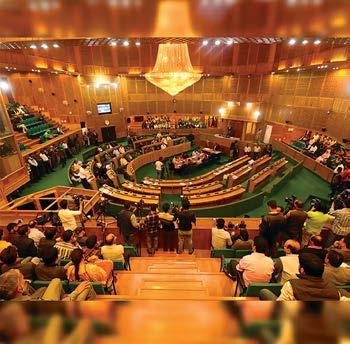
The
Displaying a calculated and considered callousness and insensitivity to the Kashmiris’ wishes and aspirations, Indian Home [interior] Minister Amit Shah announced (following a Supreme Court’s Dec. 12, 2023 order) that “[The] Assembly poll will be held in Jammu and Kashmir before September 30, 2024” and that “BJP believes in winning hearts” (Ravi Krishnan Khajuria, Hindustan Times, April 16). The Indian Election Commission has proclaimed a two-phased parliamentary election schedule: in Jammu on April 26 and in the Srinagar constituency on May 13 in four phases. Chief Election Officer of J&K Hirdesh Kumar said on Aug. 17, 2022, that “We are expecting an addition of (2 to 2.5 million) new voters in the final list,” including non-Kashmiris living in the region (Reuters, Aug. 17, 2022).
Today, India confronts a Kashmir Rubicon in terms of electing members to its rubber stamp parliament. If it boldly conducts free, fair, and transparent elections that reflect the inhabitants’ genuine sentiments, then a final peaceful settlement of the 77-year-old conflict will be in sight. If it continues its habit of rigging elections and denying Kashmiri self-determination as proclaimed in United Nations Security Council (UNSC) January 1949 resolutions, then Kashmir will remain beleaguered by repression, misery, and destitution.
India’s colonial and antidemocratic ways in Kashmir have a long history. The British philosopher Bertrand Russell said in 1964, “The high idealism of the Indian government
in international matters breaks down completely when confronted with the question of Kashmir.”
Jayaprakash Narayan, known as “The Second Gandhi of India,” confided to former Prime Minister Indira Gandhi in 1960, “We profess democracy but rule by force in Kashmir… [The Kashmir] problem exists not because Pakistan wants to grab Kashmir, but because there is deep and widespread political discontent among the people” (“Why we must listen to Jayaprakash Narayan on Kashmir”, Ramachandra Guha, Sept. 26, 2016, Hindustan Times).
George Fernandes (d. 2019), a former Federal Minister of Kashmir Affairs, stated at Harvard University’s [now Weatherhead] Center for International Affairs on Oct. 12, 1990, “In so far as the immediate situation in Kashmir is concerned, I feel that we need to go back to 1984, when an elected government was dismissed by Delhi. The dismissal of the government sent [a] signal to the people of Kashmir that any honest decision that they take in regard to the governance of the State could easily be set aside by the power that is in Delhi. Naturally, the anger against Delhi built up. In 1987, there could have been a fair election. Unfortunately, there was not. A lot of people were roughed up. A lot of young people were subjected to considerable humiliation. The Kashmiris felt that Delhi would prevent for all times any expression of [the] people’s will in a fair and objective election. All this created among the youth a sense of total despondency and alienation.”
P. K. Dave, a former chief secretary of the Jammu and Kashmir government, confessed in 1991 that, “Elections in Kashmir have been rigged from the beginning.”
Booker Prizewinner Arundhati Roy remarked on Sept. 27, 2009, “Elections in Kashmir have had a long and fascinating past. The blatantly rigged state election of 1987 was the immediate provocation for the armed upsrising that began in 1990. Since then, elections have become a finely honed instrument of military occupation, a sinister playground for India’s deep state. It is Intelligence agencies more than anyone else who decide what the
outcome of each election will be. After every election, the Indian establishment declares that India has won a popular mandate from the people of Kashmir.”
In his “Twenty Tumultuous Years: Insights into Indian Polity,” Shri Prakash writes, “The Kashmiri anger actually began with the mass rigging of elections in 1987...” (p.568; Gyan Publishing House, 2003).
Amy Waldman wrote in the New York Times that “Rigged elections in Kashmir in 1987 helped trigger the armed uprising that
might attempt to take to determine the future shape and affiliation [of Kashmir]” would be no surrogate for Kashmiri self-determination.
The following steps need to be taken to make a referendum happen:
First, demilitarizing the state on either side of the ceasefire line.
Second, creating an atmosphere of peace and security.
Third, annulling all draconian laws, especially the Domicile Law, which is designed to change the state’s demography.
Elections in Kashmir have had a long and fascinating past. The blatantly rigged state election of 1987 was the immediate provocation for the armed uprising that began in 1990. Since then, elections have become a finely honed instrument of military occupation, a sinister playground for India’s deep state.”
India estimates has taken more than 35,000 lives” (Aug. 24, 2002).
The 1987 fraudulent elections extinguished the Kashmiris’ last flicker of hope that India would bow to the UNSC-prescribed free and fair plebiscite.
The cure for counterfeit elections is providing the genuine democratic article. Thus, the Kashmiris are eager to participate in the referendum if it’s conducted with the trapping of free and fair choice, monitored, and supervised by a “neutral” agency like the UN.
The status of East Timor was resolved in 1999 by a free and fair vote of the population. The same, championed by the U.S. and the E.U. happened in Kosovo, Montenegro, and Southern Sudan. The solution to Kashmir’s indigenous upheaval is no different. The irresponsible coveting of dignity, liberty, and pride that comes with self-determination knows no territorial or regional boundaries.
The UNSC Resolution 122 of 1957 denounced the Indian elections subterfuge, reminding the concerned governments and authorities “of the principle embodied in its resolution that the final disposition of the State of Jammu and Kashmir will be made in accordance with the peoples’ will expressed through the democratic method of a free and impartial plebiscite conducted under UN auspices.”
The resolution further elaborated that “the convening of a Constituent Assembly … and any action that Assembly may have taken or
Fourth, releasing all political prisoners, including Mohammad Yasin Malik, Shabir Ahmed Shah, Masarat Aalam Bhat, Aasia Andrabi, Khurram Parvaiz, and others immediately and unconditionally.
Fifth, restoring the rights of peaceful association, assembly. and demonstrations.
Sixth, permitting the Kashmiri political resistance leadership to travel abroad without hindrance,
Seventh, satisfying the democratic principles, rule of law, and security for every Kashmiri, irrespective of religious affiliation.
Eighth, deputing an international and neutral team to conduct the referendum.
Kashmir’s suffering is a rebuke to the UN for its inaction. This decades-long situation is a call on the conscience of the UNSC’s members, particularly in the U.S.
A sincere and serious effort toward devising a just settlement must face and deal with the realities of the situation and fully respond to the people’s rights. Indeed, any process that ignores their wishes and is designed to sidetrack the UN will prove to be not only an exercise in futility, but also a source of incalculable human and political damage. ih
Ghulam Nabi Fai is secretary general, World Kashmir Awareness Forum, Washington, D.C. and chairman of the World Forum for Peace & Justice. He can be reached at gnfai2003@yahoo.com, and www. kashmirawareness.org.
[Editor’s note: No sources were provided for some of the quotations, and therefore IH was unable to verify their accuracy.]
BY ISNA GREEN INITIATIVE TEAM
The barbaric and genocidal onslaught in Gaza, among the worst cases of slaughter and destruction in history, has been extensively covered in the media and Islamic Horizons. It now sits in the top quartile of the most devastating bombing campaigns, as evidenced by a group of satellite images taken from the U.S. space technology firm Maxar Technologies (Julia Frankel, Jan. 11, https://apnews.com/).
The coastal territory’s orchards, strawberry fields, and sandy beaches that were once the Gazans’ pride are now a dehumanizing landscape of military bases, craters, and ruins. Two-thirds of the land in northern Gaza was agricultural, but not much of it is left. Israeli bulldozers have razed fields, destroyed centuries-old olive trees, and orchards to clear a buffer zone more than one-kilometer-wide (0.6 mile) inside Gaza along the northern border between Israel and Gaza.
The army has built dikes and earthen mounds to protect its tanks and clear the view. In addition, 2,000 agricultural buildings have been razed — including 90% of all the northern districts’ greenhouses.
According to a June 18 United Nations Environmental Program (UNEP) report, the Gazan slaughter’s environmental impact has created unprecedented soil, water, and air pollution problems that have destroyed sanitation systems. Explosive weapons have generated some 39 million tons of debris. Each square meter of Gaza is now littered with more than 236 pounds of debris. The report also found that water, sanitation, and hygiene systems are now almost entirely defunct, because Gaza’s five wastewater treatment plants are no longer operational.
The UN Office for the Coordination of Humanitarian Affairs says that 67% of Gaza’s water and sanitation system, poor at the best of times, has now been destroyed (Jon Donnison, June 21, www.bbc.com/news/ articles/cd119dz515wo).
A study titled, “A Multitemporal Snapshot of Greenhouse Gas Emissions

from the Israel-Gaza Conflict,” conducted by an international team of researchers and published on June 6, details the significant environmental impact of the ongoing genocide. Co-authored by Benjamin Neimark (senior lecturer, Queen Mary University, London) and Patrick Bigger (research director, the Climate and Community Project), it provides a comprehensive estimate of the ensuing enormous greenhouse gas emissions. This report says the additional emissions associated with rebuilding Gaza are projected to be higher than many countries’ annual emissions (www.researchgate.net/).
Environmental and ecological impacts are among the immense problems that Palestine will have to deal with in the coming decades. The planet-warming emissions generated during the first two months of Israel’s genocidal campaign were greater than the annual carbon footprint of over 20 of the world’s most climate-vulnerable nations. In addition to its water supplies and food security already being threatened by sea level rise, drought, and extreme heat, Israel’s indiscriminate bombing has rendered Gaza’s environmental situation catastrophic.
During this and previous military
campaigns, Israel has prioritized weaponizing water, gas, electricity, and other resources. It has also targeted the environment by destroying essential infrastructure. For instance, during the genocide’s first days, Israel limited Gaza’s water, electricity, and fuel supplies. As electricity and fuel are essential for water pumps and desalination, raw sewage continues to flow into the Mediterranean Sea (Zeinab Shuker, Dec. 19, 2023, www.tcf.org).
Besides the severely damaged public water supply systems, wastewater treatment facilities, and drainage networks, the toxic oil and other chemicals leaking from demolished plants into surface and groundwater has brought risks of soil erosion and triggering long-term health disasters, including sanitation crises and the spread of waterborne diseases.
The rockets and missiles not only cause immediate humanitarian crises, but also have long-lasting hazardous impacts worldwide. Specifically, toxic residues, including those from metals, plastic, and electronic waste, heavily contaminate the soil with widespread pollution. As a result, local agricultural areas will suffer from desertification, soil erosion, and land degradation.
Since 1967, Israel’s military actions have induced the uprooting of over 2.5 million trees — more than one million of which were olive trees — an essential source of income in the region. This ongoing destruction of native trees and crops has worsened the habitat fragmentation of local species and accelerated biodiversity loss and desertification.
Heavy bombardment has not only decreased the amount of human habitat, but has also increased air pollution, as toxic and hazardous compounds are released into the environment from burning buildings and industrial facilities. Green spaces and agricultural land have also been heavily damaged. The generational and other profound health effects in children are unknown. The same goes for how exposure to toxic chemicals affects pregnant women.
Ana Rule, an assistant professor at the Johns Hopkins Bloomberg School of Public Health, told Grist.com, “These microparticles can be kicked up by footfall or vehicles or lofted to other places on the wind” (https://www.scientificamerican.com, Jan. 29). Grist is a nonprofit, independent media organization dedicated to climate solutions and a just future.
Inhaling silica, a key ingredient in cement and glass, also increases the risk of cancer. The long-term projections of cancer and pulmonary diseases will not be known for some time. These typically have lag times. For cancer, it’s 20 to 40 years, a period that could be accelerated by repeat exposures. Intensive bombing, demolition, and damage to multistory buildings has spread huge amounts of cement particles and other particulates over both Israel and Egypt. These will be inhaled by people and deposited on farmland, with as-yet long term and unknown dire consequences.
Air and water pollution, as well as soil contamination, have no geopolitical boundaries and thus also affect global natural resources and ecosystems for generations. Therefore, recognizing the urgency of environmental preservation and ecological responsibility even amid warfare is crucial.
Forty public health scientists have called for an immediate cessation to the violence. The authors have drawn attention to the urgent need to rebuild Gaza’s health care system and restore the physical and human infrastructures that make a livable
environment possible and promote human health and well-being (Environmental Health, June 28).
In addition, these individuals say that environmental remediation should form one of the most important parts of the international effort to assist reconstruction, through which it is hoped lasting peace could be achieved. Health and sustainable development are among the accepted international human rights obligations.
They have also urged that the global community support Gaza and the Palestinians
hotspot, https://tcf.org/). The Mediterranean Basin hotspot is home to about 515 million inhabitants, 33% of whom live on the coasts. But Gaza’s in a weaker position than ever before for providing any of these protections. Any lasting peace in Gaza must go beyond a ceasefire and political solution, difficult as the latter may be to attain. Peace will also require environmental justice.
Given that climate change doesn’t recognize borders and political arrangements, Israel will also experience environmental degradation. For instance, Ashkelon (orig-
Environmental and ecological impacts are among the immense problems that Palestine will have to deal with in the coming decades. The planetwarming emissions generated during the first two months of the war in Gaza were greater than the annual carbon footprint of more than 20 of the world’s most climate-vulnerable nations.
in its post-war recovery and reconstruction, including the rebuilding of the health system, the remediation of environmental pollution arising from Israel’s extensive use of weaponry, and the implementation of population-wide mental health programs to address the current, future, and intergenerational effects of trauma.
Sadly, the quieting of the bombs and guns will merely mark the end of one chapter of Gaza’s suffering. Once this genocide ends, the UN and the international community must find a way to launch and scale up reconstruction and rehabilitation efforts. Such a collective commitment to post-war environmental restoration will contribute to a sustainable and resilient future by rebuilding the linkage of global well-being and environmental governance.
In Palestine, there will be a special need for investment in water storage facilities, both for domestic consumption and agricultural use. Ecosystems will require additional protection, because saltwater will likely push into coastal aquifers. Endemic species are now under threat (Israel and Palestine are part of the Mediterranean Basin biodiversity
inally al-Majdal), a mere eight miles from Tel Aviv (originally Yafa), one of Israel’s desalination plants has been shut down several times during the past few years due to pollution from Gaza. As the genocide will increase the amount of pollution in Gaza, Israel’s water security will also be jeopardized. Without enabling the Palestinians to protect their own environment, Israel cannot protect itself from a cross-border environmental disaster.
The current movement among universities to divest from those companies that produce these armaments and supplies to Israel is encouraging. We, as supporters of peace and justice for the Palestinians and other oppressed people, should raise our voices against producing and profiting from such destructive armaments. A sovereign Palestinian state must be established as soon as possible so that its people can live with dignity, honor, and peace. But this can only be achieved if the U.S. becomes an honest broker. For a lasting peace to hold, environmental justice must be part of any solution. ih
ISNA Green Initiative Team members include Saffet Catovic, Nana Firman, Uzma
and
BY SHEIMA SALAM SUMER
Emergency Rooms and hospitals are filled with people. Doctors’ offices have long wait times. Pharmacies are brimming with medication in every color, size, and shape. Yet some people are still chronically ill. All the medical and pharmaceutical advancements are still not providing complete comfort and cure. That is making some turn to natural medicine that focuses more on a mix of a nutritious diet, exercise, herbs, massage, and acupuncture. Islamic Horizons asked some Muslim doctors and patients about their experiences with natural medicine.
Mohammad Ayubi, a board-certified psychiatrist in Jacksonville, Fla., believes that Muslims should consider using natural medicine, if it’s based on sound knowledge.
“I believe we’re now in a time when conventional medicines are the standard and override alternative medicine. The Prophet (salla Allahu ‘alayhi wa sallam) said that for every illness there is a cure (“Sahih Muslim” 2204). At that time there were no pharmaceutical companies. That means there was a cure in the natural world. Honey — even water if you blow on it and say Surah al-Fatiha — could be a cure.”
Salman Khan, an internal medicine doctor based in Richmond, Va., believes that alternative medicine should be considered only if its evidence based. “It needs scientific rigor,” he stated.
“Muslims should consider alternative medicine because it is the way of the Prophet,” said Jawad Bhatti, a medical doctor and alternative medicine practitioner from Midlothian, Va., who has studied natural medicine. “Ibn Qayyim al-Jawziyya’s ‘al-Tibb al-Nabawi’ [Prophetic Medicine] recommends natural medicines from different plants and foods.”
One of Dr. Ayubi’s patients is a 40-year-old army veteran. He had major pain issues — chronic pain which started in the military after extensive abdominal surgery. He had complications, so the doctors gave him a lot of opioids and conventional medications. He

became dependent on them and then was discharged from the military while addicted to these pain killers. He also had bipolar disorder from childhood.
“When he came to me, he was always depressed, even suicidal,” Dr. Ayubi said. “He’d overdose accidentally or intentionally on his opioid medications and then would end up in the hospital. I looked at his chart and realized that he had never been given a good trial of lithium. Lithium is a metal and it’s natural. It’s the lightest metal in the periodic table. It comes as a salt — usually lithium carbonate, lithium chloride — and so in my book it’s an alternative medicine because it’s totally natural. Lithium is one of the most abundant substances on Earth. So, we gave him a trial of lithium and he had unbelievable results.” After 10 years of being suicidal and depressed and going in and out of hospitals, within a month he was in a stable mood — no more suicidal thoughts. He was able to avoid opioid medication and move on with his wife and his children.
Yasmine Ilham* from Columbia, S.C., found relief in natural remedies for her painful hemorrhoids caused by childbirth. “The doctors prescribed me multiple expensive
medications for my issue, but they did not solve the problem. When I saw an infomercial about natural cures on TV, I decided to do more research. I found an all-natural ointment that worked much better than the expensive prescription ones.”
Dr. Bhatti also shares a success story. “Depression is a main cause of many diseases. Depression is caused by a malfunction of the gut microbiome/bacteria. Bacteria are important synthesizers of hormones for the brain and body. Hormones are the power plants for the body. They fight against diseases. So, if the bacteria are not making hormones for the brain, you get depression and anxiety. The conventional solution is to increase selective serotonin reuptake inhibitors (SSRI), but I believe that more hormones need to be made in the first place. We need to give proper nutrition to those bacteria.”
He relates a story about a Muslim woman who was depressed for years. She couldn’t work because of depression and was always quarreling with her husband. They were on the verge of divorce.
“Doc, I tried everything in conventional medicine,” she said. She was desperate,
unemployed, and about to divorce. I suggested that she take one tablespoon of Metamucil 2-3 times daily. After one week she was able to get back to work. After two weeks, she was no longer getting a divorce. After 3 to 4 weeks, she was on vacation with her husband. And after 6-7 weeks she was pregnant, even though she’d had endometriosis. She now has four kids.”
The psyllium in the Metamucil fed the good bacteria in her microbiome. Dr. Bhatti is not against conventional medicine either. “I’m saying take the full treatment. Take the medication you need, but you must also feed your microbiome. You must work on the source of disease.”
Not everyone however, achieves such great results. Hamza Ahmed,* in Virginia is currently struggling with a disease about whose origin’s doctors are unsure. After trying various options, he shares, “Regrettably, alternative medicine has not helped. Acupuncture has a very narrow Medicare or insurance coverage. Also, diet-based medicine has not done anything for me.”
However, he’s not pleased with conventional medicine either. After a new set of chemotherapy sessions, he lost the ability to talk clearly and even to walk with stability. The doctor keeps insisting that they are not side effects. His toddler grandchild thinks that he is not talking because he is sleeping, and goes around telling everyone, “Don’t talk to Grandpa, he is asleep.”
Dr. Bhatti believes that major diseases stem from the stomach, so fixing the microbiome in the gut can solve many health problems, such as cancer. For cancer specifically, he recommends pulsed electromagnetic field therapy (PEMF), drinking hydrogen water and stopping all sweets — including fruits — for 12-14 weeks.
He remarked that a lot of stomach issues are related to acid. “Heartburn meds are not helping. They stop the production of acid, but people with heartburn already have low acid, so if you stop the production of acid, it impedes digestion. You have to look at the mechanism of the whole thing. Supplement your food with raw apple cider vinegar. It helps digest food, improves overall health, and helps brain health. In my opinion, you need to change your dietary habits a lot. Medicines are chemicals. They have side effects on the liver and kidneys. The body is not designed to take all those chemicals. You


After 10 years of being suicidal and depressed and going in and out of hospitals, within a month he was in a stable mood — no more suicidal thoughts. He was able to avoid opioid medication and move on with his wife and his children.
can’t patent natural remedies, but you can patent chemicals and medicines, so there’s a financial agenda here.”
Dr. Ayubi encourages patience because most natural medicines take time to work. “The bottom line with natural medicines is that they take time. You have to be patient — they do work. They’re slow, but with fewer side effects.”
He reminds us that it all starts with God. “Only Allah can cure. He’s your Creator and He can take care of it. Also, you should give charity regularly— it’s very important. The charity confirms your belief in the Creator and that only He can cure. The Prophet said charity will protect you from afflictions and illnesses. Also, we believe that you shouldn’t be drinking alcohol or smoking. Both are very dangerous. These are the four important principles that I encourage Muslims to know when they take alternative medicine: belief in Allah the One Creator, giving charity specifically for that medicine and for that illness, and no alcohol or smoking.”
He shared a story about Prophet Musa (‘alayhi salam) when he had a headache.
His ummah brought him medicine and he wouldn’t take it. Then Allah sent Jibreel (‘alayhi salam) to him who said, ‘You have to take something — if you don’t, you’re not going to get cured of this headache.’ So then he was inspired to take the medicine. They brought him a plant and he took it and was cured. “Allah wants you to take something from what He has created in the natural world, but the bottom line is that only Allah can cure, and so you should never fall into the belief that medicines cure. It can be considered a sin.”
“One of the most important things I’ve learned as a Muslim doctor is that it’s a sin to believe that medicines cure, or even alternative medicines cure,” Dr. Ayubi said. “We believe only Allah (subhanahu wa ta‘ala) can cure, but through the medicines that He created on Earth.” This echoes a hadith, “If a cure is applied to the disease, it is relieved by the permission of God Almighty” (“Sahih Muslim,” 2204). ih
Sheima Salam Sumer is the author of “How to be a Happy Muslim Insha’Allah” and “The Basic Values of Islam,” as well as a tutor and life coach.
*Some names have been changed for privacy.
BY IQBAL UNUS
These extraordinary times challenge us to commit to a vision anchored in good leadership, to principles and core values that drive its exercise.
Throughout history, societies have prospered or suffered under leaders imposed or chosen by them due to circumstance or the peoples’ will. The everlasting question is how we comprehend leadership as a force for good or evil. What inspires goodness or evil, motivates effectiveness or chaos, undergirds benevolence or oppression?
Fifteen centuries ago, in the nascent Muslim polity, the first elected caliph Abu Bakr al-Siddiq ( radiya ’llāhu ‘anhu) gave his inaugural address. Each of its few sentences is remarkable, for they convey a fundamental tenet of good leadership pertinent to all groups and situations in which people struggle to accomplish their social goals.
“O People! I have been put in authority over you, and I am not the best of you. So, if I do the right thing, help me and if I do wrong, then put me straight. Truthfulness is a sacred trust, and lying is a betrayal. The weak amongst you are strong in my sight. I will surely try to remove his pain and suffering. And the strong amongst you is weak to me. I will, Allah willing, realize the right from him fully. No people abandon jihad in the path of God save that He strikes them with humiliation. When obscene things spread among any nation, calamities generally continued to descend upon them. As long as I obey Allah and His Messenger, you should obey me, and if I do
not obey Allah and His messenger, then obedience to me is not incumbent upon you. Now stand for the prayer” (Ibn Hashim, “al-Sirah al-Nabawiyah,” 2/661)
It’s important to recognize this khutbah’s solemnity and profound significance. This was the first time that the Muslim polity, so aptly organized by Prophet Muhammad (salla Allahu ‘alayhi wa sallam), would be governed by an ordinary man without the
of consultation among the Muslims unconstrained by the nominee’s undue pressure or demands.
By saying “I have been put in authority over you,” he acknowledged that he had not extracted or usurped authority. His authority was based on legitimacy offered by those who had elected him, leading to his obligation to the rule of law emanating from that legitimacy.

benefit of direct divine revelation. The Prophet had taught and demonstrated how Muslims should live among themselves and in the broader community. Abu Bakr laid down the social contours of how the Muslim polity should be led and governed.
“I have been put in authority over you, and I am not the best of you.” While the process of Abu Bakr’s selection may not seem consistent with modern election practices, it embodied the central element
There is universal agreement that Abu Bakr stood tall among the Companions as an individual of character and commitment and was well-deserving of leadership. On that day, he stood before the Muslim community in humility, not pride. He knew that his commission was not to lord it over the people, but to serve them. “I am not the best of you,” was not simply a hollow statement of politeness, but a true rejection of any trace of arrogance.
“So, if I do the right thing, help me. If I do wrong, then put me straight.” Authority is conferred on a leader to further the public good. Authority misused calls for accountability. Accountability demands willingness to subject oneself to the rule of law, whether it is divine law or the law promulgated by an authority within its domain, or even a law that the ruler establishes for the public good.
Abu Bakr places constraints on his own authority to make and enforce decisions. These decisions must be “right” for the public good and deserving of his followers’ compliance. He would hold himself accountable if he strayed from a shared understanding of what was right, asking his followers, “If I do wrong, then put me straight.”
By emphasizing the people’s right to do so, he referred to an implicit agreement between himself as the leader and the people as followers. In modern parlance, such an agreement is a social contract in which citizens yield their rights to a government in the hope that it will protect the rights they could not protect on their own.
“Truthfulness is a sacred trust, and lying is a betrayal.” Both justice and stability are related to the value that society places on
The weak suffer from “pain and suffering” caused by oppressive individuals or systems. By describing them as “strong in my sight,” Abu Bakr commits himself to focusing his attention on their plight. The strong may usurp the rights of the weak. By describing them as “weak to me,” Abu Bakr commits himself to extracting the rights so usurped, with no fear or favor.
“No people abandon jihad in the path of God …” Abu Bakr’s mention of jihad
The conscientious exercise of authority, humility, accountability, truthfulness, justice, jihad, decency, sovereignty, and purpose is what Abu Bakr would have us commit to, both the leaders and the led.
truth and the extent to which its members adhere to truthfulness. A legislative body cannot make meaningful laws if legislators cannot depend on each other’s truthfulness and of those who contribute information and ideas. Architects cannot design a safe building if they cannot depend on the building materials suppliers’ to design the needed materials truest to their specific requirements. From the narrowest to the broadest, from the least significant to the most consequential, any relationship within a society benefits from its members’ truthfulness.
Abu Bakr characterizes truthfulness as a sacred trust and declares lying to be a betrayal of that trust. To lie is to distort, discredit, or contradict what is true in a manner that facts or reality are ignored or compromised. The true relationship between a leader and his followers cannot be based on lying, if for no other reason than both of them must seek to achieve the same ends.
“The weak amongst you are strong in my sight. … And the strong amongst you is weak to me.”
Justice rendered without fear or favor to all groups, and to all whom the leader leads and serves, is a fundamental trait of leadership. Just laws, fair policies, and ethical conduct are all hallmarks of a balanced social order. Individuals and groups, strong or weak, expect they will be treated equitably.
following his reference to justice seems to emphasize that jihad is, in its essence, a desire for justice. A constant struggle, endeavor, confrontation, or fight by just and appropriate means to achieve a better condition (“the path of God”) is what the divine command calls for. In the absence of a response from the Muslim polity, he warns that God will respond by withdrawing the honor that is due to a community of obedience, thus striking them with humiliation.
“When obscene things spread among any nation ….” Harmonious and peaceful relationships among people demand mutual respect and consideration, leading to decency in behavior toward one another and the community.
Decency and obscenity are contagious. As people respond to decency with decency, people may respond to obscenity with obscenity or numbness to increasing obscenity. Just as a chain is as strong as its weakest link, one or a group of individuals can, by their obscene behavior, weaken the society of which they are a part.
Leaders must act with, promote, expect, and reward decency. They must actively promote decent behavior by example, persuasion, setting expectations, and establishing rules as necessary. To make all that happen, leadership must rest in the hands of decent people.
“As long as I obey Allah and His messenger, you should obey me, … No individual has absolute power or authority to demand obedience. All kings or emperors, conquerors or autocrats, heads of state or governments have a limit to their demand for obedience. Their right to be obeyed springs from their obedience to the higher authority from whom they derive their right to rule.
Abu Bakr makes the crucial point that he is subject to a higher authority’s command. If he fails to obey, he forfeits his own authority to be obeyed. On the flipside, followers have an obligation, not simply the right, to hold their leaders responsible to be faithful and obedient to the authority above them.
This principle reverberates through all human systems of governance, from ancient to modern. The higher authority may be a different scripture or tradition, or a set of agreements such as a constitution or a set of laws. In a contemporary secular society, for example, governors will be subject to the “rule of law,” where law represents the higher authority that deserves and demands the governors’ obedience before they can demand obedience from those they govern.
“Now stand for prayer.” Leadership must have a purpose. Leaders must lead their followers to a goal that not only serves their best interest, but also meets their highest ideals. Abu Bakr concluded his inaugural sermon with a call that encapsulated the essence of that purpose.
“Now stand for prayer” affirms that worshipping the Divine is the end goal, the final objective, and the essence of all actions to which Abu Bakr had exhorted the community to commit itself. “Now stand for prayer” in a collective act of worship also binds the ruler and the ruled into a shared compact, surrendering to the sovereignty of one undisputed God of both.
The conscientious exercise of authority, humility, accountability, truthfulness, justice, jihad, decency, sovereignty, and purpose is what Abu Bakr would have us commit to, both the leaders and the led. These are rungs of the ladder and steps on the scaffold as we seek to strengthen our societies, from our neighborhoods to nation states at home and around the world.
These are words that must continue to ring in our ears, now and forever. ih Iqbal Unus is the author of “A Caliph for Our Times: How Abu Bakr’s Inaugural Sermon can Transform Leadership Today” (2022).
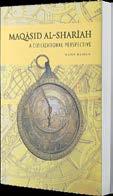
Maqasid Al-Shari‘ah: A Civilizational Perspective
Mazen Hashem 2024. Pp. 240. HB. $30.95. PB. $20.95
The International Institute of Islamic Thought, Washington, D.C.
The previous decade’s many books on maqasid al-Shari‘ah (aims of the Shariah), stressed that Islam’s commands have overarching goals and that the Quranic and Hadith texts can only be understood within Islam’s universal principles. The work of Shatibi (d.1388) gained the greatest authority due to his theorization of the Shariah’s five general aims, which can take one of three levels of priority. Most subsequent works have been variations of his approach.
This book’s major contribution is to marry Ibn Khaldun’s and Shatibi’s perspectives to construct a new maqasid theory, one marked by a high degree of synthesis and redefining and expanding of Shatibi’s major categories. Moreover, the new enhanced theory enables the Shariah’s five goals to operate in an open space and make the maqasid more amenable for modernity.
Mona
Abul Fadl
2024. Pp. 107. HB $22.00. PB $12.95
The International Institute of Islamic Thought, Washington, D.C.

As a system of thought purporting to be enlightened and universal, modernity has engendered a crisis of values and a secular perspective that has provoked universal existential angst and moral anarchy. AbulFadl’s reading of the Quranic view of humanity as insan critiques society’s rapid devolution due to replacing spiritual traditions with rationality, freedom, and morality and envisages reintegrating humanity and recovering community by reconciling self and rediscovering the essential meaning of divine guidance insofar as it relates to human life.
Taking the Quran as a divine discourse, this work takes aspects of the creation discourse and uses them as a pivot for developing a view of a moral humanity and a moral community, while focusing on the former. Its two-part main message is that urgency and opportunity lie with humanity, whereas relevance shines through God’s eternal message.

Hossam Sabry Othman
2024. Pp. 272. HB $30.95. PB $20.95
The International Institute of Islamic Thought, Washington, D.C.
The contemporary world continues to pose ethical, financial, and medical dilemmas for modern jurists. One result of this daunting reality is chaos in fatwa issuance. Many scholars are calling for regulating this
process. This book urges applying a synthesized approach based on collective ijtihad.
Othman argues that fatwas become questionable when jurists lack the relevant knowledge or submit to financial and/ or political pressure. Another issue is “fatwa shopping” online. The author calls for reassessing such realities, contending that in the interests of a healthy functioning society, the wider modern context, specialist knowledge, and cultural diversity must be taken into account when formulating a fatwa.
Shenila Khoja Moolji
2024. Pp. 116. PB. $10.00
University of Minnesota Press, Minneapolis
Khoja-Moolji argues that constructing Muslim boys as proto-terrorists is integral to the story of American racial capitalism.
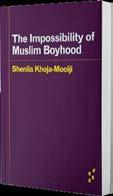
What does it mean when a five-year-old Muslim boy arriving at Dulles airport is preemptively detained as a “threat”? To answer that question, Khoja-Moolji argues that Muslim boyhood has become a threat within an ideology that seeks to predict future terrorism. Muslim boyhood bridges actual past terrorism and possible future events, justifying preemptive enclosure, surveillance, and punishment.
Even in the occasional reframing of individual Muslim boys as innocent, Khoja-Moolji identifies a pattern of commodity antiracism through which elites buy public goodwill but leave intact the collective anti-Muslim notion that fuels an expanding carceral and security state. Using the book as a heuristic device, she also discusses Hindutva ideology in India to show how Muslim boyhood may be resituated in global contexts.
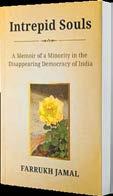
Farrukh Jamal
2023. Pp. 188. PB. $7.64
Austin Macauley, New York
“ Intrepid Souls” recounts the story of Indian minorities’ struggle for equal rights, humane treatment, and survival. The Hindu majority’s intense hatred, projected especially toward Muslims, is often supported by those in charge of maintaining law and order. Jamal explains how Hindutva will eventually lead to instability and insecurity: A nation must support its minorities and, in turn, they must support the nation for its survival.
This is not the India in which Jamal grew up or her ancestors lived. They loved this land and worked hard to make it a wonderful place, as the Muslim minority of today is doing. However, their inherited sense of belonging is now being deliberately obliterated.
She grew up facing discrimination and fearing unprovoked riots and violence. Wars with Pakistan also jeopardized Muslim lives because they were perceived as enemies. What protected her was her parents’ profound love, emphasis on education, the kind and impartial treatment of her school’s nuns, and the support of friends regardless of religion. ih
